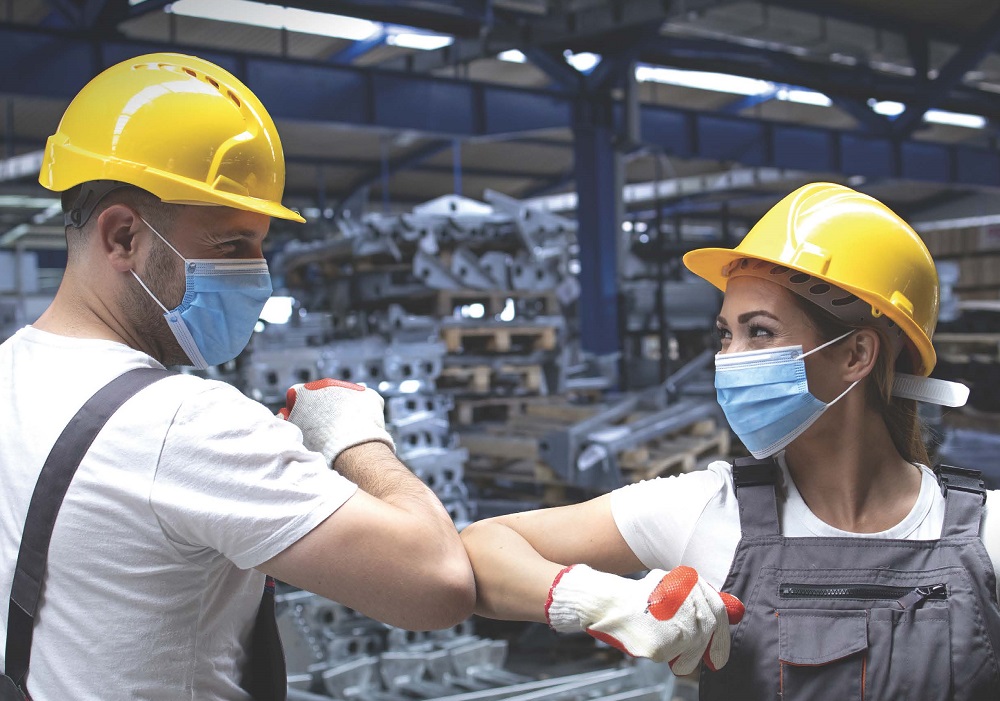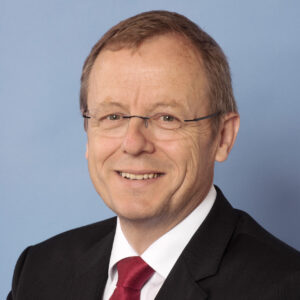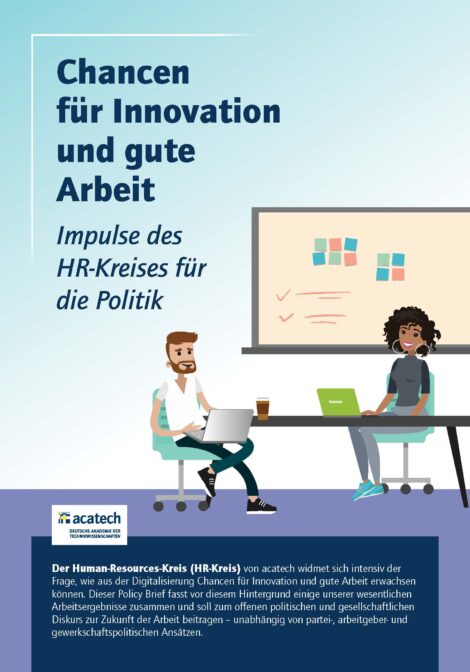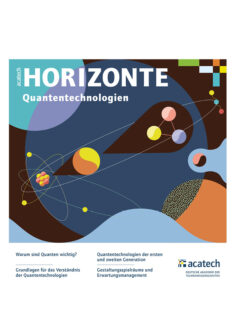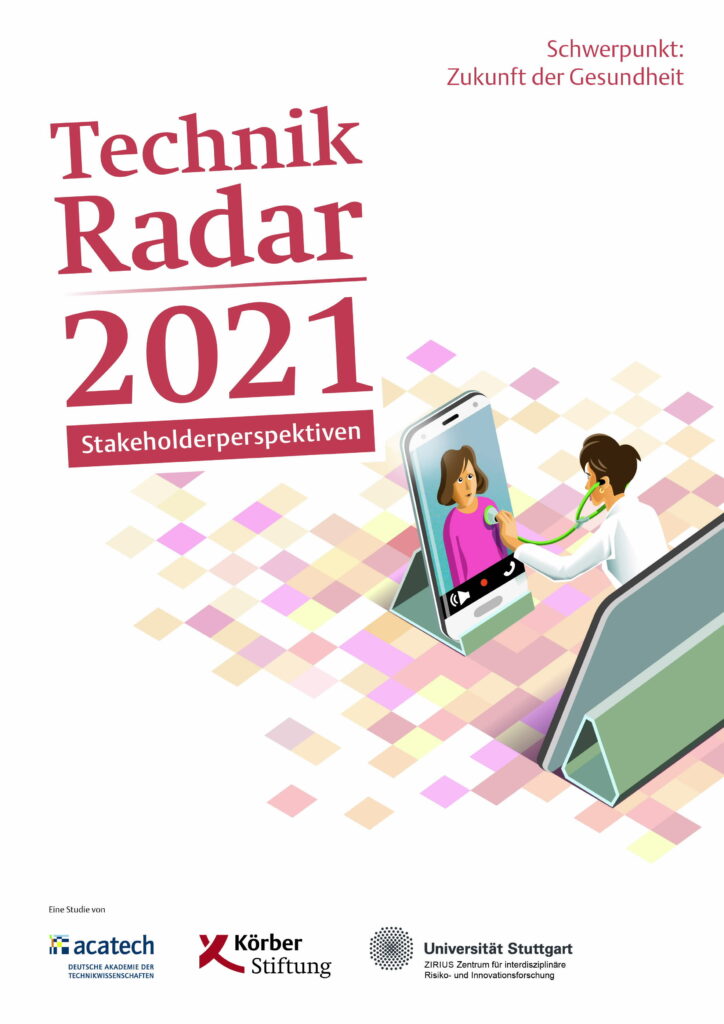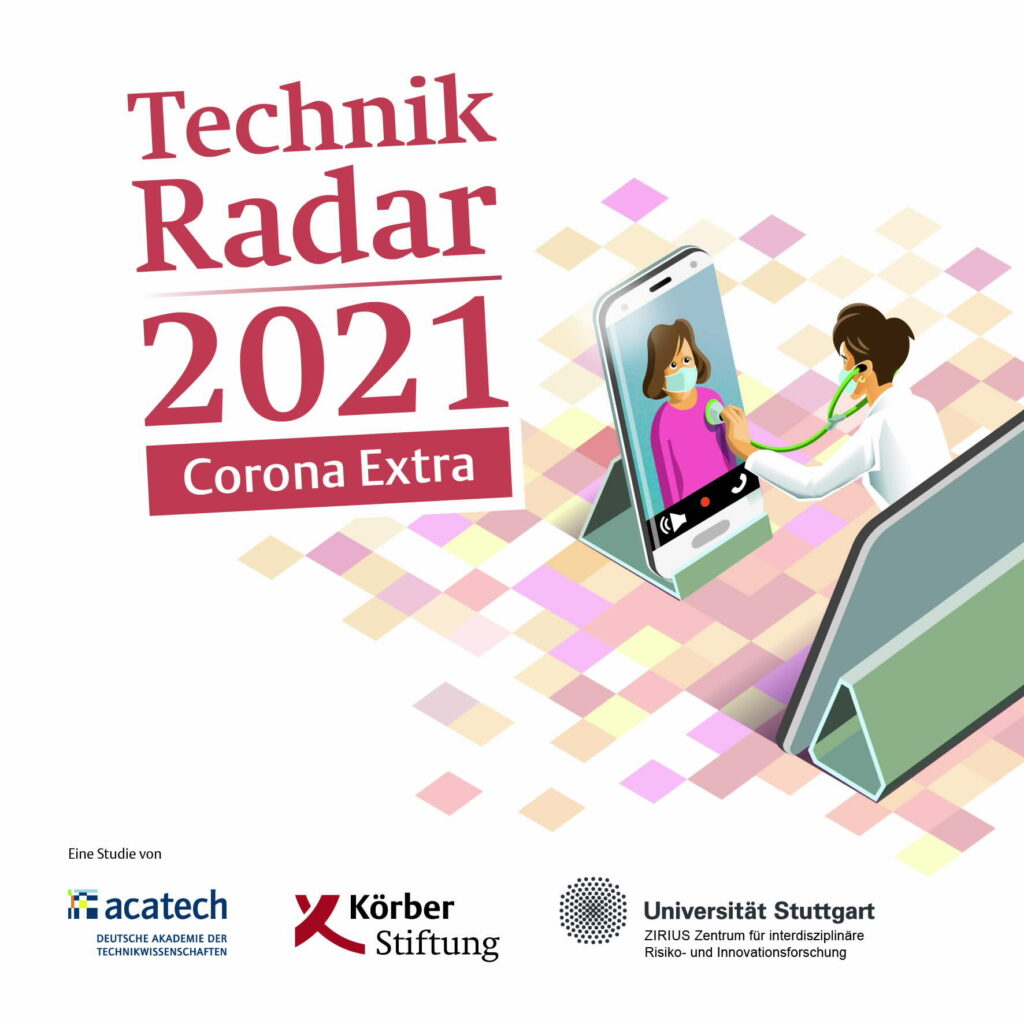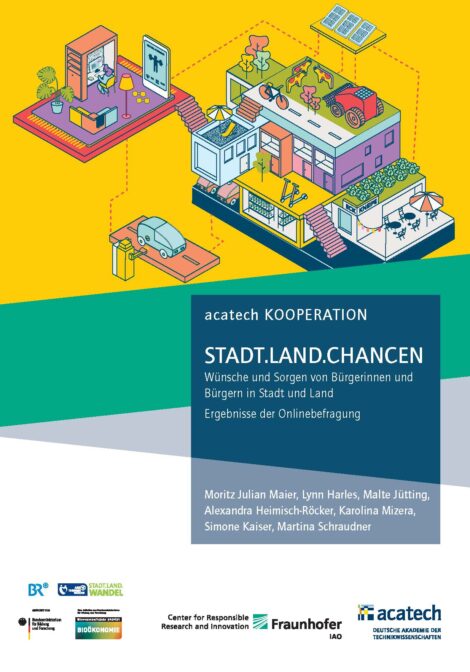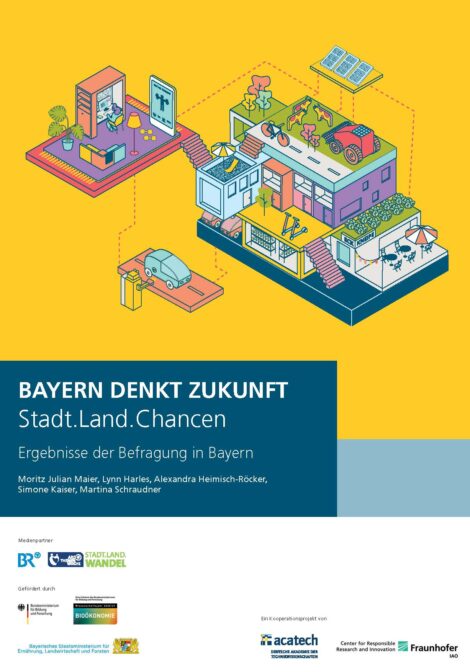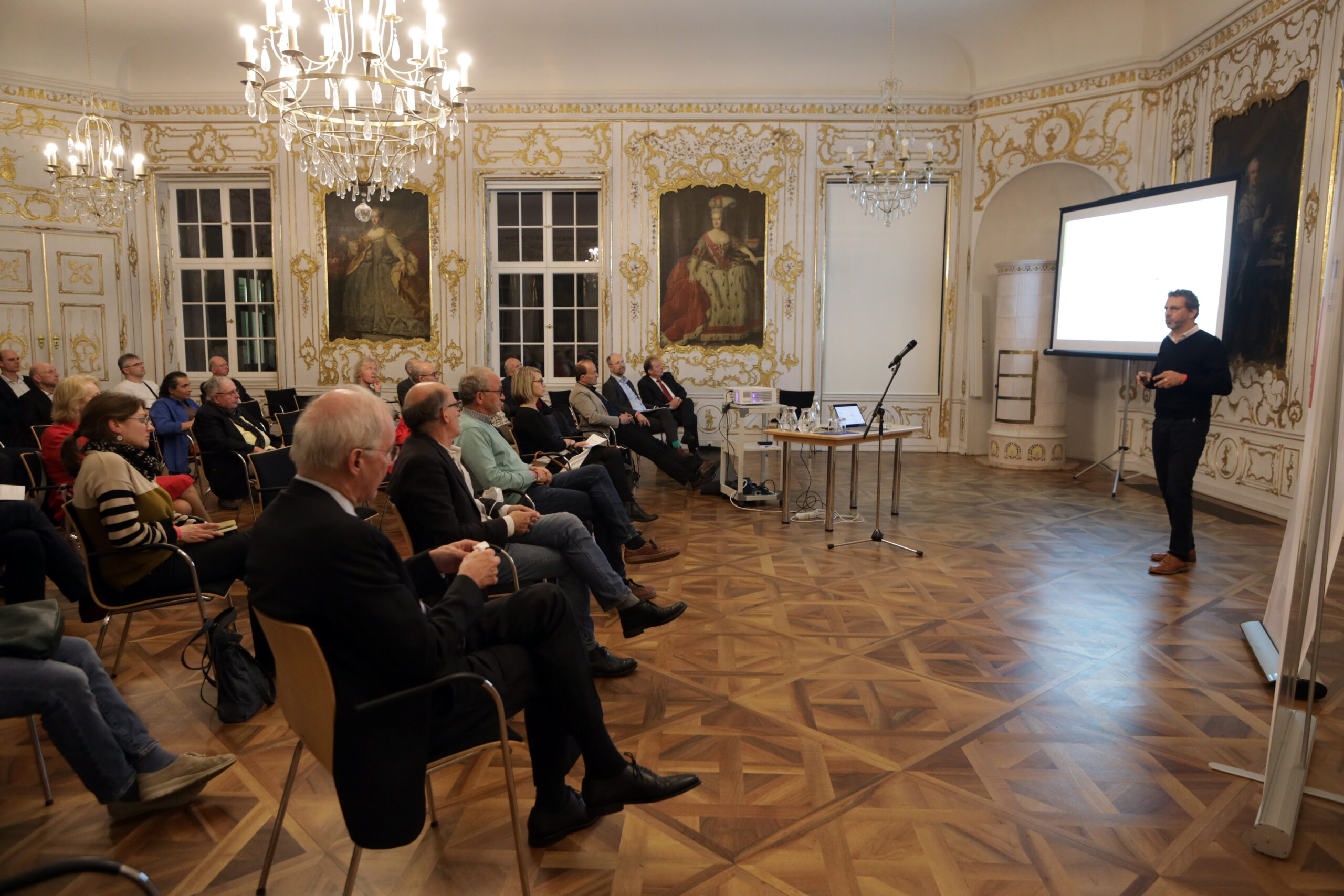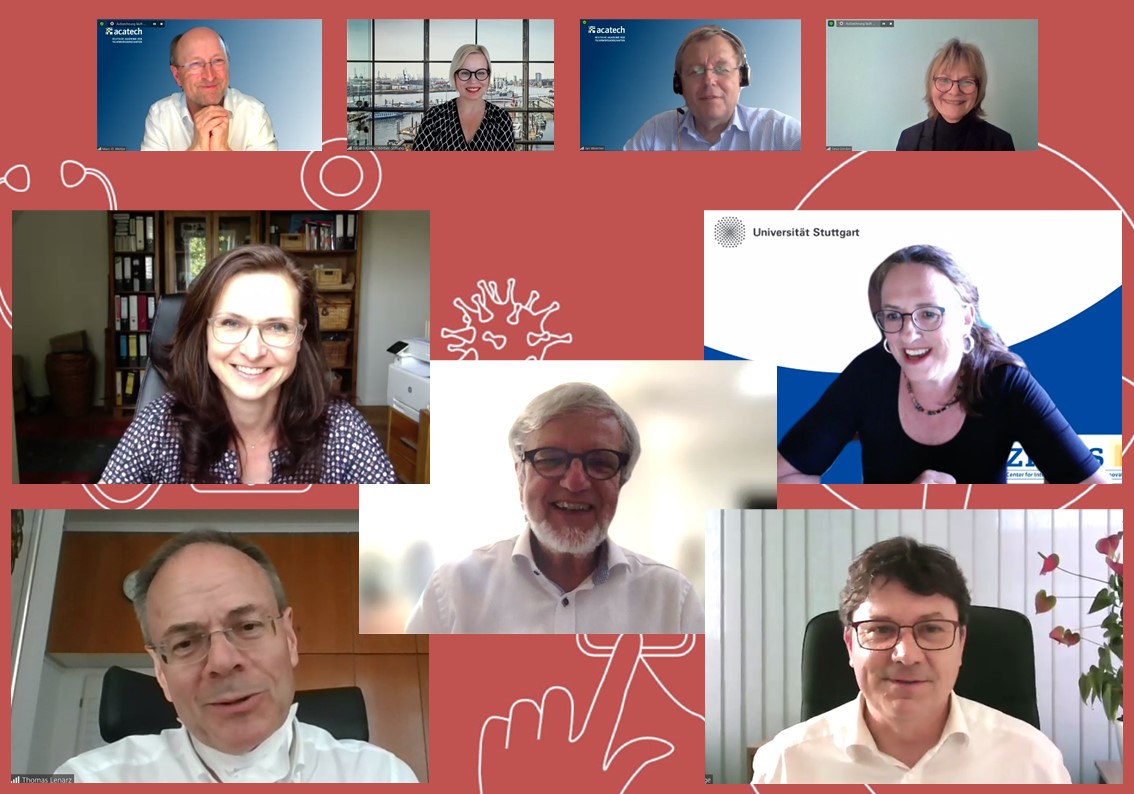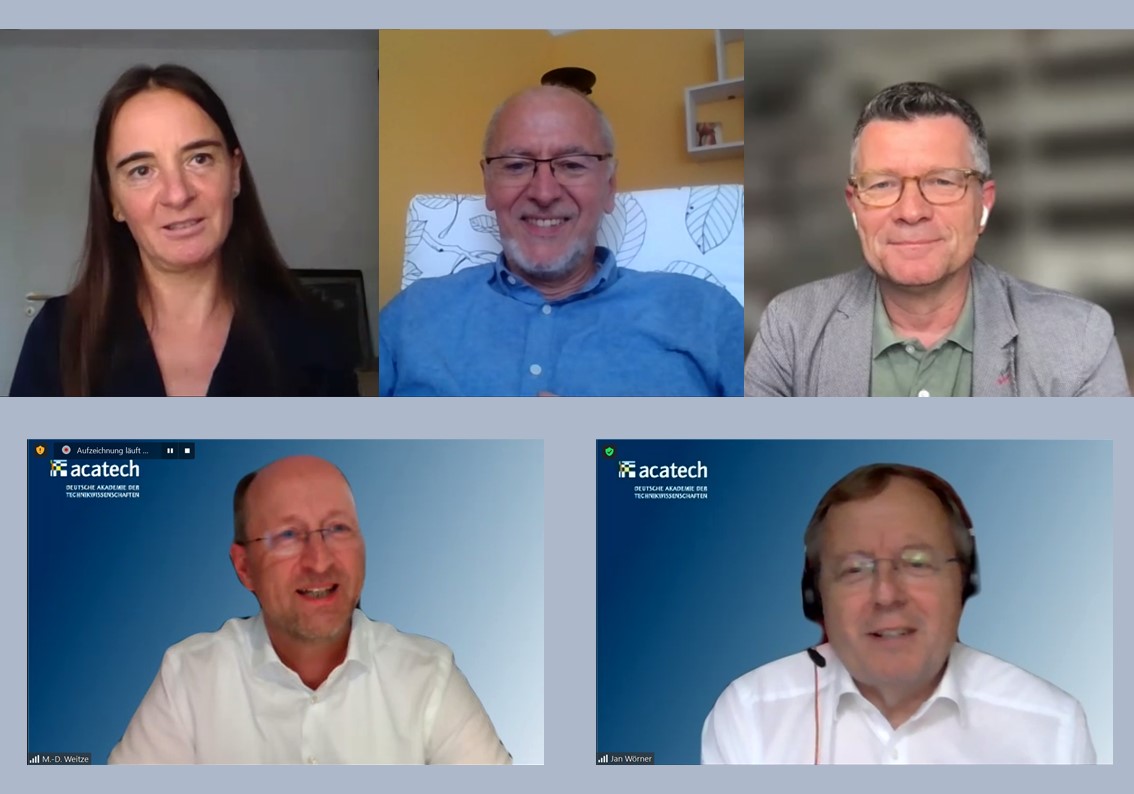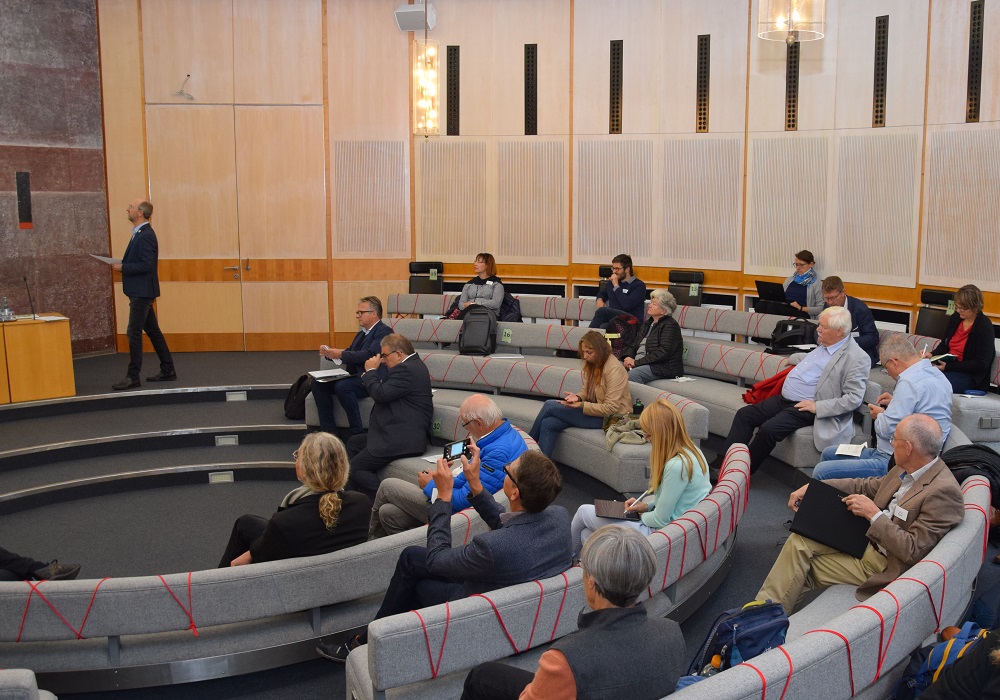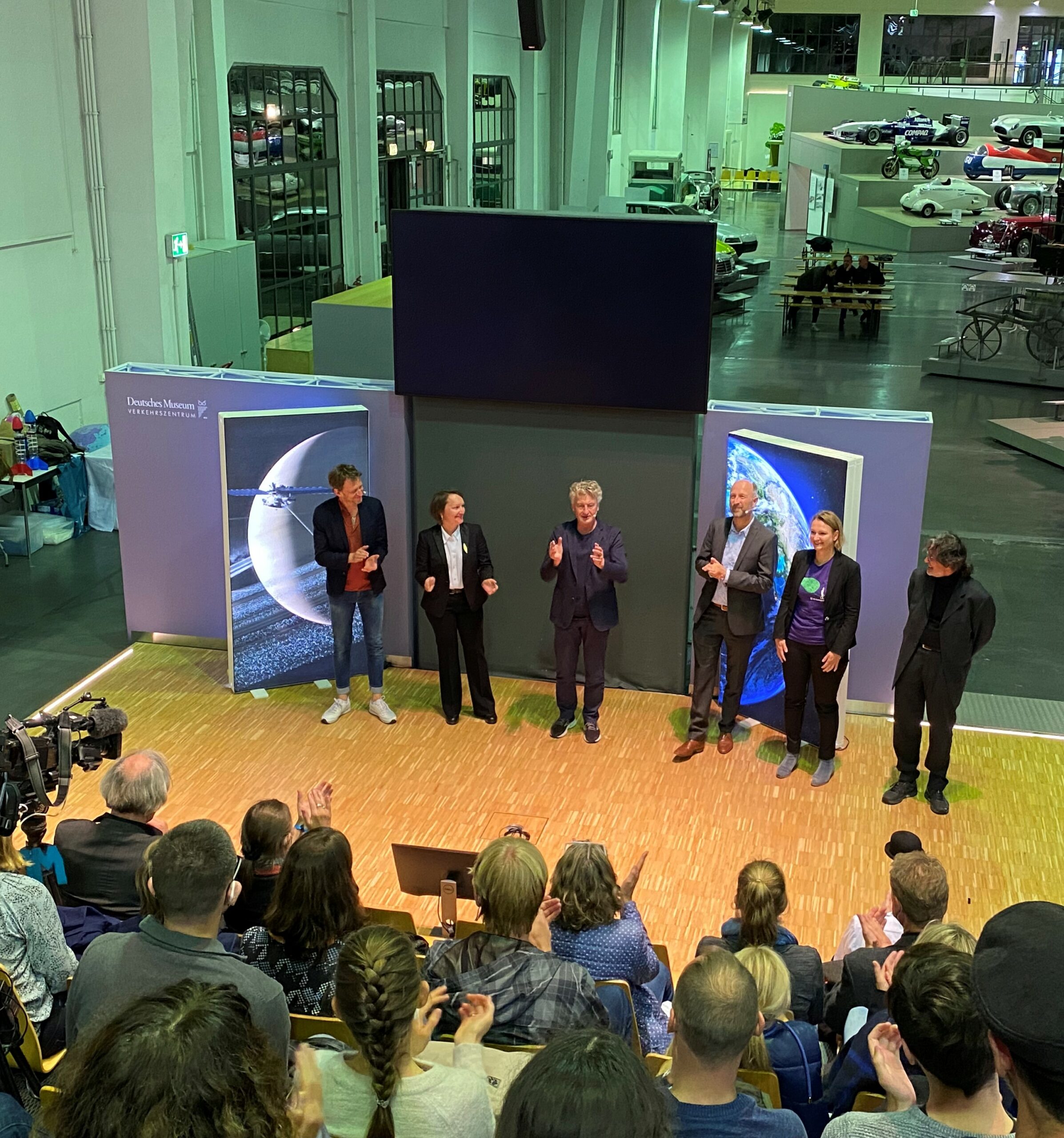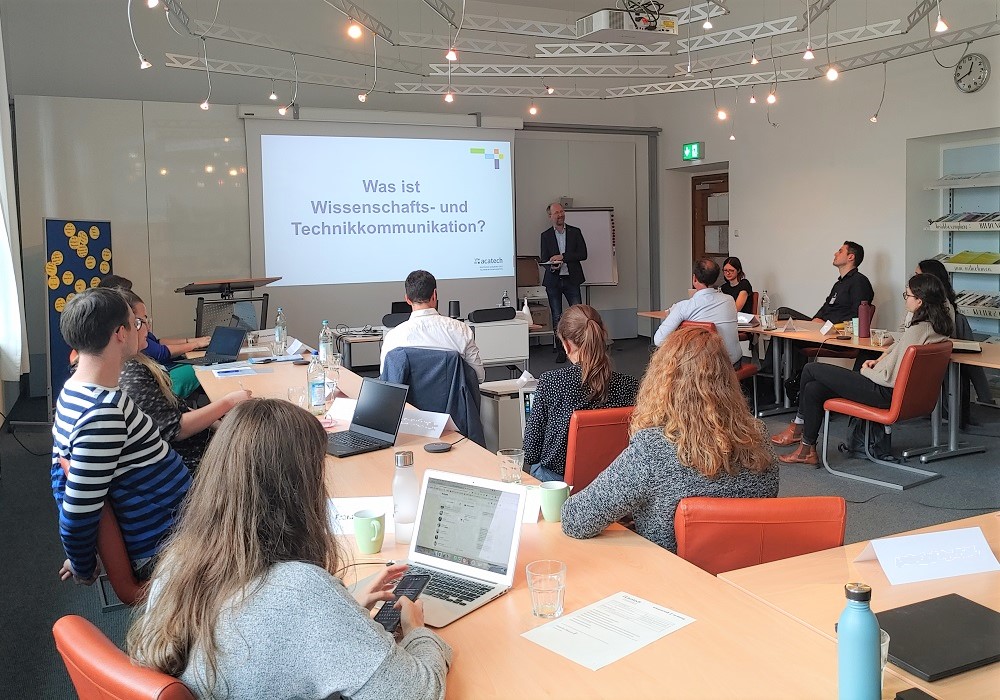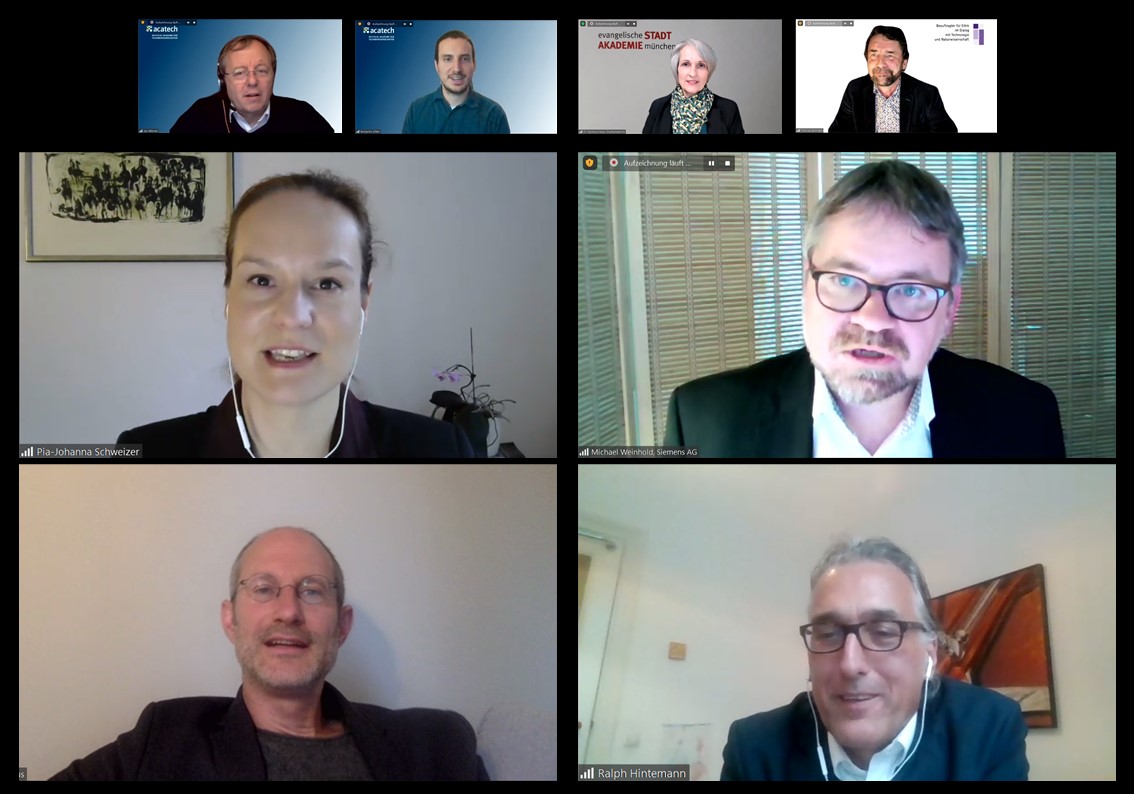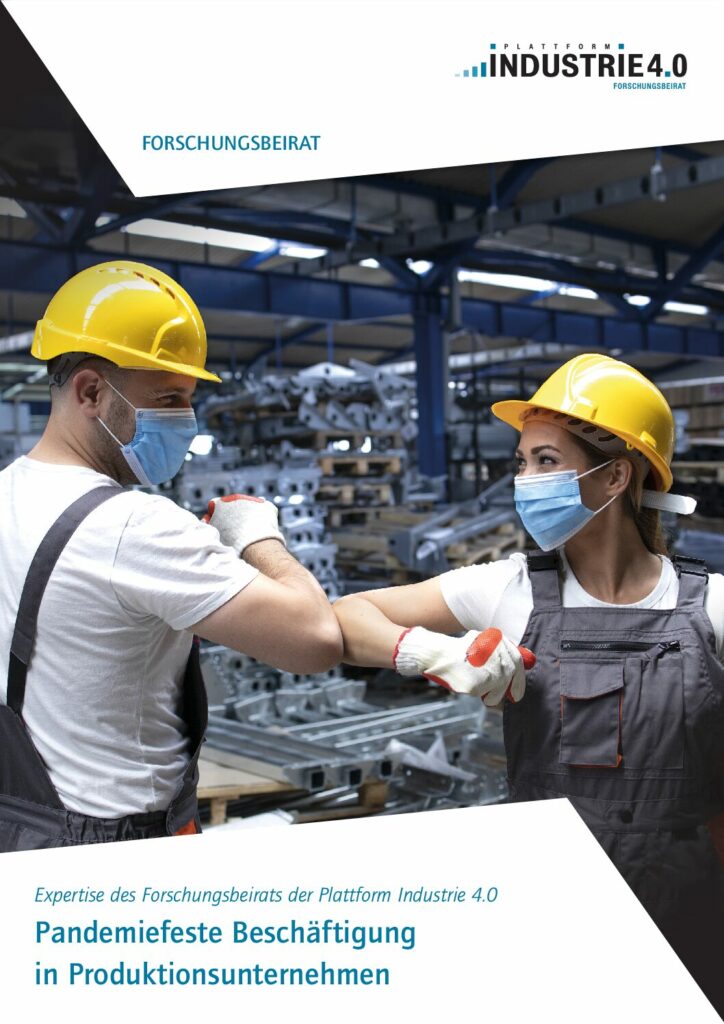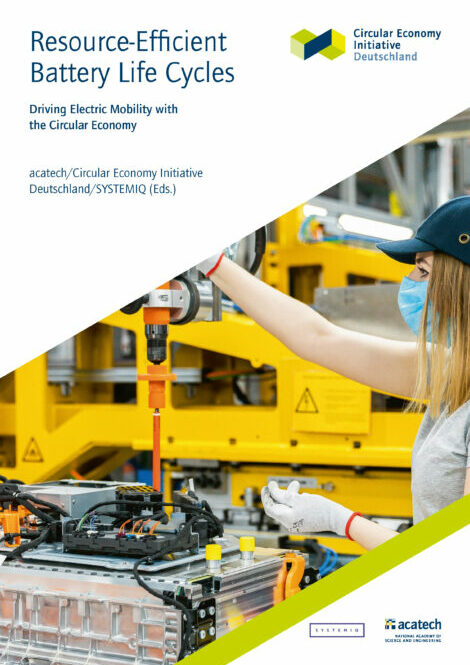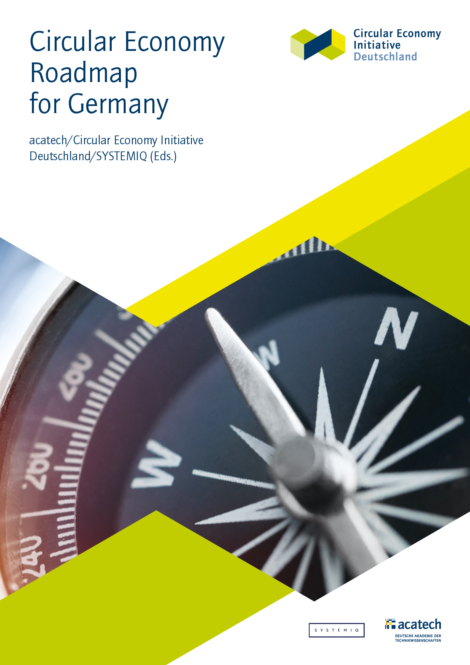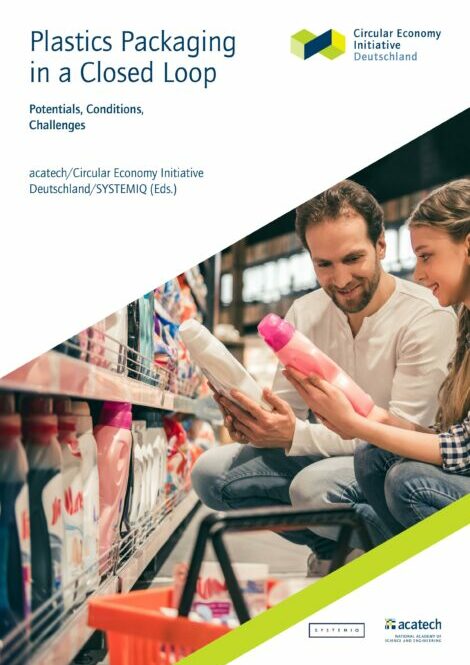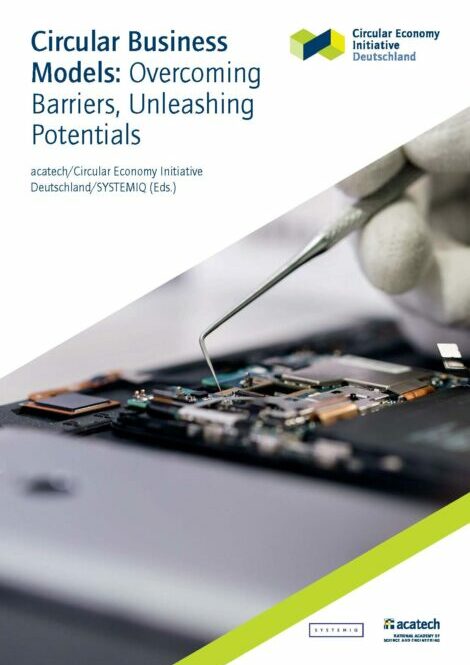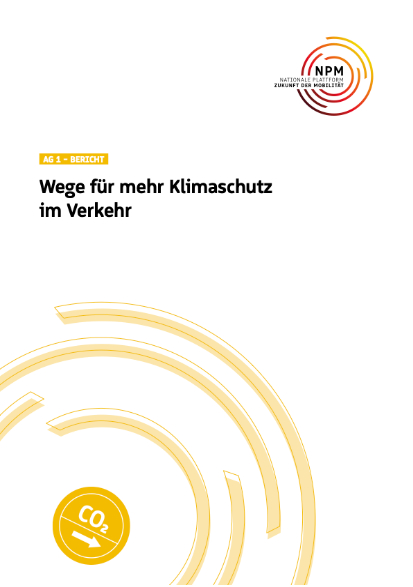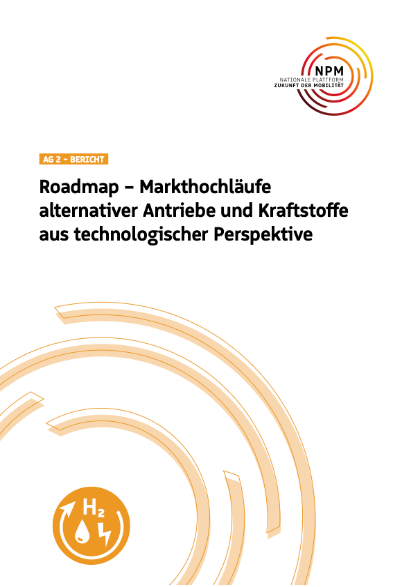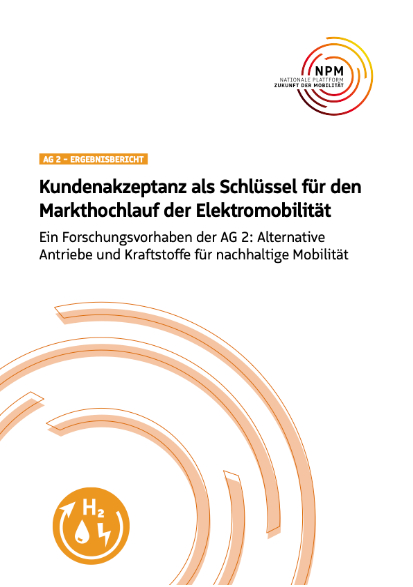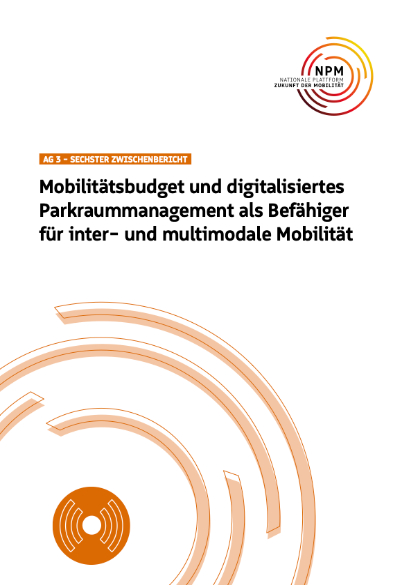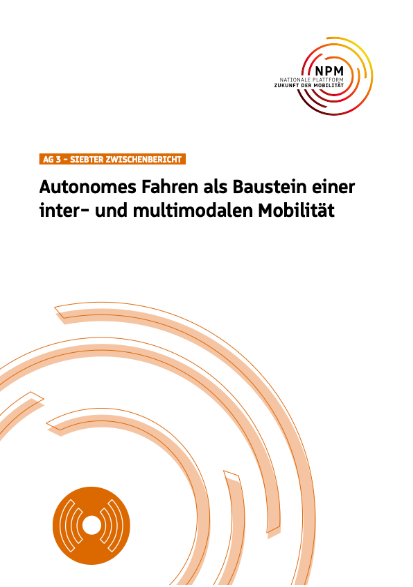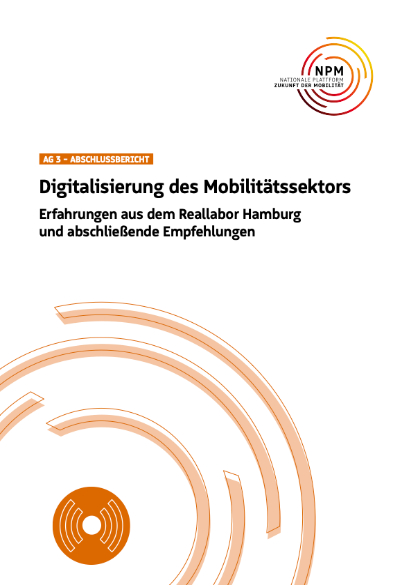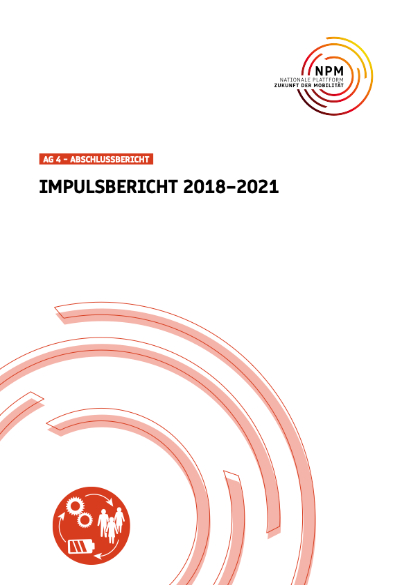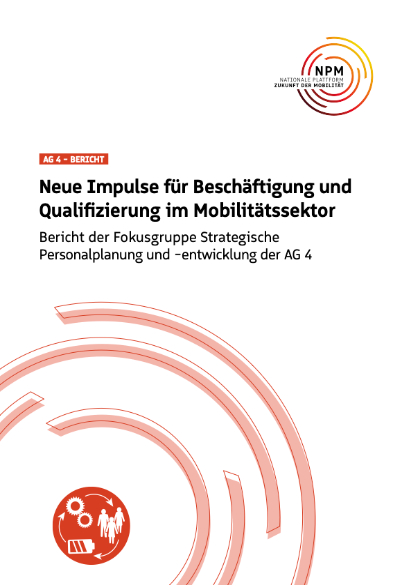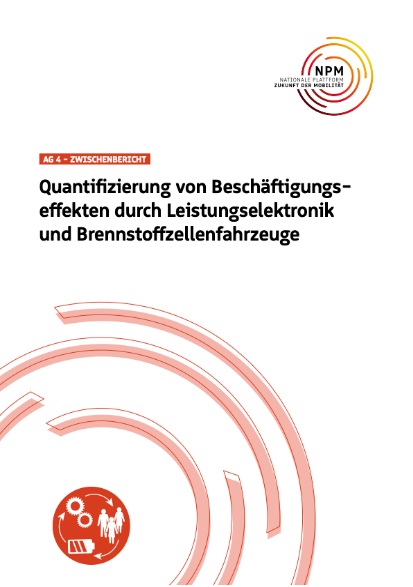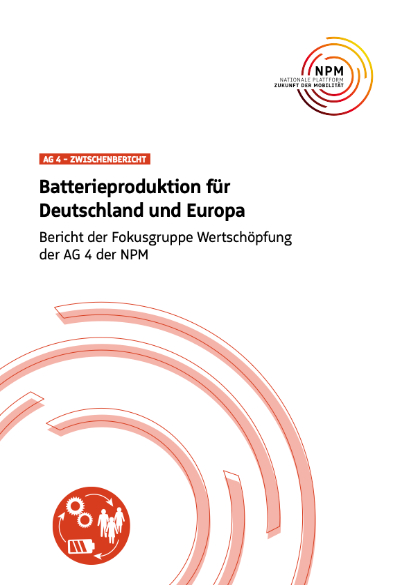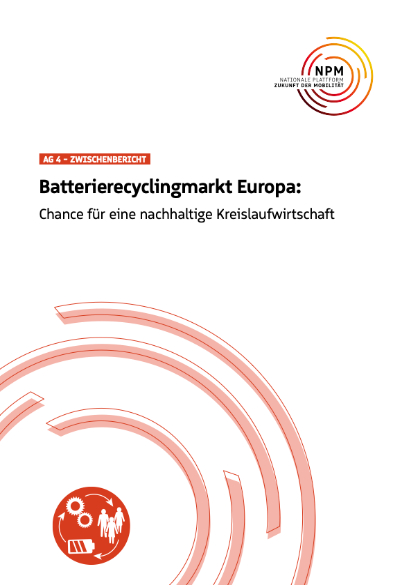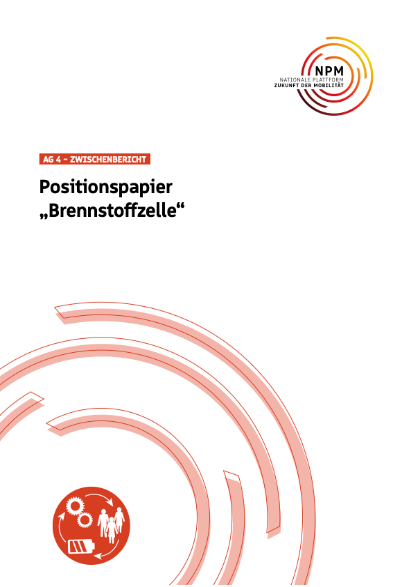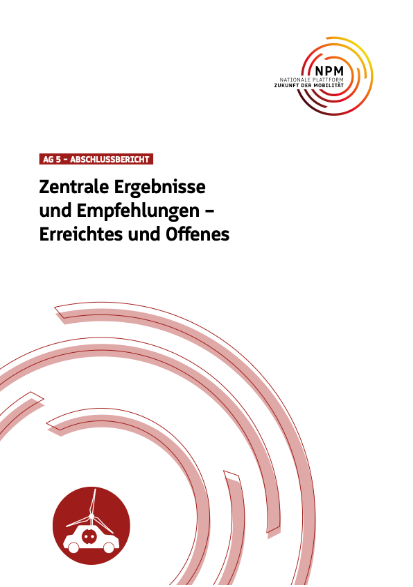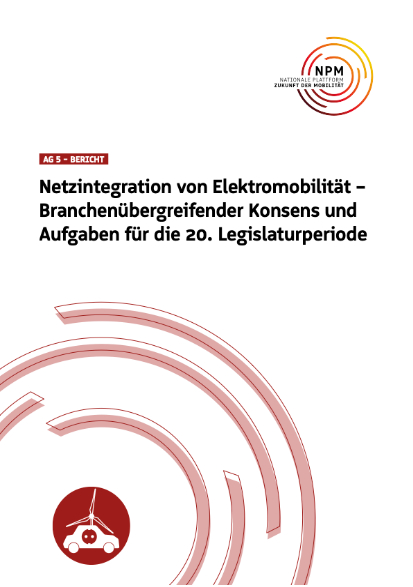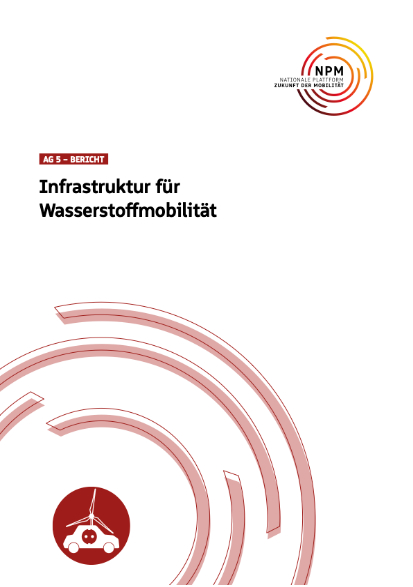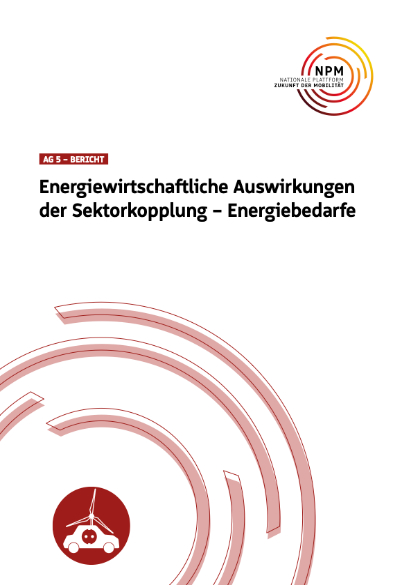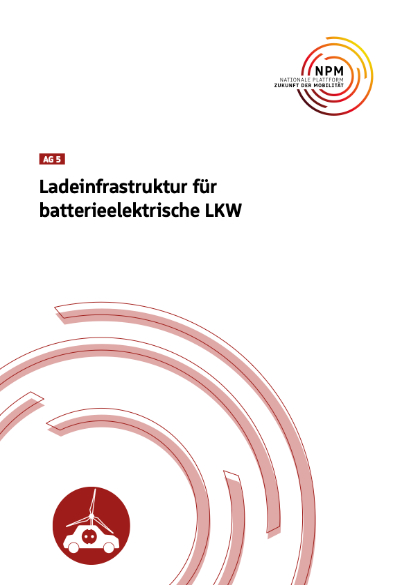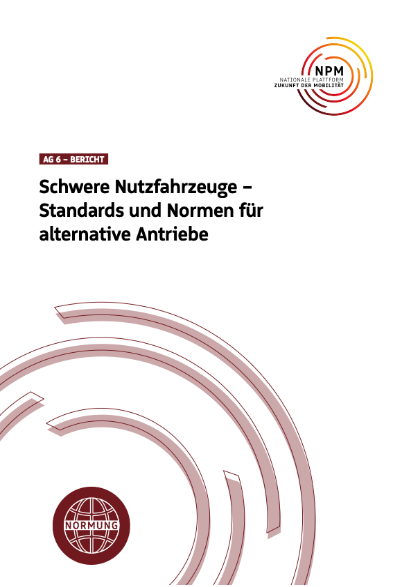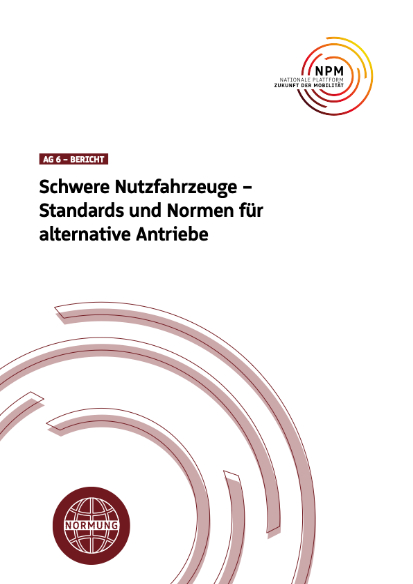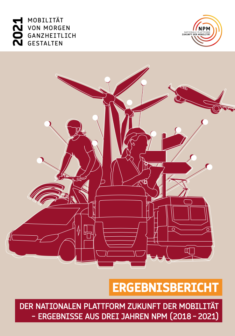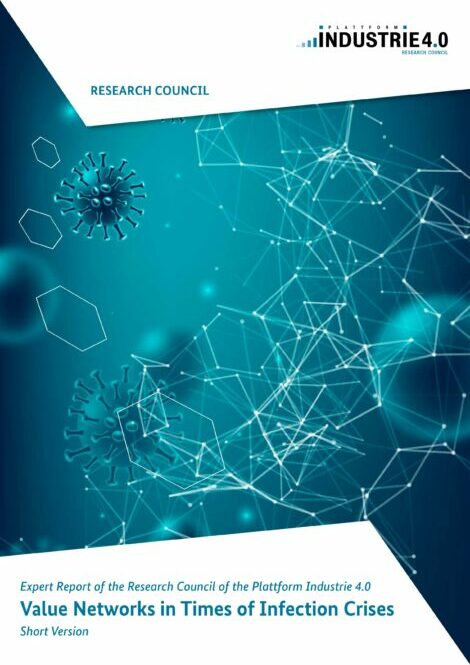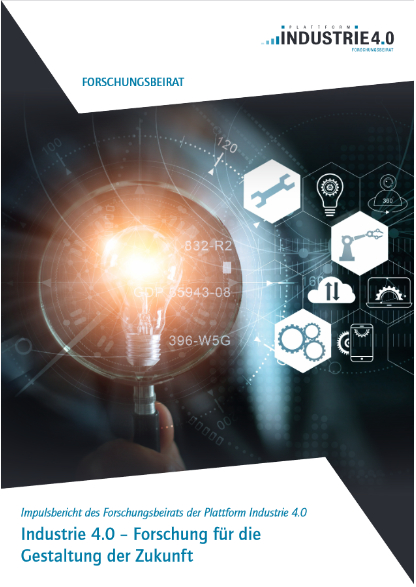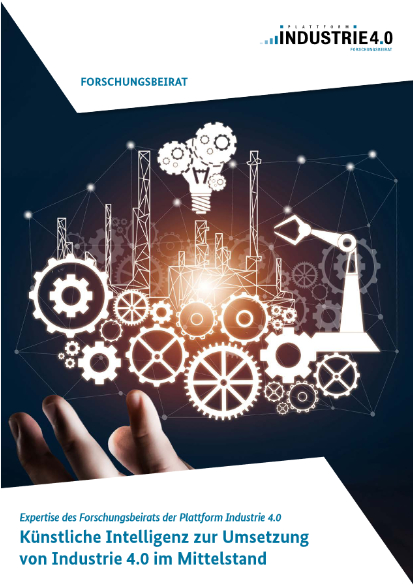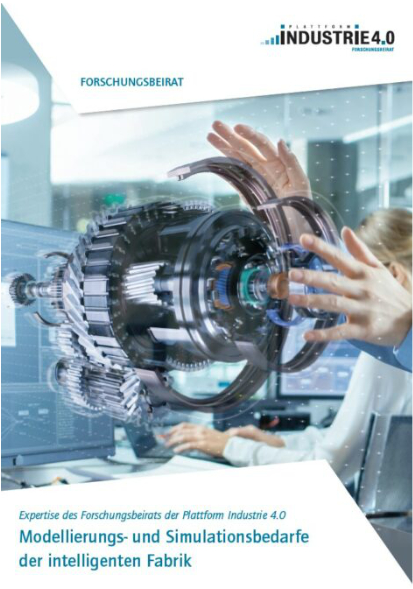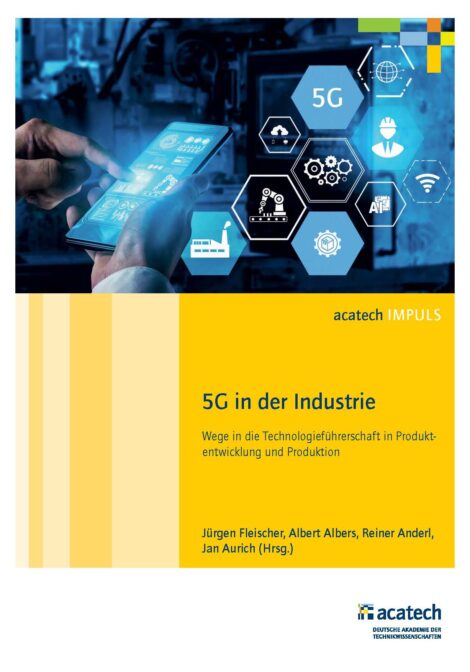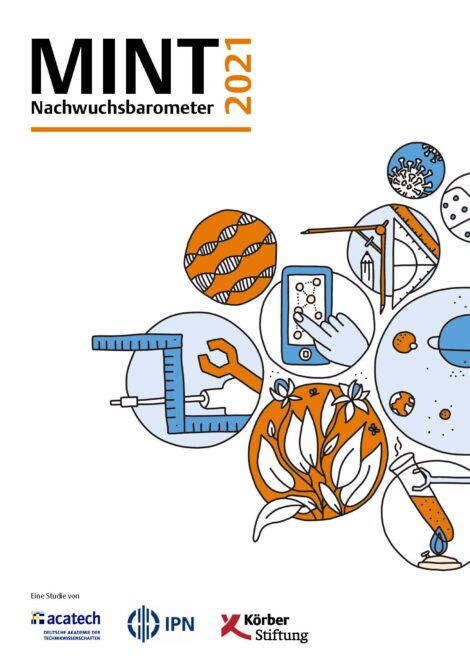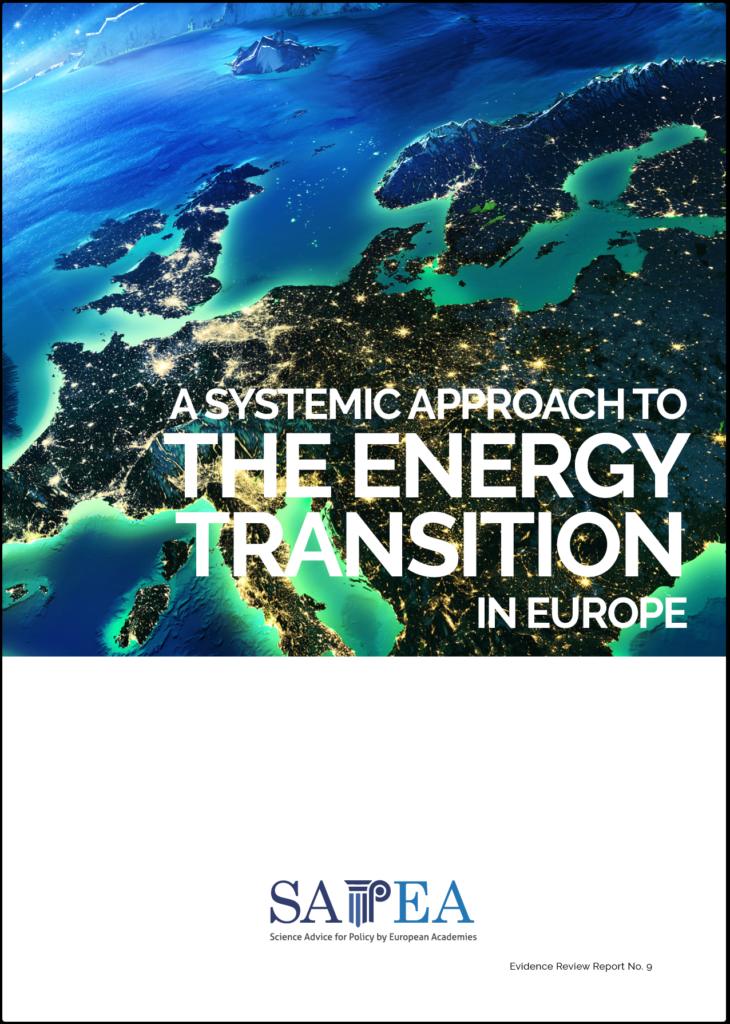The future rarely unfolds as expected. It is now over two years since the coronavirus pandemic transformed our lives in a way nobody had foreseen. And now we find ourselves looking back on 2021 through the lens of Putin’s invasion of Ukraine, another development that few of us saw coming. Nevertheless, we must keep working for a better future for people and the environment, and this is exactly what acatech and the many experts who contribute to our work are doing.
Germany and Europe must find a successful path towards a sustainable, resilient society that maintains social cohesion and provides educational opportunities for all. And this path must also be good for the rest of the global community. These goals are outlined in a paper on innovation policy beyond 2021 (“Innovationspolitik 2021+”) published shortly after the German elections. You can find out more about our contributions to the German election campaign, our events for policymakers and of course the innovation policy advice we provide to the Federal Government in the chapter on Dialogue with Policymakers.

The second key part of acatech’s mission is to advise and engage in a dialogue with the general public on new technologies. Our TechnikRadar survey investigates how people view and rate the benefits of new technologies, while the acatech HORIZONS series clearly explains the potential applications and implementations of new technology fields. In 2021, we also presented a series of scenarios for the future of urban and rural life in cooperation with ARD and the Fraunhofer Society. Meanwhile, over 5,500 people engaged in a direct dialogue with us at our “acatech am Dienstag” (acatech on Tuesday) events. These aspects of our work are outlined in the chapter on Society and Technology.
As the second year of the coronavirus pandemic unfolded, we looked at various different ways of increasing our resilience to future crises. For example, we showed how the technological sciences can help to build a more resilient healthcare system. More generally, it is important to establish resilience as an economic and innovation policy goal.
The Energy Systems of the Future (ESYS) project investigated the architecture of a stable, affordable and climate-friendly energy supply, taking an in-depth look at the technological requirements and addressing the issues from a long-term perspective. Growth can be decoupled from emissions if we establish a circular economy based on closed-loop value chains. Our contributions to this topic in 2021 are described in the chapter on the “Energy transition and circular economy”.
One of the challenges facing the mobility of the future is to avoid harming the climate and environment. Coordinated by acatech, the National Platform Future of Mobility has formulated a series of proposals for tackling this challenge that are supported by all the project partners. Federal Minister Andreas Scheuer described it as a mammoth task, but added that the NPM has delivered. One particularly important milestone for acatech and for digital connectivity in the mobility sector was the establishment of the Mobility Data Space, a cross-sectoral alliance of strong and innovative partners who have agreed on a common mobility data standard.
Digital sovereignty was both a strategic goal and a focus of the Academy’s work in 2021. We developed an eight-layer model that enables a detailed analysis of strengths, weaknesses and practical policy options in this field. Co-chaired by acatech and the BMBF, the Plattform Lernende Systeme is an AI platform that strengthens and connects researchers and practitioners and communicates the societal benefits of AI. The Gaia-X initiative is committed to developing an open and transparent data infrastructure in Europe – and acatech is responsible for coordinating the initiative’s German hub. Through its involvement in the Gaia-X hub and the establishment of the Mobility Data Space, acatech has gone beyond simply providing advice on technology questions by actively promoting cooperation in the pursuit of digital sovereignty. We hope that further data spaces in other areas will follow.
A successful digital transformation is key to sustainable industrial value creation, which will in turn be our most important competitive advantage in the next phase of the digital revolution. It was acatech that developed the concept of “Industrie 4.0”, a term that refers to real-time digital connectivity in industrial value-added processes. Coordinated by the Academy, the Research Council of the Plattform Industrie 4.0 published a series of reports in 2021 on topics such as how to ensure that jobs can withstand pandemics and how to help small and medium-sized enterprises transition successfully to Industrie 4.0. The platform also summarised its recommendations for policymakers in the shape of a 5-point plan. Industrie 4.0 is constantly developing, and in 2021 acatech published a report outlining the huge importance of 5G technology for this sector.
The Work and Education chapter looks at the socioeconomic aspects of the digital transformation. In 2021, the HR directors and academics involved in our HR Working Group formulated seven proposals for ensuring good working conditions and enabling creative and productive work. Further recommendations were published in a policy brief on opportunities for innovation and good jobs. STEM education is key to achieving these goals. If we wish to be an innovative society, we need to make careers in the natural sciences and engineering as attractive as possible and ensure a high level of interest and trust in new technologies and enthusiasm for using and shaping them among the general public. These issues are investigated by our Barometer of Young Talents in the STEM subjects.
International cooperation has never been more important than in these turbulent times, which is why we devote a separate chapter to the theme of European and global cooperation. Through our European and global partnerships, we are helping to strengthen international cooperation in innovation and the technological sciences. Can the Putin regime’s reckless invasion of Ukraine be allowed to overshadow strategic questions about the shape of technological change, solutions to global challenges like climate change and our society’s ability to retain its sovereignty while still cooperating with the international community?
Far from it – in fact, it makes these questions even more pressing. For instance, it is now even more urgent for us to minimise our energy system’s reliance on fossil fuel imports as well as to reduce its emissions. Strategic sovereignty issues are also coming to the fore once more. Dependence on individual countries in critical areas poses not just a narrow but a widespread threat to national and international security and cooperation.
This is by no means to suggest that autarky is the answer. On the contrary, Germany, the EU and the international community must strengthen international cooperation between equal partners. Humanity must not be driven back to the bloc mentality and conflicts of the 20th century. Global challenges such as the protection of our climate and environment can only be overcome by working together.
It is in this spirit that we look to the future and seek to continue the dedicated work of our Members, Senate, working groups, staff and former Presidents Karl-Heinz Streibich and Dieter Spath, whose leadership of acatech during 2021 was both far-sighted and hands-on. We look forward to working with you all to ensure that the technological sciences make the best possible contribution to a better future, and we hope you enjoy reading our annual report.
Kind regards,
The acatech Management Board




Manfred
Rauhmeier

Publications 2021
Publications 2021
Events 2021
Events 2021
Policy advice during the German election campaign
Sending out a signal: proposals for innovation policy 2021+
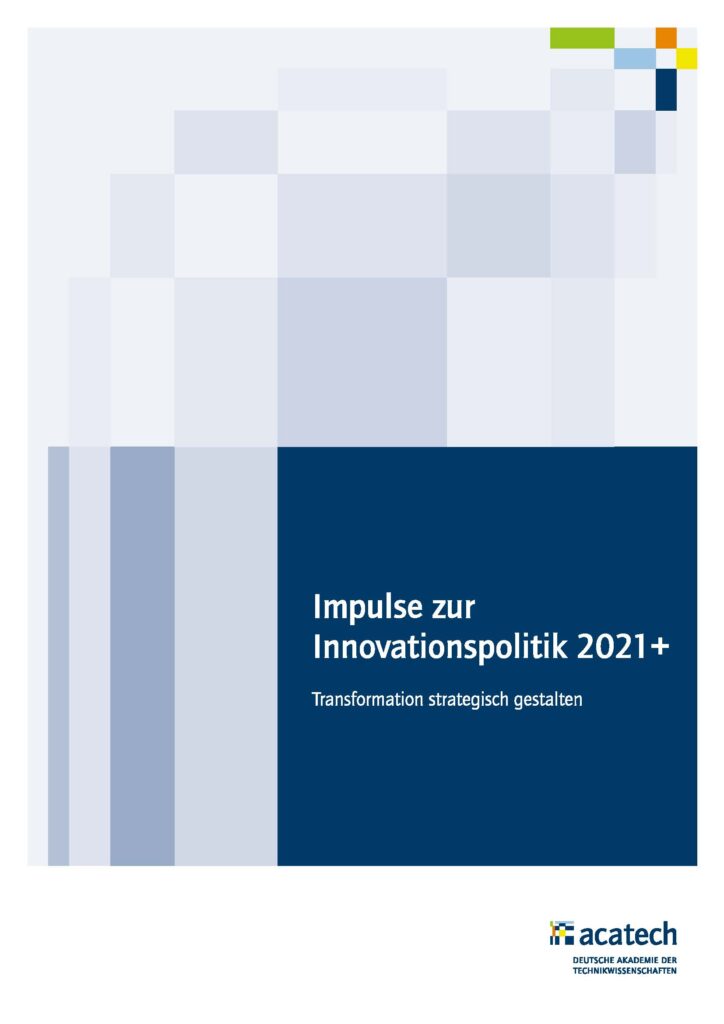
acatech adopted a neutral, nonpartisan position during the 2021 German election campaign. However, the Academy did speak out as the voice of the technological sciences and champion of innovation in Germany. Regardless of which parties won and of the make-up of the new coalition government, acatech argued that the incoming administration should send out a strong signal for the next few years. The publication “Impulse zur Innovationspolitik 2021+”* briefly sets out four priority innovation policy areas, discusses the relevant technological enablers and proposes a series of policy options.
Innovation policy should be a priority for policymakers. Government must support innovation through an even stronger cross-departmental strategy.
Karl-Heinz Streibich, acatech President
Four priority areas for innovation policy in the next few years.
- Effective climate and environmental protection cannot be achieved without a fundamental change in the way that natural resources are used. This will require a major programme of innovation and investment. The key pillars are clear economic incentives and the promotion of sustainable innovations and circular business models.
- Digital sovereignty: The new Federal Government should drive the development of concrete digital sovereignty strategies for Germany and the EU. To this end, it should systematically analyse the strengths and weaknesses of European value networks and critical infrastructure. To support the formulation of these strategies, acatech has developed an extended technology layer model that reflects the growing importance of digital ecosystems.
- Mobility: The transition to sustainable mobility must be accelerated. This will call for an integrated strategy combining several elements, from the promotion of alternative fuel vehicles and of public transport, cycling and walking to the digital transformation of mobility. It will be vital to ensure that the resulting structural and employment changes are managed in a socially acceptable manner.
- Healthcare and life sciences: A paradigm shift in healthcare is needed to create a system that harnesses the potential of modern medicine to keep people healthy. This will call for efficiency improvements, a process-oriented approach and a shift from experience-based to science-based medicine. The widespread digitalisation and utilisation of health data coupled with the use of biotechnological innovations will be key to achieving this.
Making the energy transition happen
The next four years will also be a particularly critical time for the energy transition. Germany must get on the right track during the term of the new parliament if it wishes to meet its climate targets and remain competitive. In a discussion paper that asks the question “If not now, then when?”, experts from the Energy Systems of the Future (ESYS) project describe the outcomes that must be delivered by a reboot of the energy transition. The good news is that Germany can achieve its targets if they are centrally managed and aligned with the overall goal, and there is still a chance to make this happen during the new parliament. But if it is left any longer, the cost of the transition to climate neutrality will be significantly higher, and the final outcome uncertain. The ESYS experts outline eleven priority action areas where Germany can drive the energy transition both nationally and internationally.
Effective and efficient climate action can only be achieved through an integrated energy and climate policy that leaves room for innovative solutions and takes different social realities into account.
Dirk Uwe Sauer (RWTH Aachen University), Chairman of the ESYS Board of Directors
11 priority action areas for a successful energy transition (© Illustration by Ellery Studio)
Opportunities for innovation and good jobs
The coronavirus crisis has led to unexpected changes and accelerated certain trends in the world of work. Employees and organisations have had to adapt their work processes and activities with unprecedented speed. Wherever possible, people have had to switch to working from home, use digital tools and find a new work-life balance. Many of the predictions made by acatech’s HR Working Group came true sooner than expected as a result of the pandemic – and many of the changes are here to stay.
The HR Working Group has published a series of proposals for policymakers* with the aim of preserving the best of these changes and harnessing innovations in the workplace in order to promote prosperity and employment.
It is our fundamental conviction that employees themselves are the best people to say what their workplace should be like. They should be able to have their own, informed say in shaping the digital transformation, rather than simply being passive bystanders. Giving more responsibility to employees in this area will require a change of mindset among managers, employee representatives and lawmakers.
Excerpt from the HR Working Group’s proposals for policymakers
Government determines the framework for these changes in the workplace. The HR Working Group is calling directly on policymakers to take action in three priority areas:
- Support lifelong learning – future-oriented training improves employees’ career advancement and employment prospects and strengthens innovation in both the public and private sectors.
- Promote agility – more flexible regulations make it easier and faster for businesses to adapt. This is critical to their ability to compete successfully and enables flexibility, autonomy and creativity among employees.
- Ensure worker participation and innovation-focused co-determination. A modern social partnership can reconcile a company’s need for flexibility with the interests of its employees.
The Innovation Dialogues between the Federal Government, Industry and Science
Throughout the 19th German parliament, Former Federal Chancellor Angela Merkel, the Federal Minister of Finance, the Federal Minister for Economic Affairs, the Federal Minister of Education and Research and the Head of the Federal Chancellery met with representatives of science, industry and civil society during the twice-yearly Innovation Dialogues. The 17-member steering committee was headed by Chairman of the acatech Board of Trustees, Henning Kagermann. The Innovation Dialogues between the Federal Government, Industry and Science were organised by a project office at acatech which also supplied background documentation on the relevant topics, ensuring a common factual basis for the discussions.

© shutterstock/ David Jancik
In January 2021, the participants in the Innovation Dialogue discussed the resilience of supply chains and value networks*. The discussions focused mainly on the healthcare sector and automotive industry. Rapid digitalisation of the healthcare sector is vital to enable fast and secure sharing of sensitive medical data. To ensure the automotive industry’s long-term competitiveness, the ongoing structural changes in the sector should include measures to strengthen its resilience. One such measure would be the development of a battery and microelectronics manufacturing capability in Europe. Circular economy strategies such as battery recycling will also be key to retaining scarce resources within circular value models, thereby reducing reliance on critical imports.
The title of the final Innovation Dialogue with Chancellor Merkel, held in September 2021, was From the Promotion of Technology Seedbeds to Self-sustaining Ecosystems*. There is no shortage of technology “seedbeds” in Germany thanks to the country’s strength in basic research. However, the conditions for growth – i.e. the commercialisation of promising ideas and the scaling of business models – are less favourable. Consequently, innovation policy needs to complement foresight initiatives focused on longer-term questions with strategic initiatives focused on implementation. While innovation policy has a range of effective tools at its disposal, their deployment needs to be better coordinated through a cross-departmental strategy.
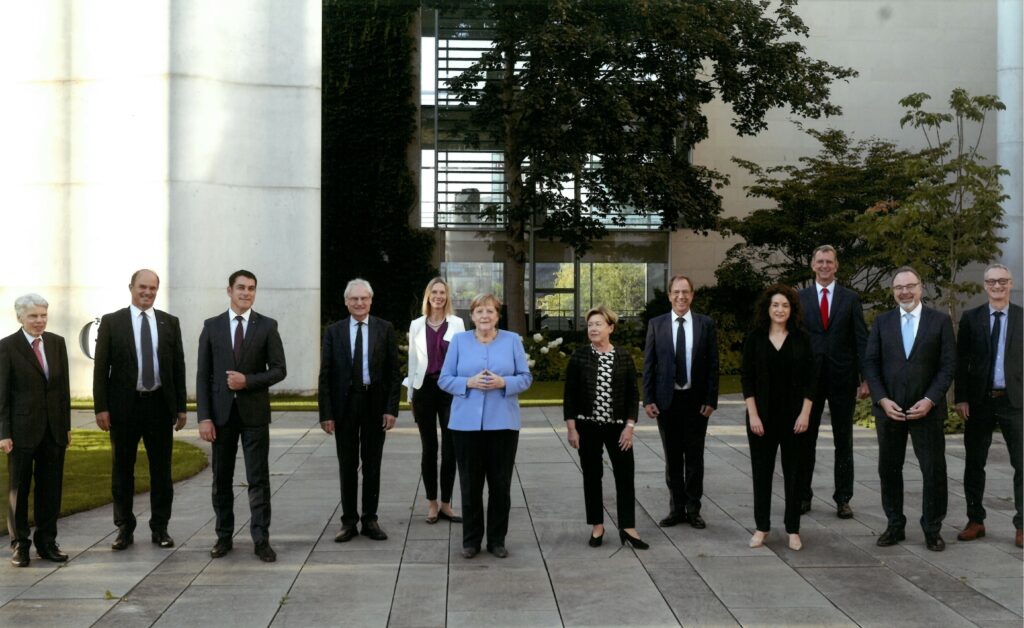
Federal Chancellor Angela Merkel with the members of the Innovation Dialogue of the 19th German Parliament (© Federal Government/Jochen Eckel)
Events for policymakers
Through its discussions with parliamentarians, acatech seeks to engage in a regular dialogue with central government and the Länder. Although it was not possible to hold face-to-face events in 2021 due to the coronavirus pandemic, the dialogue between the Academy and policymakers was maintained through online discussions.
The “acatech am Mittag” (Lunch with acatech) event in February discussed the Future of Quantum Technology*. Experts involved in the acatech HORIZONS series explained the physics of quantum technology to a group of Bundestag deputies. The topics discussed included the first quantum computers and a new quantum ecosystem in which researchers, industry and start-ups are collaborating at national and European level. The topic was introduced by acatech Member Andreas Tünnermann (Fraunhofer IOF), Stefanie Barz (Institute for Functional Matter and Quantum Technologies at the University of Stuttgart) and Heikel Riel (IBM Research Quantum Europe & Africa). The opportunity was also taken to present a recent acatech HORIZONS publication that explains fascinating quantum phenomena and the principles of quantum physics in a way that can be easily understood by the lay person.
Also in February, the then acatech President Dieter Spath explained acatech’s working methods and the Academy’s contributions to technology policy to the Bundestag Committee on Education, Research and Technology Assessment*. He also presented the Plattform Lernende Systeme and the National Platform Future of Mobility. Mr Spath stressed that data connectivity and a mix of eco-friendly drive systems will be key to the future of mobility. He also emphasised that we must not allow the coronavirus pandemic to delay efforts to tackle long-term challenges such as climate change.
During 2021, acatech and Hesse’s Department of Digital Strategy and Development organised two online discussion events as part of the #DIGITALESHESSEN series. In June, Hessen’s Minister of Digital Strategy, Kristina Sinemus, and acatech President Karl-Heinz Streibich asked Will Covid be the Catalyst for Digital Medicine?*. In November, Minister of Digital Strategy, Kristina Sinemus, and Martina Schraudner discussed equal opportunities for women in a digital society*. Since the start of the coronavirus pandemic, the #DIGITALESHESSEN discussion events have focused on examples of digital transformation processes and on matters relating to digital sovereignty. While the crisis has highlighted the benefits of digitalisation, it has also foregrounded the many questions and challenges associated with its implementation.
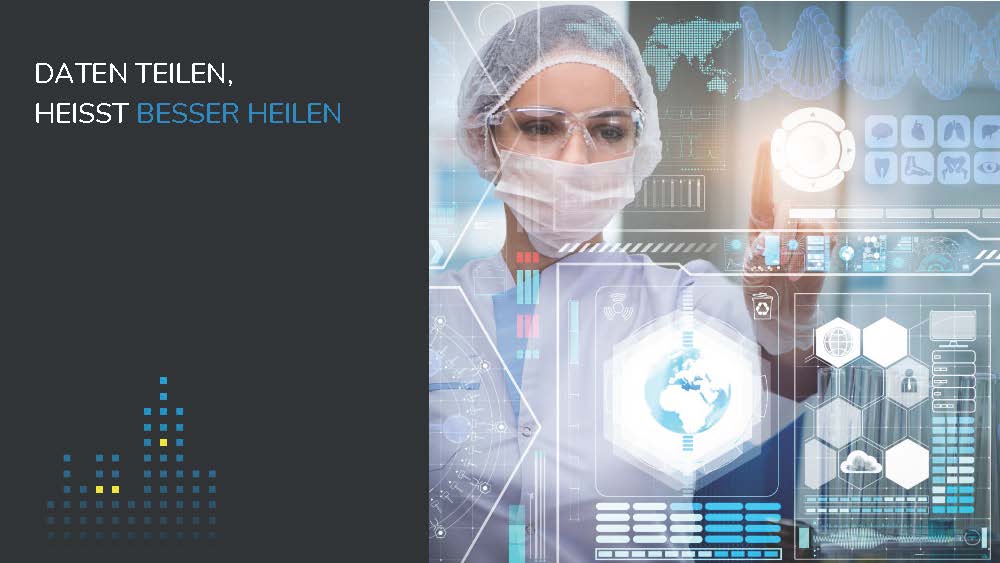
In November, acatech hosted an acatech DEBATE on good jobs in the digital transformation* to mark the publication of the acatech report “Chancen für Innovation und gute Arbeit. Impulse des HR-Kreises für die Politik”* (Opportunities for Innovation and Good Jobs. HR Working Group Proposals for Policymakers). The debate was moderated by Chairman of the acatech Board of Trustees, Henning Kagermann. Experts from science and industry and parliamentarians discussed the digitalisation of the workplace* and opportunities to shape the digital transformation. The topic was introduced by guest speakers including Julia Borggräfe (Federal Ministry of Labour and Social Affairs), Reiner Hoffmann (former President of the German Trade Union Confederation, DGB) and Martin Seiler (Deutsche Bahn). The discussion addressed the regulatory adjustments needed to reflect the dramatic changes occurring in the workplace and new rules and procedures for maintaining innovation-focused co-determination in the future.
Advice to the European Commission
acatech provides advice to the European Commission in close cooperation with its European sister academies under the auspices of the European Council of Academies of Applied Sciences, Technologies and Engineering (Euro-CASE). As part of the European Commission’s Scientific Advice Mechanism (SAM), the five European Academy Networks provide advice to EU policymakers through the project SAPEA – Science Advice for Policy by European Academies. International cooperation is an extremely important aspect of innovation policy and is a core part of the Academy’s work. It leads to the emergence of new networks and themes that help to shape the research landscape in Europe and the rest of the world. You can find out more about acatech’s international activities here.
Projects
Publications
News items
- Digitalisierung der Arbeitswelt: HR-Kreis debattiert unterschiedliche Perspektiven*
- Dialogreihe #DIGITALESHESSEN: Frauen in der digitalen Gesellschaft – was ändert Corona?*
- Sechster Innovationsdialog in der 19. Legislaturperiode: Von der Förderung technologischer Frühbeete zu selbsttragenden Ökosystemen*
- Dialogreihe #DIGITALESHESSEN: Bringt Corona die digitale Medizin?*
- Infineon CEO Reinhard Ploss wird Vizepräsident von acatech*
- Parlamentarische Gesprächsrunde zu Quantentechnologien*
- KI ist jetzt! Erfolgreiche Konferenz der Plattform Lernende Systeme zeigt Chancen für Mittelstand und Gesellschaft*
- Lernwerkstatt Technikkommunikation: Interessierte Nachwuchskräfte gesucht*
- Fünfter Innovationsdialog in der 19. Legislaturperiode: Resilienz von Lieferketten und Wertschöpfungsnetzwerken*
* Content only available in German
#FactoryWisskomm – discussing the future of science communication
Over a nine-month period, prominent figures from government, science, journalism and various foundations came together with science communication professionals to discuss the future of science communication and how they can work together to strengthen it. Members of acatech’s Management Board, Executive Board and Secretariat took part in #FactoryWisskomm and chaired the working group on Science Journalism in the Digital Age.
The results of this process were published in a report on promoting science communication* which presents an overview of current discussions, positions and potential actions relating to the future of science communication. The participants agreed that responsible science communication is an integral part of the overall science system. Good science communication comes about through collaboration between scientists, journalists, policymakers and civil society. Another conclusion is that science journalism is a key, independent pillar of good science communication. It helps the public to understand, evaluate and be mindful of scientific developments by providing a competent and impartial outside perspective on science, with a focus on society’s expectations.
Science and good science communication have been extremely important to society since the start of the coronavirus crisis, playing a key role in our society’s resilience to the pandemic. Consequently, the coalition agreement of Germany’s new coalition government includes the goal of supporting science communication and a commitment to promoting science journalism.
Science Journalism in the Digital Age
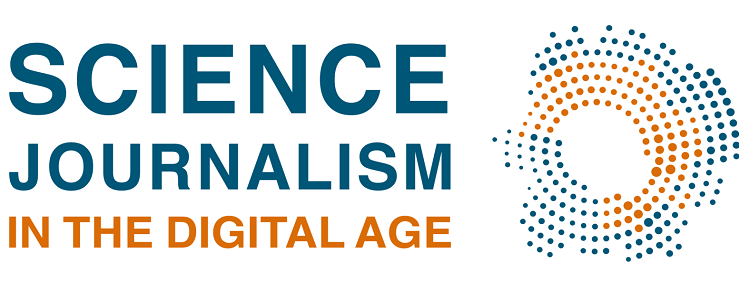
If high-quality science and technology journalism is a key pillar of good science communication, how can we ensure that as many people as possible have access to it? The digital transformation has brought about rapid change in the media and put the industry under huge financial pressure. Against this backdrop, the international event series “Science Journalism in the Digital Age” (SciCon) explored the future of science journalism:
- What might strong science journalism look like in the digital age?
- Which approaches, partnerships and business models will be sustainable in the future?
- How can government, foundations and private sector actors support a successful digital transformation of science journalism?
Project partners the German Science Journalists’ Association (WPK) and acatech organised a series of international SciCon lectures to explore these questions. Speakers from different media systems across the globe analysed current developments and discussed new ideas and strategies. The different perspectives and case studies were summarised in an online conference held at the end of the project. Guests from the Bundestag, European Commission and Federal Ministry of Education and Research (BMBF) discussed the conclusions with representatives of the science and journalism communities.
The entire event series and its outcomes are documented in an online knowledge reservoir at https://science-journalism.eu/. A PDF summary is available here. The fundamental conclusion is that, in addition to creative solutions, a successful digital transformation of science journalism will require new business models, partnerships and funding instruments that reflect the importance of science journalism as a key pillar of science communication and the need for it to remain impartial.
North-Rhine Westphalia Innovation Award
North Rhine-Westphalia’s Ministry of Economic Affairs, Innovation, Digitalisation and Energy recognises outstanding achievements in the field of innovation and research through the North Rhine-Westphalia Innovation Award. Prize money totalling €150,000 makes it the second most valuable award of its kind in Germany, after the German President’s “Deutscher Zukunkftspreis” Award for Innovation in Science and Technology. acatech coordinates the review and jury process.
The winner of the 2021 North Rhine-Westphalia Innovation Award’s Innovation category was Rita Schmutzler of the University of Cologne’s Center for Familial Breast and Ovarian Cancer. Internationally recognised as a pioneer in the field of risk-adapted cancer prevention, she has introduced this approach to the clinical care of breast cancer patients. Rita Schmutzler developed the underlying generic concepts, identified the relevant risk genes and established and evaluated clinical care strategies. The winner of the Young Scientists category was Jonas Johannes Christ of RWTH Aachen University’s Institute of Microbiology. Jonas Christ developed a recycling method and the analytics needed to recover polyphosphate from agricultural waste. The technique has a wide range of potential applications. The Honorary Award went to Bernhard Korte of the University of Bonn for his applied research in the field of combinatorial optimisation and chip design. Among other things, his research is helping to improve the performance of modern computer chips.
Responsibility in the technological sciences
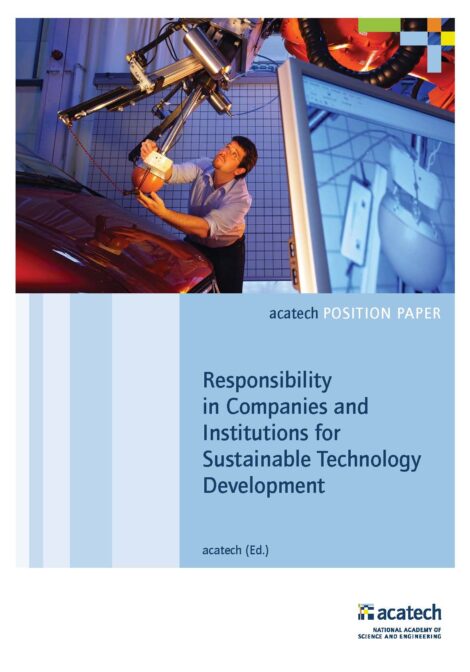
Anyone who develops new technologies and brings them into use bears a corresponding responsibility – at least in theory. In practice, however, there is often a diffusion of responsibility caused at least in part by the growing complexity and interdependence of technological, social and environmental factors. In a position paper published in June 2021, acatech sets out what companies, institutions and universities can do to foster a culture of responsibility in technology development. This includes everything from providing lectures on the subject in universities to the introduction of ombuds systems in companies.
The position paper is based on discussions with companies in the automotive, life sciences and IT industries. The authors also consulted a research organisation and various federal agencies. As the National Academy of Science and Engineering, acatech is committed to promoting discussion of responsibility in science and engineering both among its own Members and Senate companies and more widely.
TechnikRadar – two surveys published in 2021
Since 2018, the TechnikRadar survey published by acatech, the Körber Foundation and ZIRIUS has been finding out what people in Germany think about technology. Against the backdrop of the coronavirus pandemic, two surveys were published in 2021.
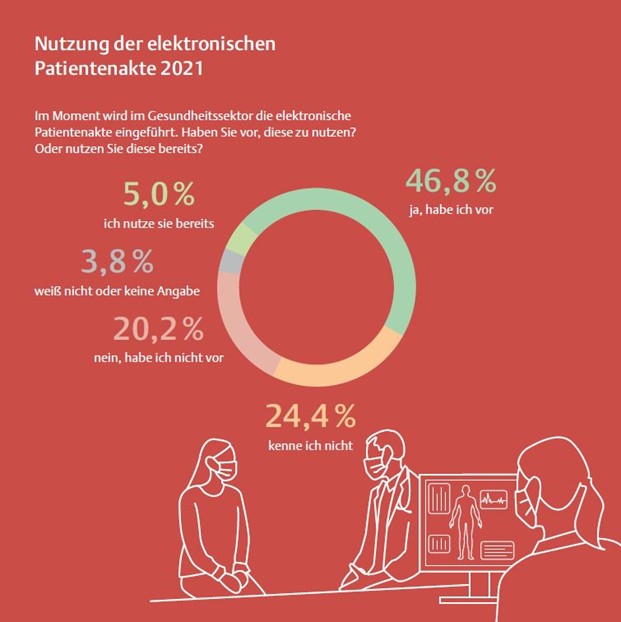
A TechnikRadar survey of stakeholder perspectives on the future of health* was published in June, while November saw the publication of TechnikRadar Corona Extra*. Doctors and representatives of hospitals, pharmaceutical companies and patient organisations were asked about their opinions on the digital transformation of the healthcare system. Although the interviewees were mostly positive about the changes resulting from digitalisation, they also identified some tensions and conflicts of interest. For instance, while the use of highly sensitive medical data calls for high privacy protection standards, it is also vital to ensure the transparency and accessibility of medical data so that it can be shared among all the relevant service providers.
The respondents had little doubt that there will be fundamental changes in the doctor-patient relationship. Doctors are becoming information brokers – as well as making their own diagnosis, they are also expected to filter, evaluate and correct additional information and data for their patients. Meanwhile, digitalisation also empowers patients. With more and more people doing their own research into their health issues and becoming better-informed, digital health literacy is an increasingly important topic:
The digital transformation of the healthcare system can’t be taken for granted. Digital health literacy is vital for doctors and patients alike, since without it they cannot evaluate and use new, data-based knowledge. The more sovereignty we have in the use of digital technologies, the greater the prospects of overall benefits and more individual choice.
Cordula Kropp, sociologist at the University of Stuttgart’s Center for Interdisciplinary Risk and Innovation Studies (ZIRIUS) and lead researcher of the TechnikRadar project.
Published in November 2021, the TechnikRadar Corona Extra survey came to the surprising conclusion that the impact of the coronavirus pandemic on the overall health of people in Germany was less serious than might have been expected. 71.8% of those interviewed in this representative population survey rated their health as good or very good, compared to just 54.7% in the 2017 TechnikRadar survey. The study also found that people in Germany became less sceptical about technology during the coronavirus crisis. The proportion of people who agreed with the statement “The more technology develops, the more constraints there are on individuals” fell sharply from 65.5% in 2019 to 51% in 2021.
Compliance 2019
Compliance 2022
Growth in the percentage of video consultations, TechnikRadar 2021 (Source: Obermann et al. 2020/acatech)
Shaping technological change together
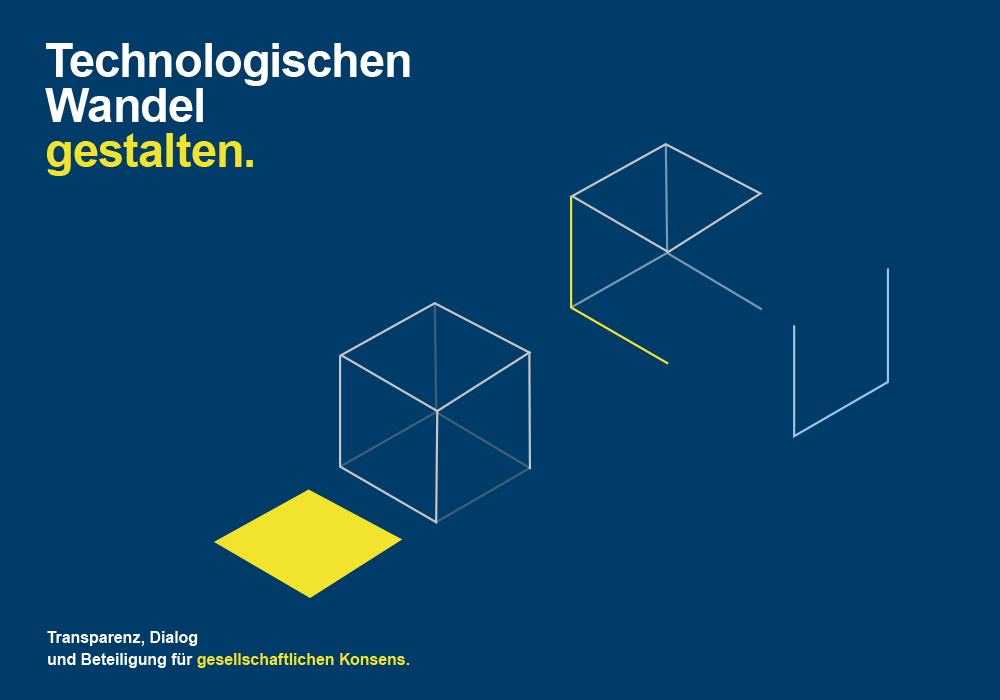
© acatech
According to the TechnikRadar “Corona Extra” representative population survey carried out by acatech, the Körber Foundation and ZIRIUS, trust in technology has grown among people in Germany since the start of the coronavirus pandemic. Nevertheless, the percentage of people who think that technology solves more problems than it causes remains low, at around one quarter. The theoretical benefits of new technologies only translate into practice if they are at least tolerated and ideally accepted and shaped by individuals and society as a whole. The value of digital technology became particularly apparent during the pandemic, when it strengthened economic and social resilience by allowing people to meet friends, attend class and work virtually during lockdown.
The project Shaping Technological Change* aims to analyse the contradictions in the assessment of technologies and the continuing public scepticism towards them. It is also seeking ways of organising an effective dialogue about these contradictions. These goals will be pursued by two working groups on “Resilience and performance of digital infrastructure” and “Supporting the resilience and performance of the healthcare system through data availability”. In 2021, participatory communication formats for consistent, trusted technology communication were developed through transdisciplinary cooperation between experts on these topics and communication experts from science and industry. These formats will be tested in the field during 2022.
We can’t just be passive spectators of technological change – we want a society that actively shapes it. That is what this project is all about. We want to communicate directly with the public and encourage them to share their hopes, expectations, fears and criticisms with us. We want all this input to inform the public debate and the way that digital infrastructure is implemented – transparently and without prejudging the outcome.
Jan Wörner, project co-lead and acatech President
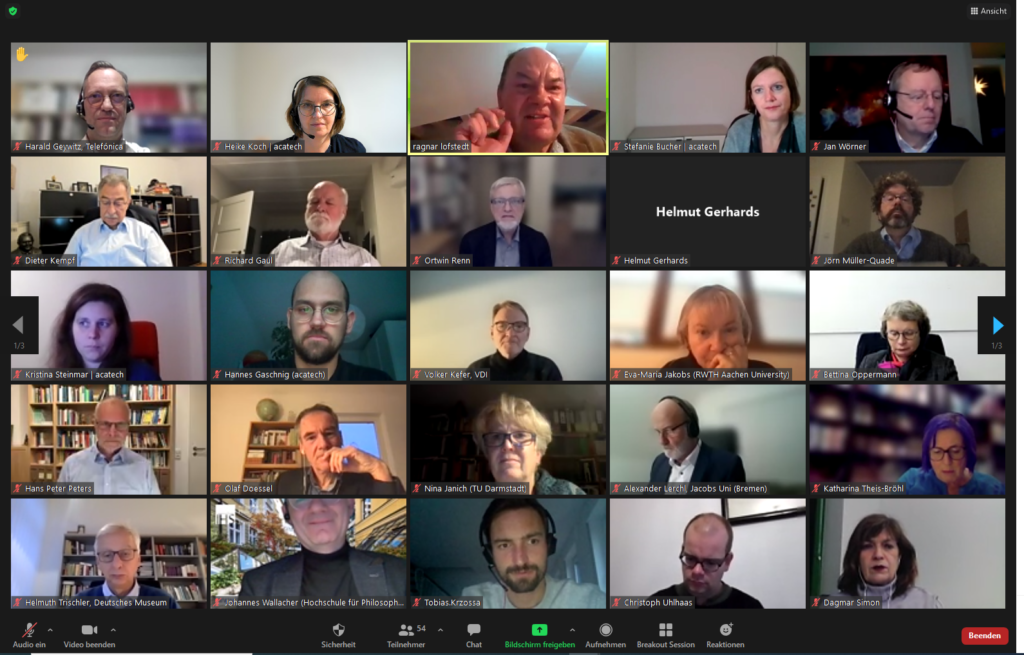
acatech HORIZONS

© acatech
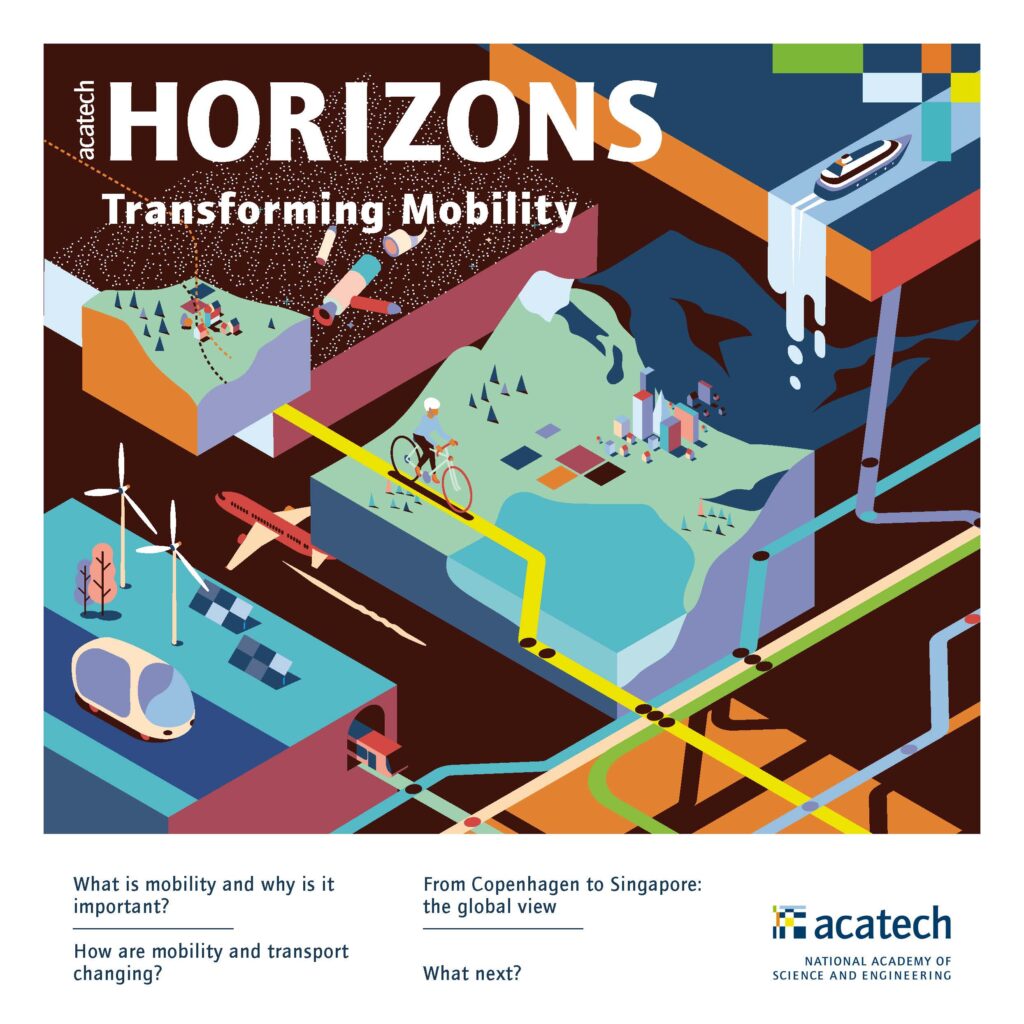
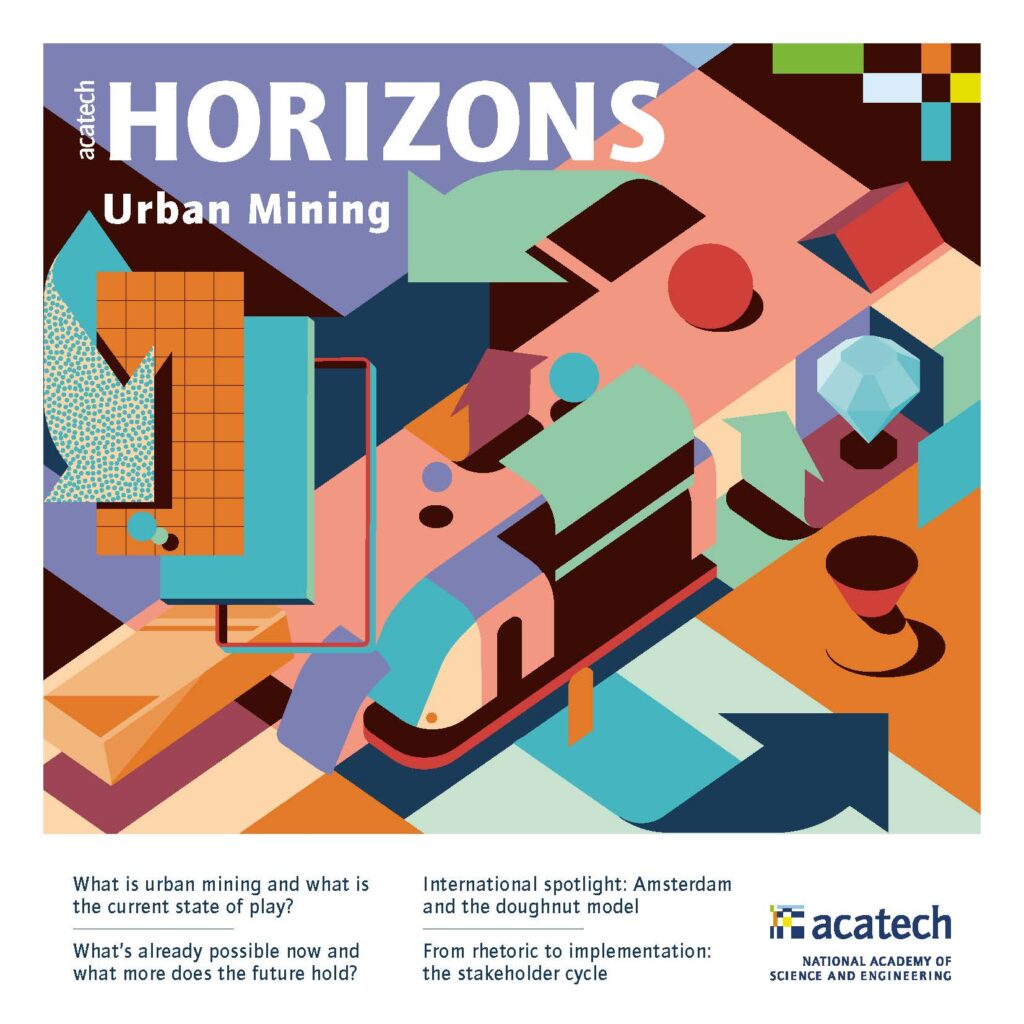
acatech’s HORIZONS series supports the public debate on the potential applications and implementations of new, economically important technology fields that enable changes in society. The two HORIZONS publications in 2021 focused on two technologies that have the potential to bring about major changes: Urban Mining and Transforming Mobility.
In the acatech HORIZONS series, the Academy aims to set out the facts, describe the social, economic and policy questions and the options for addressing them, and promote public debate. Events for specific target groups and the HORIZONS logbook* facilitate a dialogue with interested members of the public who are not part of the acatech community. The logbook is where members of the project group share their personal views on topics such as why civil society is both an enabler of and barrier to new mobility* and its opinion-forming role in the urban mining debate*.
The project group’s experts identified the translation of scientific discoveries into economically viable business models as a key challenge in the field of urban mining. This will require policy incentives, bold investors and close cooperation between all the relevant actors from science, industry and government. A virtual acatech am Dienstag* (acatech on Tuesday) event with representatives of Munich City Council discussed what forms this cooperation might take in the construction sector and the practical challenges that the actors will need to overcome. As part of Sustainable Development Week, experts from France and Germany met at the French embassy in Berlin to discuss successful business models for recycling concrete, plastic and e-waste in an international context.
It could be argued that civil society has a more important part to play in transforming mobility than in many other technology fields. How can we use participatory methods to develop sustainable mobility that meets people’s needs, especially in rural areas? Drawing on the findings of the project “Mobilität neu denken” (Reimagining Mobility), this question was discussed in a stakeholder dialogue* between experts and representatives of the state parliament and local authorities. At the IAA Citizens Lab* in Munich’s Marienplatz, an interactive panel discussion between experts from science, industry and the city council focused throughout on the public’s views about topics such as socially just mobility and commuting.
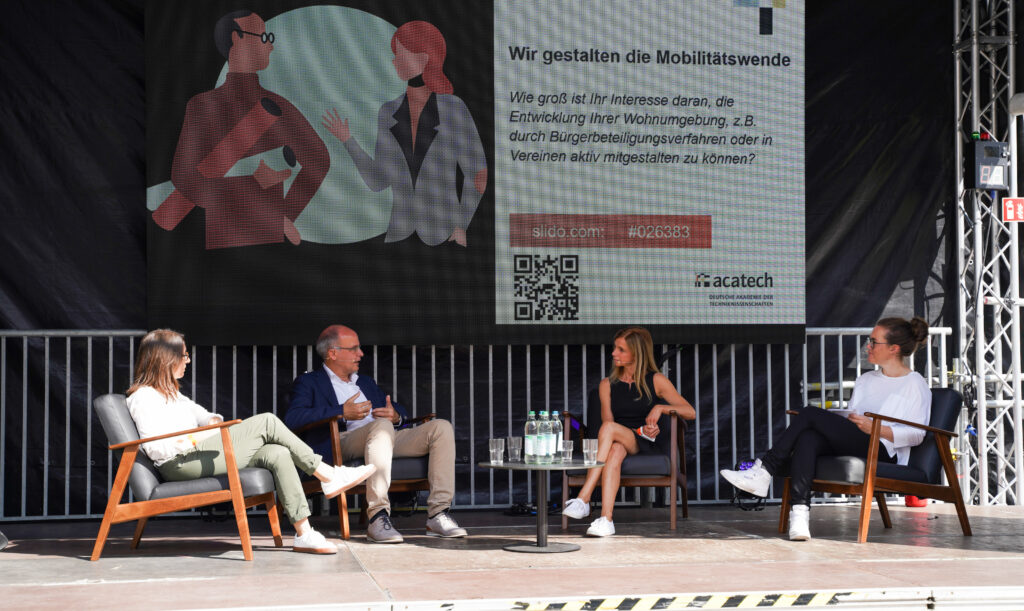
The IAA Citizens Lab discussed how the public can shape the mobility transition in the city and the countryside. Left to right: Martina Kohlhuber/acatech, Stefan Gerwens/ADAC, Christine Weis-Hiller/Munich City Council; Moderator: Katja Diehl (© acatech/Laura Grewe)
Dialogue about the future of urban and rural areas
Where do people in Germany want to live in the future – in cities, in smaller towns, or in the countryside? What do they want their future lives in these urban or rural areas to be like – how do they want to live, eat and work? And what role will technological innovations play, especially those in the field of bioeconomy? These questions were investigated in a nationwide survey on the future of urban and rural areas carried out as part of Germany’s Science Year 2020|21 – Bioeconomy. The initiative was jointly conceived by acatech, the Center for Responsible Research and Innovation (CeRRI) at Fraunhofer IAO and broadcaster Bayerischer Rundfunk (BR). Future scenarios jointly developed by acatech and CeRRI were presented on the website www.stadtlandchancen.de*. These provided the basis for the survey, which was completed by 8,787 people in summer 2021.
The results were published in early November 2021 during the ARD broadcaster’s special week on the theme of how town and countryside are changing and where people will live in the future. The report found that concerns about mobility are the main issue for people who live in the countryside. Many rural dwellers rely heavily on their cars and do not believe that new mobility services will be introduced where they live. This underlines the importance of developing specific mobility solutions for rural areas to enable environmentally sustainable mobility there too. By and large, these concerns about mobility are absent in urban areas, where people are far more worried about financial and work-related issues. People living in towns and cities are likelier to feel insecure about rising rents and the high cost of living. Another important finding was that 88.5% of respondents said they wanted to be informed about cutting-edge topics as early as possible.
One way that acatech responded to this request was through the dialogue project “Bayern denkt Zukunft” (Bavaria Imagines the Future), for which it carried out its own analysis of the data specifically for Bavaria. The data was supplemented with the outputs of four regional workshops where the online survey questions were discussed with members of the public. The project, which was carried out in cooperation with Fraunhofer CeRRI and funded by the Bavarian State Ministry of Food, Agriculture and Forestry, sought to engage in a dialogue with all parts of Bavarian society and identify options for Bavaria’s future development. The study uncovered regional similarities and differences in the wishes and concerns of people living in Bavaria. These can be used to inform innovative ideas tailored to the different regions. Regional engagement and dialogue events are now providing members of the Bavarian public with the opportunity to develop these ideas together with representatives of industry, government and the public administration. The key themes to emerge include the development of regional agriculture, sustainable food for the future and new living and working concepts that bridge the gap between city and countryside. Fifty young people used the online game Minecraft as a platform to visualise their ideas for their region’s future and feed them into the dialogue process, which also included Bavaria-wide public debates*, regional co-creation workshops* and stakeholder discussions*, and an online conference* in the form of an Urban/Rural BarCamp.
Mobility Monitor – a representative survey
Mobility Monitor 2021 was the third edition of a representative survey in which acatech and the Allensbach Institute for Public Opinion Research (IfD) investigate public attitudes towards various aspects of mobility. The survey shines a light on the public’s mobility needs and behaviour and on public attitudes towards mobility trends.
Driving the Human – seven prototypes for eco-social renewal
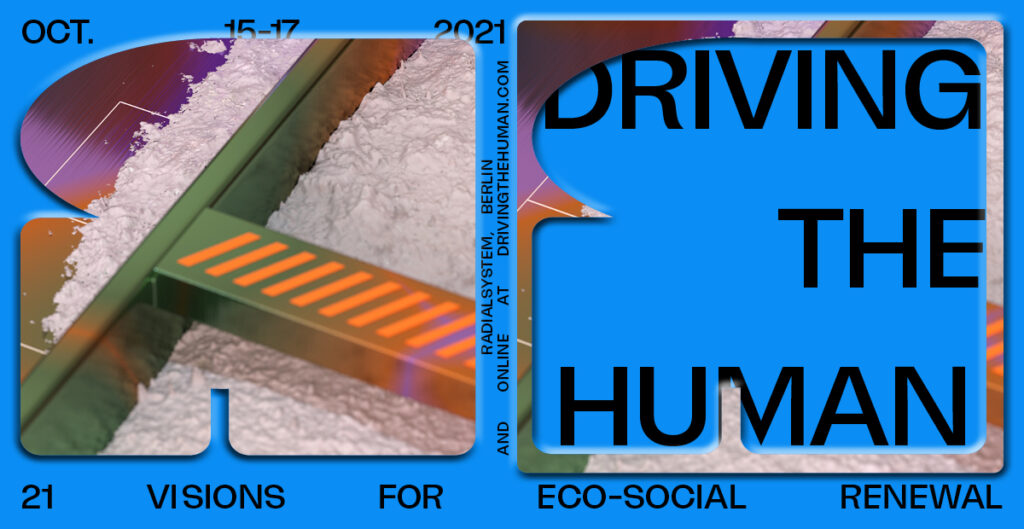
Key visual of the festival “21 Visions for Eco-social Renewal” (©Forecast)
When art, science and technology interact, new visions of the future can emerge. Driving the Human is a joint project between acatech, the mentoring platform Forecast, Karlsruhe University of Arts and Design (HfG) and the Center for Art and Media Karlsruhe (ZKM). The project partners are developing prototypes for sustainable coexistence that respond to complex, transformational modern challenges that are often perceived as threatening, such as climate change.
This joint project blends science, technology and art in a collaborative, transdisciplinary approach. The project aims to act as a catalyst for experiments that reimagine the methods and tools for achieving social change and drive the creation of sustainable visions of the future.
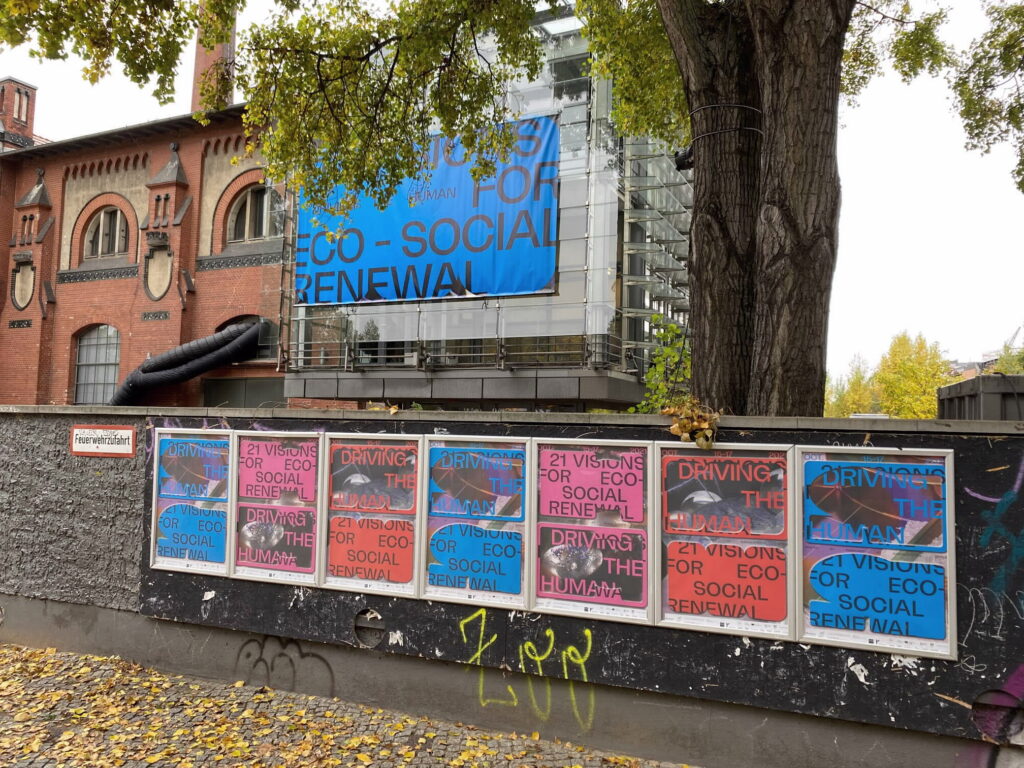
Over 1,000 project teams and individuals from 99 countries responded to the lead organisations’ call for applications. The 21 project proposals selected by a transdisciplinary jury were presented to the public at the interactive festival 21 Visions for Eco-social Renewal, held in Berlin from 15 to 17 October 2021.
In November, the jury selected the seven artists with the most promising prototypes. These artists were awarded funding to put their proposals into practice. Following a joint workshop with scientists in December 2021, the artists are now working on the realisation of their projects.
Public dialogue events
© acatech
acatech provides advice to policymakers and the public. As well as delivering accessible information, another key aspect of this mission is to engage in a reciprocal dialogue on controversial topical technology questions. The Academy hosts discussions between experts on these issues and representatives of government, science, industry, civil society organisations and the media, as well as interested members of the public.
acatech am Dienstag (acatech on Tuesday) is a series of regular events hosted by the Academy. Experts from science, industry, government and civil society give talks about and discuss issues such as aviation,* AI,* 5G* and the relationship between democracy and technology*. While the subject matter is usually based on acatech project themes and publications, the discussions also encompass new topics that are not yet an established part of acatech’s work, as well as more fundamental questions, such as “what are science* and technology*?”.
In 2021, most events in this series were held online. However, it was possible to organise some face-to-face events in spite of the pandemic, including one in Augsburg on water as a global good, resource and research topic*. More than 5,500 people took part in the 28 “acatech am Dienstag” events in 2021.
In 2021, acatech also continued the series of dialogue events on “Innovation and Responsibility” in partnership with the Evangelische Akademie Tutzing and LMU Munich’s Institut für Technik-Theologie-Naturwissenschaften. The events focused on personalised medicine* and carbon capture and utilisation*. acatech plans to continue this dialogue series in 2022.
acatech devises innovative science communication formats to pass on experience and knowledge to young scientists, engineers and communication professionals. One example is the annual technology communication workshop* at the Deutsches Museum in Munich, which the Academy organises in conjunction with Wissenschaft im Dialog.
acatech organises dialogue events with a range of other partners in order to regularly reach and engage with different target groups. These partners include further education colleges, the Deutsches Museum, the “Münchner Wissenschaftstage” science festival, the Futurium in Berlin, the Catholic Academy in Bavaria and the Akademie für politische Bildung in Tutzing.
Projects
- Responsibility in the technological sciences
- TechnikRadar
- Technologischen Wandel gestalten: Transparenz, Dialog und Beteiligung für gesellschaftlichen Konsens*
- acatech HORIZONS: Urban Mining
- acatech HORIZONS: Transforming Mobility
- Bayern denkt Zukunft*
- Wir entwickeln Zukunft – Bioökonomie gemeinsam gestalten*
- Driving the Human – seven prototypes for eco-social renewal
Publications
- acatech HORIZONS: Urban Mining
- TechnikRadar 2021: Stakeholderperspektiven zur Zukunft der Gesundheit*
- Responsibility in Companies and Insitutions for Sustainable Technology Development
- acatech HORIZONS: Transforming Mobility
- STADT.LAND.CHANCEN – Wünsche und Sorgen von Bürgerinnen und Bürgern in Stadt und Land*
- BAYERN DENKT ZUKUNFT: Stadt.Land.Chancen – Ergebnisse der Befragung in Bayern*
- TechnikRadar 2021: Corona Extra 17.11.*
- TechnikRadar Corona Extra: Deutsche fühlen sich technikversierter und gesünder*
News items
- Fünfter Innovationsdialog in der 19. Legislaturperiode: Resilienz von Lieferketten und Wertschöpfungsnetzwerken*
- “Driving the Human” Open Call: Ideas and concepts for shaping the future
- Advanced Systems Engineering – Ein neues Leitbild für das Engineering von morgen
- acatech am Dienstag: Was ist Technik? *
- Technikwissenschaftlerinnen fördern: Theresa Madreiter gewinnt den Schnieder-Preis JUNGE MACHERIN*
- Verborgene Schätze im Siedlungsabfall: acatech HORIZONTE zeigt Potenzial des Urban Mining*
- Nutztierhaltung – Herausforderungen und Alternativen*
- 5G – Entscheidungen zwischen Visionen und Vorbehalten*
- Vernetzter Verkehr: acatech initiiert Trägergesellschaft „DRM Datenraum Mobilität GmbH“ als Non-Profit-Organisation*
- Die recycelte Stadt – wenn Beton zur Mangelware wird*
- TechnikRadar 2021 – Einblicke in die Zukunft der Gesundheit*
- TechnikRadar 2021: Digitalisierung ändert das Arzt-Patienten-Verhältnis*
- Mehr Recycling in der Industrie: Start der „Dialogplattform Recyclingrohstoffe“*
- acatech, CeRRI und Bayerischer Rundfunk starten deutschlandweite Umfrage*
- Verantwortung für nachhaltige Technikentwicklung übernehmen*
- Mobility Monitor 2021: Are people in Germany ready for the transition to sustainable mobility?
- Klimaschonend unterwegs: acatech HORIZONTE über eine nachhaltige und gerechte Mobilitätswende*
- IAA-Woche: acatech bringt sich mit Umfragen, Bürgerdialogen, Fachbeiträgen und Praxistests ein*
- Sechster Innovationsdialog in der 19. Legislaturperiode: Von der Förderung technologischer Frühbeete zu selbsttragenden Ökosystemen*
- Umfrage Bioökonomie: Alle Daten des TechnikRadars 2020 sind jetzt frei verfügbar*
- KI-Regulierung: Wie sich vertrauenswürdige Systeme gestalten lassen*
- acatech am Dienstag: IT-Expertin Claudia Eckert skizziert neue Sicherheitskultur*
- Nationale Plattform Zukunft der Mobilität und Mobility Data Space präsentieren sich auf dem ITS World Congress*
- Lernwerkstatt Technikkommunikation: Dialog über Wandel und aktuelle Herausforderungen*
- Studie: Stadt- und Landbewohnende bewerten zukünftige Herausforderungen unterschiedlich – und wollen mehr mitgestalten*
- „Technologischen Wandel gestalten“: Projektmitglieder nehmen Arbeit auf*
- TechnikRadar Corona Extra: Deutsche fühlen sich technikversierter und gesünder*
- Was ist Technik – und was ist der Mensch? Der Mensch im Spiegel der Technik*
- acatech verleiht Journalistenpreis PUNKT für Beiträge über Aerosole und die Rolle des Menschen im Anthropozän*
- Digitalisierung der Arbeitswelt: HR-Kreis debattiert unterschiedliche Perspektiven*
- Grüne Signale für die Schiene – Ansätze aus Deutschland und der Schweiz*
* Content only available in German
Covid-related papers and events
2021 was year two of the coronavirus pandemic. Shortly after the onset of the pandemic, acatech identified three crisis intervention phases that would characterise the years ahead: a short-term intervention phase, a phase of stabilisation during the crisis, and a recovery phase in which it would be necessary to stimulate economic and social life. The pandemic was expected to be a long-term disruption with phases of recovery followed by phases of tighter restrictions.
© Shutterstock / Gorlov-KV
acatech drew its first conclusions from the crisis in spring 2021, when a group of experts called for a drive to modernise the healthcare system* in order to make it more resilient and improve its performance. The experts recommend the establishment of a common European electronic reporting system for medical data. Real-time data on infection numbers is key to choosing the right protective measures.
Neither the pandemic itself nor its wave pattern and the emergence of multiple variants of the virus were entirely foreseeable – and the same applies to other crises. In order to be better prepared for unforeseeable situations, we need to strengthen our resilience to crises in general. According to an acatech IMPULSE, resilience must therefore become a goal for economic and innovation policy. Three IMPULSE publications – a general overview and two case studies of the healthcare and automotive industries – provide guidance on strengthening the resilience of supply chains and value networks so that they are better prepared to cope with crises of all kinds. The publications emphasise that although these measures may have been precipitated by the pandemic, they should not be focused solely on the coronavirus crisis, since future crises could be completely different in nature. This warning came true in a manner that nobody could have foreseen when the Putin government launched its invasion of Ukraine.
acatech also analysed public opinion about these issues and made its own contributions to the public debate. For example, a public debate hosted by the Academy and the Hessian Ministry for Digital Strategy in autumn 2021 as part of the #HessenDigital series asked whether Covid will be the catalyst for digital medicine*. A TechnikRadar* survey published in the autumn confirmed that the pandemic has made people more aware of the benefits of scientific and technological advances. According to this representative, science-based survey, people in Germany feel better-informed about technology, while the percentage of people who associate new technologies with new constraints has declined.
Research Council investigates how to protect workers during pandemics
The Research Council of the Plattform Industrie 4.0 investigates research questions connected with the implementation of Industrie 4.0 in Germany. In 2021, its work focused on coping with the coronavirus pandemic and identifying strategies to help businesses prepare for future crises and become more resilient overall.
An expert report on protecting workers in manufacturing companies during pandemics* analyses how companies are implementing statutory infection control and health and safety measures in practice, describes best practices and identifies barriers to implementation. An online guide* provides concrete advice about how small and medium-sized enterprises (SMEs) in manufacturing industry can ensure that conditions are as safe as possible for their workforce and protect themselves against future pandemics.
Digitalisation helps to strengthen industry’s resilience by making it possible to control value creation processes remotely and by actually enabling networked value creation in the age of Industrie 4.0. In December, the Research Council published an expert report on the modelling and simulation requirements of smart factories*. The report concludes that current modelling and simulation theories are adequate for the implementation and use of simple capabilities such as the virtual representation of a system solution and its environment. However, current approaches reach their limits as soon as the complexity level increases. There is thus an urgent need for research in this area.
Projects
Publications
- Pandemiefeste Beschäftigung in Produktionsunternehmen*
- Impulse zur Innovationspolitik 2021+*
- Value Networks in Times of Infection Crises (expert report)
- Resilience as a Goal for Economic and Innovation Policy
- Resilienz der Gesundheitsindustrien: Qualität und Versorgungssicherheit in komplexen Wertschöpfungsnetzwerken*
- Resilienz der Fahrzeugindustrie: Zwischen globalen Strukturen und lokalen Herausforderungen*
- The Resilience and Performance of the Healthcare System in Times of Crisis
News items
- Pandemiefeste Beschäftigung in Produktionsunternehmen – Wie man sich auf Infektionskrisen vorbereiten kann*
- TechnikRadar Corona Extra: Deutsche fühlen sich technikversierter und gesünder*
- Digitalkonferenz der LABVOLUTION setzt neue Impulse für die Laborbranche*
- Dicke Luft im Klassenzimmer? Wie sich Ansteckungen durch Aerosole verhindern lassen*
- Dialogreihe #DIGITALESHESSEN: Frauen in der digitalen Gesellschaft – was ändert Corona?*
- Spitzendialog des Forschungsbeirats veröffentlicht Kommuniqué mit 12 Impulsen für die Zukunft von Industrie 4.0*
- Publikation „Wertschöpfungsnetzwerke in Zeiten von Infektionskrisen“ – Wie sich Unternehmen für die Zukunft wappnen können*
- Resilienz als wirtschafts- und innovationspolitisches Gestaltungsziel*
- Der Weg aus der Krise: acatech Webtalk über die Chancen der Digitalisierung für KMU*
- Lehren aus der Pandemie: Das Gesundheitssystem besser gegen Krisen wappnen*
- Fünfter Innovationsdialog in der 19. Legislaturperiode: Resilienz von Lieferketten und Wertschöpfungsnetzwerken*
* Content only available in German
The German elections in 2021 were frequently referred to as the “climate election”, and strategies for tackling the climate crisis form a key part of the coalition agreement. An ambitious expansion of solar and wind power, the promotion of a circular economy and the development of an efficient hydrogen economy are just some of the goals included in the agreement. acatech and various initiatives and platforms coordinated by the Academy published numerous studies and analyses and organised several dialogue events on these topics in 2021.
Making the energy transition happen
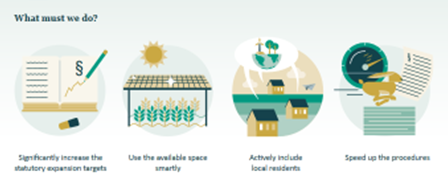
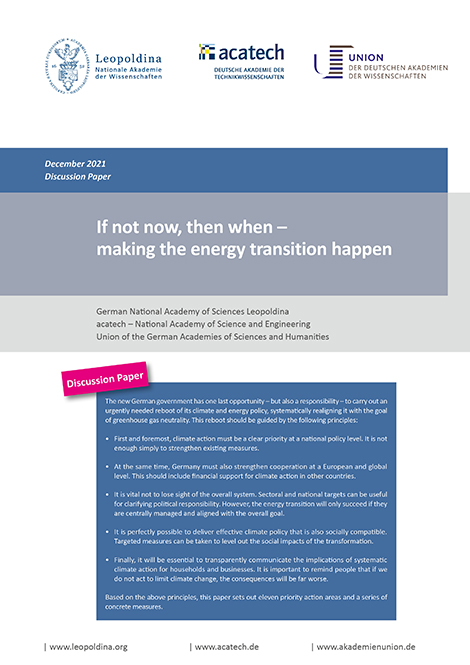
Shortly before the new German government took office, the Academies’ Project Energy Systems of the Future (ESYS) published the discussion paper If not now, then when – making the energy transition happen. The paper presents an overview of the key measures that must be taken during the new parliament if Germany is to meet its climate targets. The experts argue that piecemeal changes to the energy system are no longer enough to achieve the necessary reduction in CO2 emissions. Consequently, they maintain that tackling climate change should be a national and international priority and should be treated as a cross-cutting challenge to be addressed by government, industry and civil society alike.
As the energy transition progresses, energy systems are becoming more and more complex. It is now necessary to integrate multiple renewable energy sources and new consumers such as electric vehicles.
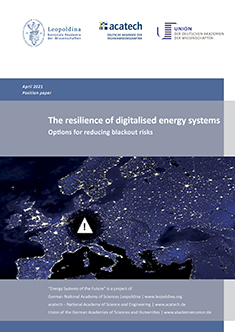
A smarter energy system is key to enabling this integration. As a result, questions relating to the digitalisation of the energy system are increasingly coming to the fore. In February, ESYS published the position paper The resilience of digitalised energy systems. Options for reducing blackout risks, which explains how digitalisation can help to improve the connectivity, automation and control of energy systems. However, digitalisation must be effectively and actively managed to combat the emergence of new threats such as software bugs and cyberattacks. Consequently, the experts who contributed to the position paper call for a resilience strategy to be drawn up as soon as possible to ensure that the energy system is prepared to cope with unforeseen future events.
Hydrogen: a key element of the energy transition
In the energy systems of the future, hydrogen will be both a base element and a means of storing chemical energy. The establishment of a hydrogen economy was a key theme of the energy policy debate during 2021. Hydrogen can be used for applications that currently lack alternatives to fossil fuels, as well as for storing energy and importing it from countries with extensive wind and solar resources. acatech currently has three projects that are helping to pave the way towards a green hydrogen economy.
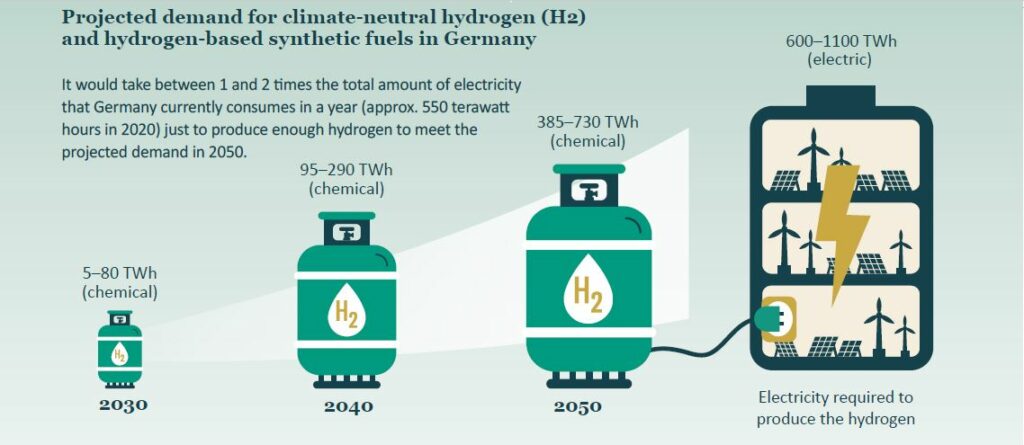
The “Hydrogen Economy 2030” working group of the Academies’ Project ESYS investigated how hydrogen and energy carriers synthesised from hydrogen, such as methane, ammonia and liquid fuels, can be transported to Germany. The working group hosted a public event to explain the regulatory changes needed to make this possible*.
The HySupply project is studying one important option for the development of an international hydrogen economy by investigating how the stored energy of the Australian sunshine can be shipped to Germany. acatech is exploring this question in cooperation with the Federation of German Industries (BDI) and an Australian consortium led by the University of New South Wales (UNSW) Sydney. In 2021, the project reached the interim conclusion that the distance between the two countries is not a major obstacle. However, it will be necessary to create the relevant regulatory and policy conditions within the next two years if a supply chain between Germany and Australia is to be established by 2030.
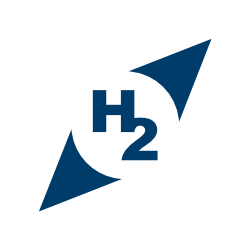
The H2-Kompass project initiated by acatech in summer 2021 will provide the basis for the German government’s hydrogen roadmap. Together with DECHEMA (the Society for Chemical Engineering and Biotechnology), the Academy is developing an overview, due to be published in May 2023, of the policy options for driving a rapid market ramp-up of the hydrogen economy.
Circular Economy
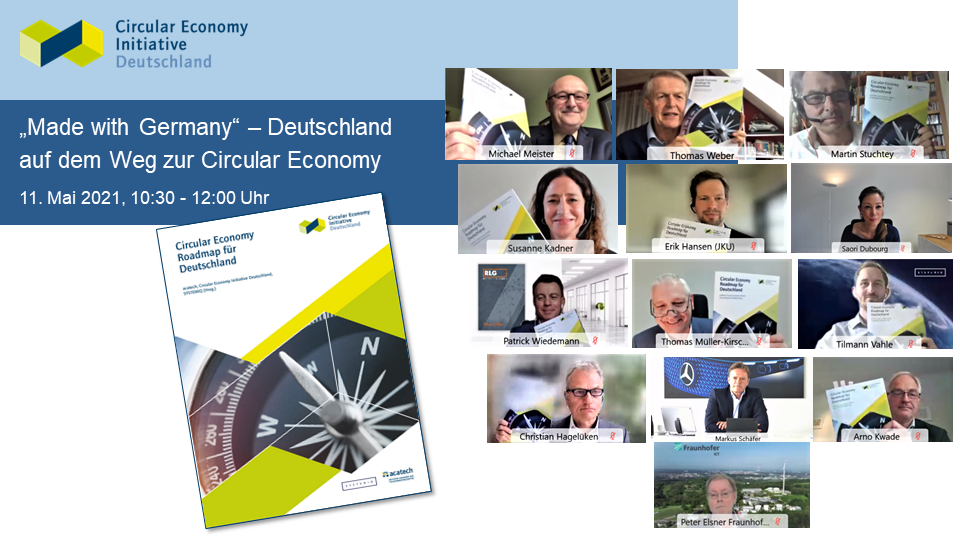
By decoupling resource consumption from economic growth, a circular economy helps to cut emissions and reduce dependency on raw material imports. It also enables the development of new business models based on resilient, regional, circular value cycles that can help to strengthen Germany’s competitiveness on a long-term basis. This approach to doing business gained currency during 2020 and 2021, when the coronavirus crisis highlighted the risks associated with global supply chains. The new German government intends to bring existing raw material strategies together under a new “National Circular Economy Strategy”.
In May 2021, the Circular Economy Initiative Deutschland (CEID) presented a circular economy roadmap for Germany. Over 130 experts from 50 companies, research institutions and civil society organisations developed policy options for the transition to a circular economy in three CEID working groups. Two of the working groups focused on concrete use cases for traction batteries and packaging, while the third addressed the overarching theme of circular business models. The Circular Economy Roadmap for Germany brings together the findings of these three interdisciplinary, cross-sectoral working groups in a consolidated position paper that sets out a roadmap for the whole of German society. The main aim of the roadmap is to present an integrated, common vision of a circular economy in 2030 and formulate concrete recommendations for its accomplishment.
acatech is also supplementing the outputs of the BMBF-funded CEID initiative through a range of projects that take a closer look at some of the key questions relating to the implementation of a circular economy in Germany:
- EIBA* is a joint project between acatech, Circular Economy Solutions, TU Berlin and Fraunhofer IPK to develop a machine that can identify and evaluate the condition of used parts, harnessing digital technology to make an important contribution to the circular economy. The efficient collection and identification of used products is a key requirement for the transition from a linear to a circular economy.
- acatech is a scientific partner in the Dialogue Platform on Recycling Raw Materials, which was established in autumn 2021 by the German Mineral Resources Agency (DERA) at the Federal Institute for Geosciences and Natural Resources (BGR). The goal of the Dialogue Platform is to increase the proportion of secondary raw materials in the German economy’s raw material supply. The platform facilitates a dialogue between science, industry and the public administration in order to develop policy options for increasing the secure, sustainable supply to German industry of metals and industrial minerals sourced from secondary raw materials.
- acatech, WWF Germany and the Johannes Kepler University Linz are developing a Circular Economy Card Deck for Business Model Workshops (CE-CA-WO) in a project funded by the German Federal Environment Foundation (DBU). In conjunction with a moderator’s guide and a series of templates, the card deck is designed to inform medium-sized enterprises about the circular economy and circular business models and help them switch from their current business models to a more circular approach.
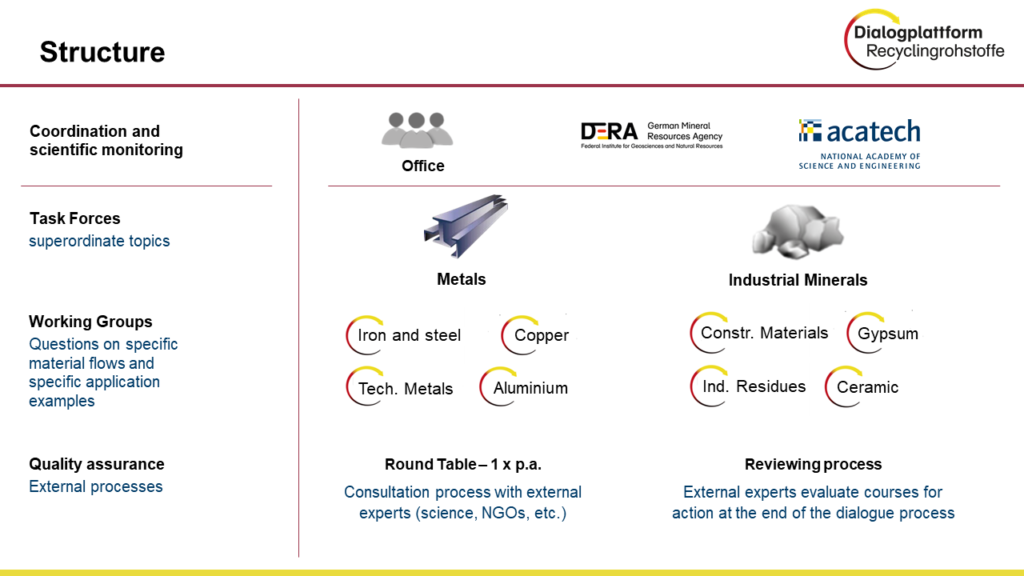
Wood-based bioeconomy

© iStockphoto / georgeclerk
A bioeconomy that uses renewable raw materials instead of fossil fuels can play a key role in tackling climate change and supporting resource efficiency and a circular economy. In 2021, acatech and TU Dresden began a joint project to identify drivers of and barriers to innovations in the use of wood* as a raw material. The project is funded by the Federal Ministry of Food and Agriculture (BMEL) through the Agency for Renewable Resources (Fachagentur für Nachwachsende Rohstoffe, FNR).
Safe disposal and storage in deep geological repositories of high-level radioactive waste
While the actual process of storing high-level radioactive waste is unlikely to happen this century, a suitable location must be identified by 2031. The Repository Site Selection Act of May 2017 establishes the legal basis for the identification of a repository site for high-level radioactive waste. In 2021, a joint working group of acatech, Leopoldina and the Union of the German Academies of Sciences and Humanities formulated a series of proposals for the development of the geological disposal research landscape. The results are due to be published in 2022.
Towards a sustainable nitrogen economy
Germany must reduce its nitrogen inputs to water, soil and the atmosphere, especially in the agricultural sector, if it is to avoid being fined by the EU for breaching the European Nitrates Directive. As well as being necessary from an environmental and biodiversity perspective, a sustainable nitrogen economy would also significantly reduce greenhouse gas emissions. However, this will call for a strategy that addresses all nitrogen emissions in agriculture and considers the environmental, economic and social aspects. The knowledge base for the formulation of policy options was developed in 2021, with the results due to be published in 2022.
Projects
Publications
- Circular Business Models: Overcoming Barriers, Unleashing Potentials
- BAYERN DENKT ZUKUNFT: Stadt.Land.Chancen – Ergebnisse der Befragung in Bayern*
- Vorschläge für einen klimagerechten Ausbau der Photovoltaik und Windenergie*
- If not now, then when – making the energy transition happen*
- Circular Economy Roadmap for Germany
- acatech HORIZONS: Urban Mining
- Plastics Packaging in a Closed Loop – Potentials, Conditions, Challenges ´
- Resilienz digitalisierter Energiesysteme. Blackout-Risiken verstehen, Stromversorgung sicher gestalten*
- The resilience of digitalised energy systems. Options for reducing blackout risks
News items
- Ressourcenschonende Batteriekreisläufe zentral für eine gelungene Mobilitätswende*
- Mit neuen Geschäftsmodellen Produkte und Materialien in dauerhaften Kreisläufen führen*
- Wasser als Welterbe, Ressource und Forschungsobjekt*
- Studie: Stadt- und Landbewohnende bewerten zukünftige Herausforderungen unterschiedlich – und wollen mehr mitgestalten*
- Interdisziplinäre Diskussionen in Tutzing: CO2 als Abfall und Rohstoff*
- Wie die Energiewende gelingen kann: Wissenschaftsakademien plädieren für energiepolitischen Neustart*
- Circular Futures Festival: Deutschlands nächste Schritte in Richtung Circular Economy*
- CAETS Annual Conference 2021 “Engineering a better world: The Future of Energy”
- Umfrage Bioökonomie: Alle Daten des TechnikRadars 2020 sind jetzt frei verfügbar*
- acatech, CeRRI und Bayerischer Rundfunk starten deutschlandweite Umfrage*
- Partnerschaften in der Kreislaufwirtschaft: Diskussion mit Bundesumweltministerin Svenja Schulze und weiteren Gästen*
- Mehr Recycling in der Industrie: Start der „Dialogplattform Recyclingrohstoffe“*
- Raus aus der „Wegwerfgesellschaft“, hinein in eine Circular Economy
- Die recycelte Stadt – wenn Beton zur Mangelware wird*
- Projekt H2-Kompass startet*
- Ditching the throwaway society: Germany’s path to a circular economy
- Nutztierhaltung – Herausforderungen und Alternativen*
- Verborgene Schätze im Siedlungsabfall: acatech HORIZONTE zeigt Potenzial des Urban Mining*
- Smart und vernetzt: Bessere Energiewende durch Digitalisierung? *
- Circular Economy Initiative sets out steps towards a sustainable packaging industry
- Dieter Spath im Gespräch mit Bundestagsabgeordneten*
- Fit für die Zukunft: Wissenschaftsakademien legen Optionen für ein resilientes, digitalisiertes Energiesystem vor*
* Content only available in German
Tomorrow’s mobility
© stock.adobe.com/ upixa
The mobility system has to adapt to changing living environments, environmental and climate policy goals and the ongoing phenomenon of digitalisation. The transformation of mobility and the way that the mobility system is organised should be led by users’ needs. Over the past year, acatech has produced important research and proposals regarding the establishment of a smart, sustainable, integrated mobility system.
Mobility Monitor 2021
© acatech
Public acceptance is key to the successful transition to a more sustainable mobility system. It is thus important to ask the public their views about changes in the mobility system and what they think about new mobility solutions. The third edition of a population survey carried out in cooperation with the Allensbach Institute for Public Opinion Research (IfD) reveals the public’s attitudes towards these issues.
In your opinion, what is the most important way of significantly reducing harmful emissions?
The most important way of reducing harmful emissions is …

Decline in the importance attached to public transport and the promotion of freight transport by rail and water. Graph taken from Mobility Monitor 2021 (©acatech/Sample: Federal Republic of Germany, over-16s,
Source: Allensbacher Archiv, IfD surveys 12000, 12019, 12035)
Mobility Monitor 2021* set out to ascertain how climate change and the Covid-19 pandemic are changing mobility for people in Germany and which changes they expect and want to see. The survey also focused on attitudes towards electric mobility and the digitalisation of vehicles and the mobility system as a whole.
Most people continue to think that mobility policy has only limited potential to tackle climate change
Do you think that the right measures in the mobility and transport sector would significantly reduce emissions, only reduce them slightly, or not make much difference?

Potential of mobility to tackle climate change. Graph taken from Mobility Monitor 2021 (©acatech/Sample: Federal Republic of Germany, over-16s,
Source: Allensbacher Archiv, IfD surveys 12000, 12019, 12035)
The vast majority of people are aware that measures to tackle climate change will have repercussions for their personal mobility choices. But there is a clear difference between their wishes and their expectations as far as these changes are concerned. Many are worried that their mobility choices will be restricted, and are pinning their hopes on technological advances and smart transport strategies to provide an alternative solution.
Renate Köcher, Managing Director of IfD Allensbach and acatech Senate member
National Platform Future of Mobility (NPM)
In 2021, the National Platform Future of Mobility (NPM)* consolidated its position as the main advisor to the Federal Government on mobility issues. The Platform and its working groups published twenty reports on specific topics, together with “Tomorrow’s mobility – a holistic design”, a comprehensive report presenting the results of the Platform’s work over the past three years.
One of the highlights of the National Platform Future of Mobility’s work came at October’s ITS World Congress in Hamburg. Chair of the NPM Steering Committee, Henning Kagermann, discussed and took stock of the Platform’s work with the heads of the working groups and distinguished international guests from science and industry, and presented the Platform’s results report to Federal Minister Andreas Scheuer. Over the last three years, the NPM has mapped out an integrated path towards a future mobility system based on people’s mobility needs, sustainable development and innovation. The Platform’s members from government, industry and civil society all agree that tomorrow’s mobility should be data-driven and user-, climate-, environmentally- and resource-friendly, and that all modes of transport should be highly integrated.
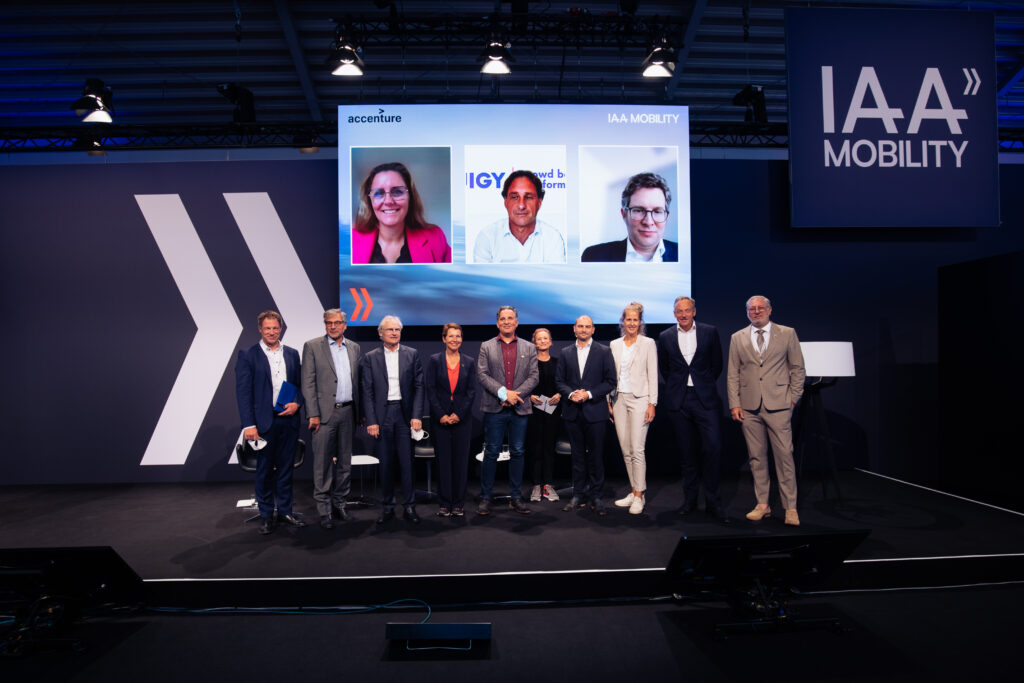
Expert panel of the German-Dutch “Sustainable Mobility” partnership at IAA Mobility in Munich ©IAA
It has been three years since the Federal Government entrusted the National Platform Future of Mobility (NPM) with a mammoth task: to develop recommendations on how we can enable affordable, sustainable and climate-friendly mobility for people and at the same time secure Germany’s competitiveness. And the NPM delivered! It has developed the central foundations for the German government’s climate resolutions. For this, I would like to express my sincere thanks to all those involved. We will continue to need a forum for intensive, science-based discussions in the future, because there is still a lot to do and we are not there yet.
Federal Minister Andreas Scheuer
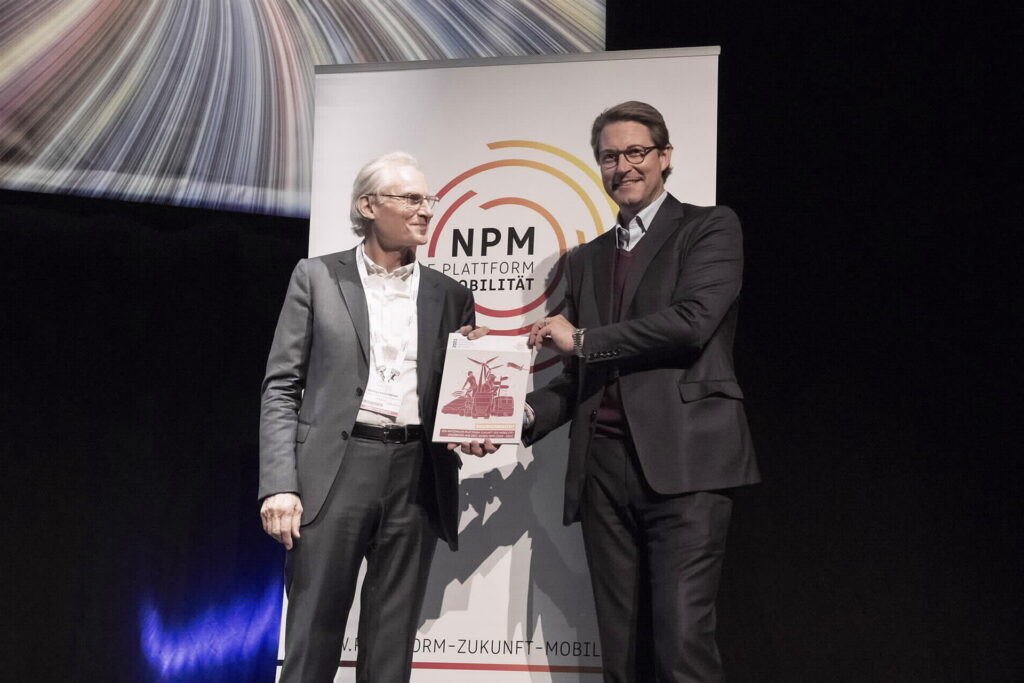
Mobility Data Space

The ITS World Congress in Hamburg was also the venue for the launch of the Mobility Data Space*, a Federal Government initiative that emerged from the “Datenraum Mobilität” project. The data space partners were already able to present some initial use cases at the congress. By enabling secure, trusted data exchange, the Mobility Data Space can help to improve road safety, optimise traffic flows in towns and cities and enhance people’s journey quality thanks to multimodal navigation app solutions. At the same time, the operating company DRM Datenraum Mobilität was established as a non-profit organisation by founding partners Caruso, Deutsche Bahn, Deutsche Post DHL, HERE, HUK-Coburg insurance, Mercedes-Benz, BMW and Volkswagen.
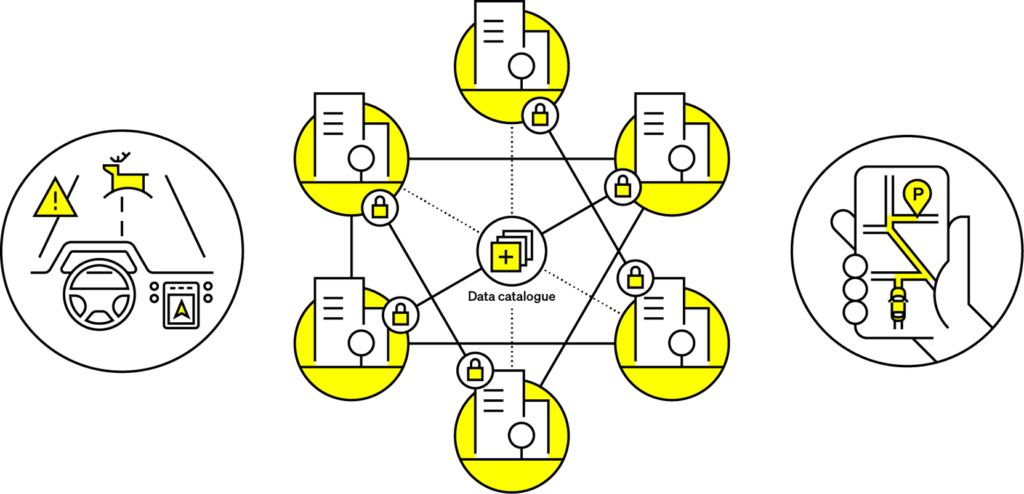
Data is the essential raw material for digital innovations. The Mobility Data Space provides an attractive international standard for exchanging mobility data, based on a strong user community and a comprehensive overview of supply and demand. Start-ups and creatives in particular will benefit from the ability to realise their ideas without having to worry about the big data leeches, and the development of innovative applications will be faster, simpler and cheaper. This will provide a significant boost to digital innovation and unlock the potential that data has to make tomorrow’s mobility safer, more efficient and more sustainable.
Federal Minister Andreas Scheuer
Projects
Publications
- Digitalisierung des Mobilitätssektors – Erfahrungen aus dem Reallabor und abschließende Empfehlungen (final report)*
- Autonomes Fahren als Baustein einer inter- und multimodalen Mobilität (progress report)*
- Schwere Nutzfahrzeuge – Standards und Normen für alternative Antriebe*
- Netzintegration von Elektromobilität – Branchenübergreifender Konsens auf Aufgaben für die 20. Legislaturperiode*
- Impulsbericht 2018 – 2021*
- Quantifizierung von Beschäftigungseffekten durch Leistungselektronik und Brennstoffzellenfahrzeuge*
- Batterierecyclingmarkt Europa: Chance für eine nachhaltige Kreislaufwirtschaft*
- Batterieproduktion für Deutschland und Europa*
- Neue Impulse für Beschäftigung und Qualifizierung im Mobilitätssektor*
- Tomorrow’s mobility – a holistic design. Results from 3 years of the NPM (2018 – 2021)
- Kundenakzeptanz als Schlüssel für den Markthochlauf der Elektromobilität – Ein Forschungsvorhaben der AG 2*
- Standards und Normen für die Mobilität der Zukunft – Ergebnisse der Arbeitsgruppe 6 der NPM 2018-2021*
- Daten und Vernetzung – Standards und Normen für Intermodale Mobilität*
- Mobilitätsbudget und digitalisiertes Parkraummanagement als Befähiger für inter- und multimodale Mobilität*
- Energiewirtschaftliche Auswirkungen der Sektorkopplung – Energiebedarfe*
- Infrastruktur für Wasserstoffmobilität*
- Abschlussbericht: Zentrale Ergebnisse und Empfehlungen – Erreichtes und Offenes*
- acatech HORIZONS: Transforming Mobility
- Wege für mehr Klimaschutz im Verkehr – Abschlussbericht AG 1*
- Roadmap – Markthochläufe alternativer Antriebe und Kraftstoffe aus technologischer Perspektive*
- Ladeinfrastruktur für batterieelektrische Lkw*
- Resilienz der Fahrzeugindustrie: Zwischen globalen Strukturen und lokalen Herausforderungen*
- Positionspapier „Brennstoffzelle“*
- Mit Innovationen Transformation gestalten. Fortschrittsbericht 2020 der Nationalen Plattform Zukunft der Mobilität*
News items
- Grüne Signale für die Schiene – Ansätze aus Deutschland und der Schweiz*
- Führende Mobilitätsanbieter legen Grundstein für Zusammenarbeit im Mobility Data Space*
- Nationale Plattform Zukunft der Mobilität und Mobility Data Space präsentieren sich auf dem ITS World Congress*
- SENAT digital: Einblicke in die Aufbauarbeit des Mobility Data Space*
- IAA-Woche: acatech bringt sich mit Umfragen, Bürgerdialogen, Fachbeiträgen und Praxistests ein*
- Klimaschonend unterwegs: acatech HORIZONTE über eine nachhaltige und gerechte Mobilitätswende*
- Mobility Monitor 2021: Are people in Germany ready for the transition to sustainable mobility?
- Vernetzter Verkehr: acatech initiiert Trägergesellschaft „DRM Datenraum Mobilität GmbH“ als Non-Profit-Organisation*
- Weltfrauentag: acatech forciert Berücksichtigung der Geschlechterdimension in der Beratung*
- Sicherheit beim automatisierten Fahren: Gemeinsam aus Daten zu seltenen Verkehrssituationen lernen*
- Die Zukunft der Luftfahrt*
* Content only available in German
Digital sovereignty: the coronavirus pandemic highlights dependencies
Germany and Europe should have the sovereignty to independently shape technology – particularly digital technology – in line with their own values, building on their own strengths and with a focus on Europe’s social and economic interests. The coronavirus pandemic has demonstrated the benefits of digital solutions and the extent to which they can strengthen the resilience of the education and healthcare systems, public administration and economy during times of crisis. However, in many instances it has also become clear that Germany and Europe have a unilateral dependency on certain technologies and providers, and that it is necessary to further strengthen technology and knowledge transfer.
From the IMPULSE publication: the levels of digital sovereignty
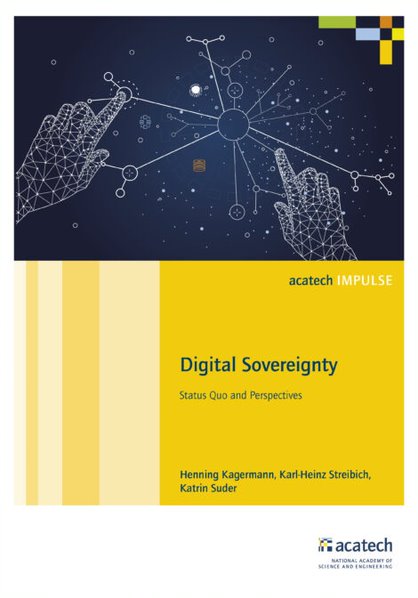
Accordingly, one focus of acatech’s work in 2021 was the development of innovation policy strategies to address these dependencies. A project group led by acatech President Karl-Heinz Streibich and Chairman of the acatech Board of Trustees, Henning Kagermann, developed an eight-layer model that enables a detailed analysis of strengths, weaknesses and practical policy options in the field of digital sovereignty. The experts involved in the project analysed the critical aspects of each layer. At the data space level, for example, they identified an overdependence on US and Chinese digital platforms in the B2C sector, whereas the B2B sector is not yet dominated by US and Chinese competitors. Consequently, the development of sovereign data spaces should be supported and promoted by policymakers.
The GAIA-X initiative is dedicated to the development of an open, transparent data infrastructure in Germany and Europe. acatech has been involved in this initiative from the outset and, in 2021, the Academy took over the coordination of the German Gaia-X hub which coordinates all the stakeholders in Germany. A key part of this work concerns the question of how Gaia-X can also help small and medium-sized enterprises to take advantage of data economy applications.
If Germany and the European Union address the policy priorities of digital sovereignty in a concerted, strategic manner, we will have a good chance of shaping our own digital future, since in the next phase of digitalisation it will be easier for industrial enterprises to adopt digital technology than for digital companies to learn how to create industrial value.
Karl-Heinz Streibich, acatech President and co-author of the acatech IMPULSE “Digital Sovereignty”
Self-learning Systems – the artificial intelligence platform
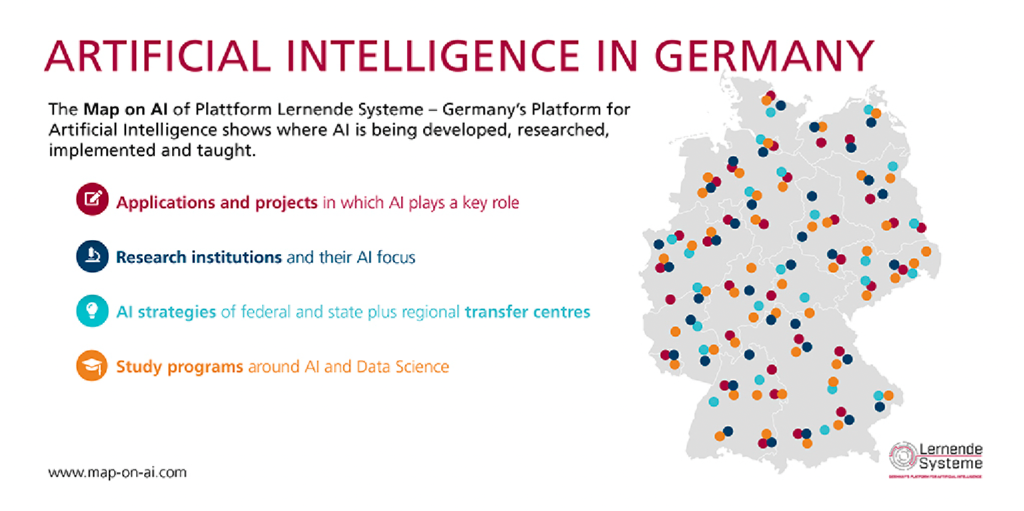
Artificial intelligence (AI) and self-learning systems are transforming our economy and society. They are making our energy supply more sustainable, improving cancer care and optimising production processes. AI systems should be at the service of people. At the Plattform Lernende Systeme (PLS) conference “KI ist Jetzt!” (AI is happening now!) in February 2021, the platform’s co-chairs former Federal Minister of Education and Research, Anja Karliczek, and acatech President Karl-Heinz Streibich both agreed that AI must be developed responsibly if we are to maximise its potential.
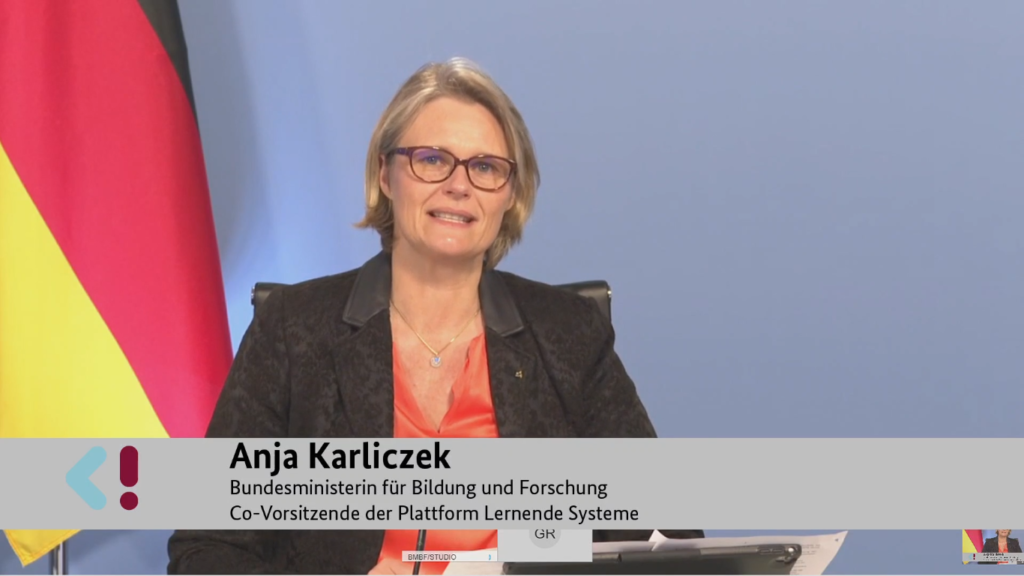
The Plattform Lernende Systeme’s diverse contributions illustrate the full spectrum of opportunities and challenges associated with AI. For example, how self-learning systems can support healthcare and mobility, how businesses can introduce AI and use it to create new business models, or how AI systems can be deployed in a reliable, trusted and secure manner. I would like to thank the members of the Plattform Lernende Systeme for everything they have achieved to date, and for their hard work and voluntary engagement.
Anja Karliczek, former Federal Minister of Education and Research and co-chair of the Plattform Lernende Systeme
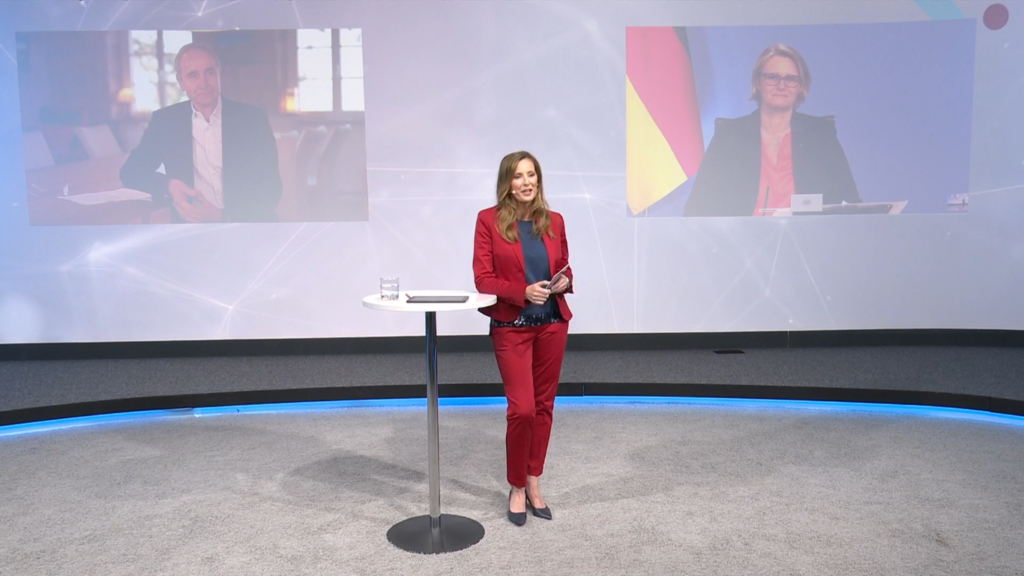
AI systems’ opportunities and risks cannot be properly assessed without a basic understanding of the technology. Yet recent studies have found that many people have only a vague idea of what artificial intelligence actually is. Launched in September 2021, the platform’s “KI Konkret” website* provides an accessible but authoritative introduction to the topic, offering clear explanations about how AI works and the challenges that it poses for society.
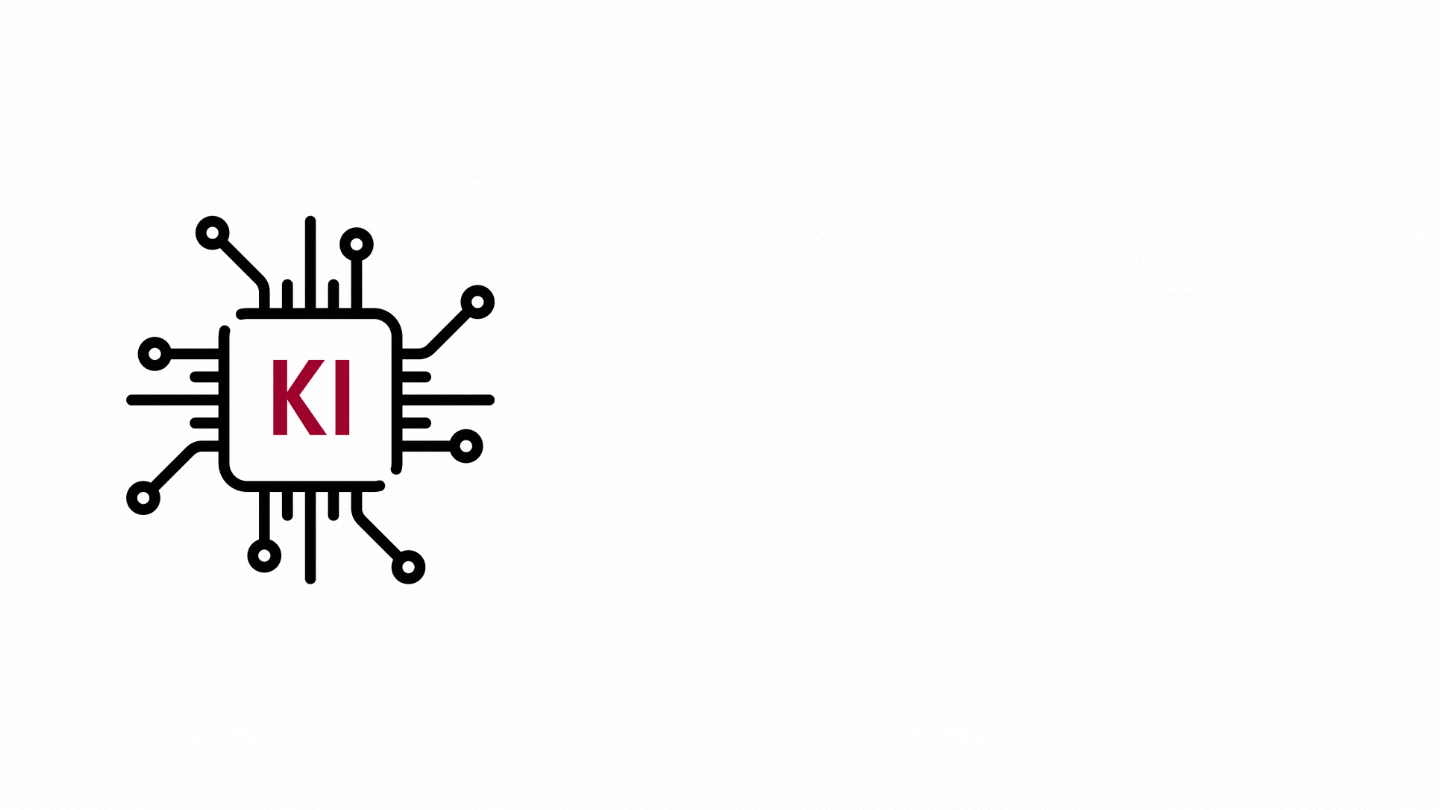
The “Stadt | Land | DatenFluss” app produced by the adult education college association VHS Verband also aims to promote the sovereign use of data and artificial intelligence. The app provides in-depth insights through a series of video interviews with experts from the Plattform Lernende Systeme. The platform has also employed innovative formats to engage directly with the public, such as a fictitious court trial concerning the use of AI to treat cancer and the new “KI.Impulse” web talk series.
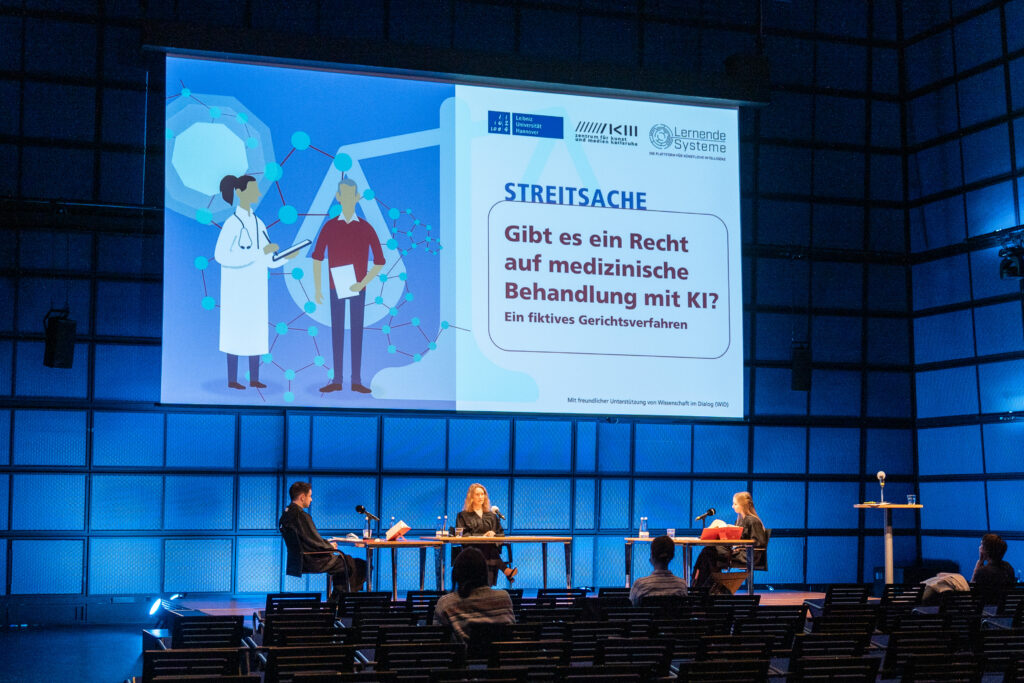
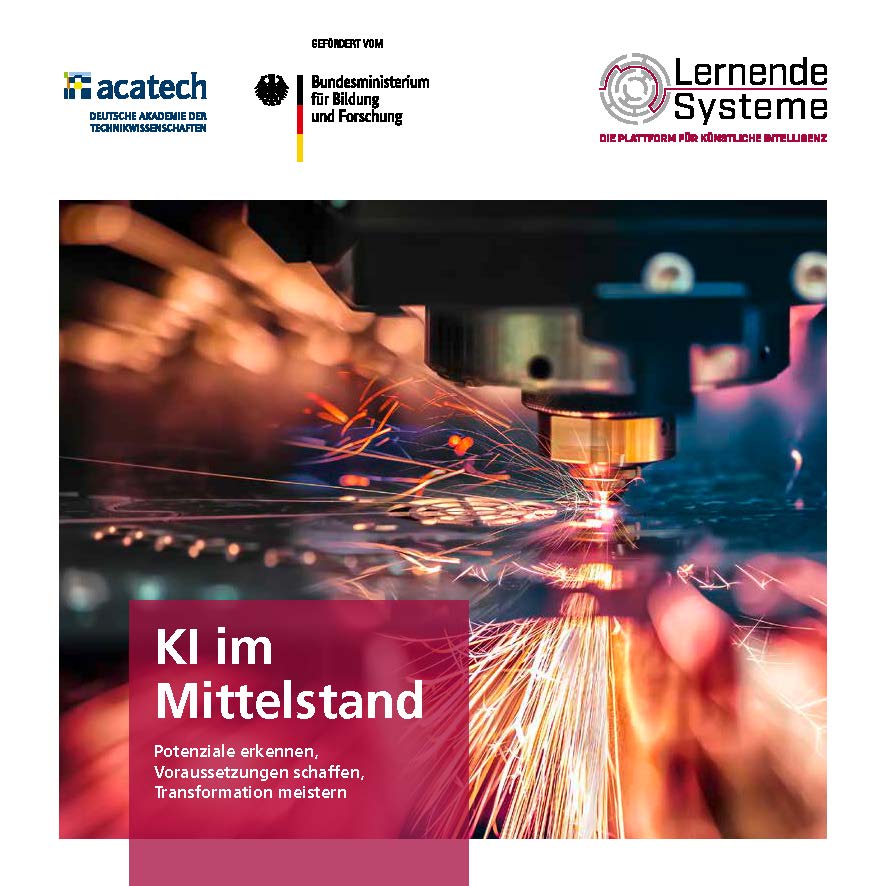
Many companies also lack knowledge about AI. According to the representatives of small and medium-sized enterprises who attended a round table hosted by the PLS in April, they need clearly presented information and examples of how they can use AI in their business. In June, the PLS produced a practical guide for companies in response to this request. The guide features clear case studies and concrete plans for implementing intelligent systems, with the aim of inspiring companies to introduce them in their own businesses. The Plattform Lernende Systeme also developed a website for SMEs containing all the information that small and medium-sized businesses need to introduce and use AI.
What should and shouldn’t AI be allowed to do? Artificial intelligence needs clear ground rules that answer this question. The regulation of AI systems must ensure their quality without holding back innovation. In November, PLS experts contributed to the regulation debate in Europe by publishing a white paper in which they argue that the only way to achieve this is by assessing the risks of AI systems in the context of their specific applications.
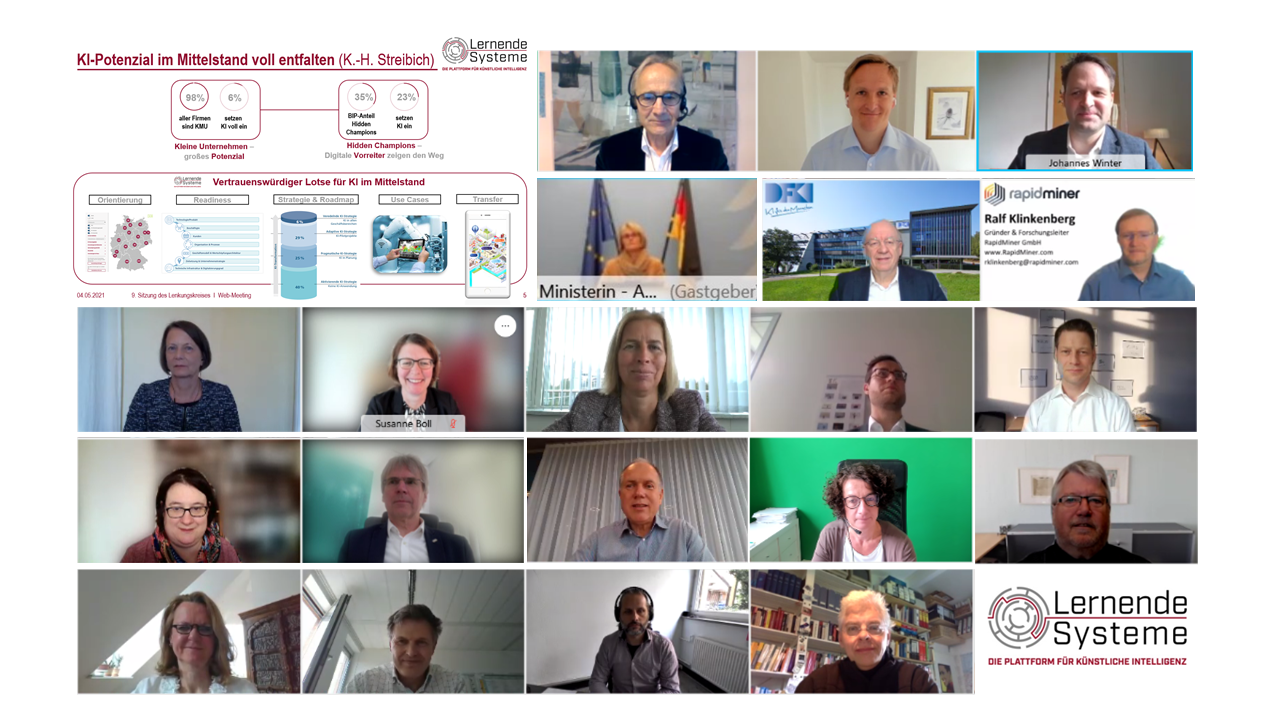
The spring 2021 Steering Committee meeting of the Plattform Lernende Systeme discussed how to unlock the full potential of AI in small and medium-sized enterprises. (Image: PLS)
The Plattform Lernende Systeme is a network of artificial intelligence (AI) experts. It brings together current expertise and acts as an independent broker, promoting interdisciplinary discussions and a dialogue with the public. Almost 200 members from science, industry and civil society formulate positions on the opportunities and challenges of AI and identify policy options for its responsible development. In doing so, they support Germany’s efforts to become a leading provider of trusted AI and the use of this key technology in industry and society as a whole. The Plattform Lernende Systeme was established by the Federal Ministry of Education and Research (BMBF) in 2017 at the instigation of the High-Tech Forum and acatech.
Gaia-X
acatech has been involved in the Gaia-X project since the start of the debate about an open, transparent European data structure. Interoperable, interconnective and modular, Gaia-X is a decentralised, connected ecosystem that connects different digital infrastructures, enabling the emergence of data ecosystems and data spaces linked to advanced smart services. This innovative ecosystem facilitates the growth of new, data-driven business models.
In November 2020, the Federal Ministry for Economic Affairs tasked acatech with the coordination of Germany’s Gaia-X hub. The hub is the point of contact for anyone in Germany with an interest in Gaia-X. In the hub, acatech brings together Gaia-X and related initiatives and organises the communities into domain working groups in order to support the development of data spaces. There are currently ten active domains: Agriculture, Energy, Finance, Geoinformation Systems, Health, Manufacturing, Mobility, Public Sector, Smart City/Smart Region and Smart Living. A key part of their work concerns the question of how Gaia-X can also help small and medium-sized enterprises to take advantage of data economy applications. As an enabling technology, Gaia-X will first and foremost help SMEs to digitalise their products, services and processes.
In 2021, the acatech team worked closely with the Gaia-X hubs of the other EU member states on the structures needed to realise the EU data spaces called for by the European Commission. Gaia-X provides an infrastructure framework that combines openness, transparency and data sovereignty with full data control, so that the full potential of data-driven applications can be unlocked.
Guaranteeing cybersecurity for the future

Inadequate cybersecurity poses a threat to the digital sovereignty of Germany and the EU. The number of cyberattacks is constantly growing as digital technologies continue to develop at lightning speed and larger and larger quantities of data are collected and shared. For private individuals, companies and national governments alike, data is a valuable commodity that must be permanently protected.
This raises several questions, for example about the impact of new technologies like quantum computing, but also about long-term issues such as the resilience of legacy systems or long-term data availability. The legal aspects are also important – long-term compliance rules must be implemented and Germany’s dependence on the laws of other countries must be discussed.
There is always the danger of a successful cyberattack. […] That’s why it’s important to prepare a crisis response in advance in order to minimise the damage.
Arne Schönbohm, President of the Federal Office for Information Security (BSI)
In the project “Cybersicherheit – Status Quo und zukünftige Herausforderungen”*, an acatech team is analysing the current situation in Germany and investigating the extent to which cybersecurity can be quantified. It is also formulating policy options for a strategy that will allow Germany to ensure cybersecurity over the long term. The results will be published by acatech in 2022.
Projects
Publications
- 5G in der Industrie. Wege in die Technologieführerschaft in Produktentwicklung und Produktion*
- Modellierungs- und Simulationsbedarfe der intelligenten Fabrik (expert report)*
- KI-Kompetenzentwicklung bei Sach- und Produktionsarbeit*
- Pandemiefeste Beschäftigung in Produktionsunternehmen (expert report) *
- Kritikalität von KI-Systemen in ihren jeweiligen Anwendungskontexten (white paper)*
- Industrie 4.0-Forschung für die Gestaltung der Zukunft (discussion paper)*
- Competence Development for AI – changes, needs and options for action
- Künstliche Intelligenz zur Umsetzung von Industrie 4.0 im Mittelstand (expert report/guide)*
- AI systems and the individual electoral decision – opportunities and challenges for democracy
- KI und Nachhaltigkeit – Ein Diskussionsbeitrag für die Plattform Lernende Systeme*
- KI im Mittelstand – Potenziale erkennen, Voraussetzungen schaffen, Transformation meistern*
- Secure and safe travel with AI – data management and data security with AI-based travel assistants
- Kommuniqué zum Spitzendialog des Forschungsbeirats*
- Value Networks in Times of Infection Crises (expert report)
- Bringing AI into the application – a joint task for universities, research institutions, companies and government (white paper)
- From a Presence Culture to a Culture of Trust – Seven Theses on Mobile and Hybrid Working Presented by the Human Resources Working Group
- Dynamic Skills Management – Identifying Skills Requirements Early, Devising Tailored Solutions. Practical Guidance from acatech’s Human Resources Working Group
- Engineering in Deutschland – Status quo in Wirtschaft und Wissenschaft. Ein Beitrag zum Advanced Systems Engineering*
- Digital Sovereignty – Status Quo and Perspectives
- Sachbearbeitung und Künstliche Intelligenz: Forschungsstand, Einsatzbereiche und Handlungsfelder*
- Potentials for cross-industry fleet learning – AI mobility data platform for minimizing the risks of automated driving
- Competent in use – variable autonomy of self-learning systems in hostile-to-life environments
News items
- „Die Systeme brauchen einen regelmäßigen TÜV“ – drei Fragen an Prof. Armin Grunwald zum Thema Vertrauenswürdige KI*
- KI in Medizin und Pflege: Chancen verantwortungsvoll nutzen*
- Webtalk: Mit digitalen Lösungen auf dem Weg zur nachhaltigen Produktion*
- Fit für KI? Unternehmen unterschätzen Bedarf an Weiterbildung*
- Webtalk: Wie Nachwuchskräfte von KI profitieren*
- Modellierungs- und Simulationsbedarfe der intelligenten Fabrik – Wie können digitale Methoden die Produktion der Zukunft resilienter machen?*
- KI-Regulierung: Wie sich vertrauenswürdige Systeme gestalten lassen*
- Industrie 4.0-Forschung für die Gestaltung der Zukunft – Neuer Impulsbericht des Forschungsbeirats*
- Industrie 4.0 – Blick zurück und nach vorn*
- Die Zukunft im Blick – acatech Mitglieder erörtern innovationspolitische Themen*
- Führende Mobilitätsanbieter legen Grundstein für Zusammenarbeit im Mobility Data Space*
- Betriebliche Qualifizierung für KI: Plattform Lernende Systeme diskutiert Studienergebnisse*
- SENAT digital: Einblicke in die Aufbauarbeit des Mobility Data Space*
- Fit für KI: Welche Kompetenzen in der Arbeitswelt wichtig werden*
- Gibt es ein Recht auf medizinische Behandlung mit KI?*
- acatech am Dienstag: IT-Expertin Claudia Eckert skizziert neue Sicherheitskultur*
- Künstliche Intelligenz einfach erklärt: Neues Wissensportal „KI Konkret“*
- KI zur Umsetzung von Industrie 4.0 im Mittelstand – Wie der Einsatz anwenderfreundlich gelingen kann*
- Mehr Chancen als Bedrohungen: Künstliche Intelligenz bei Wahlen*
- Sechster Innovationsdialog in der 19. Legislaturperiode: Von der Förderung technologischer Frühbeete zu selbsttragenden Ökosystemen*
- Expertenumfrage: Wie weit sind Unternehmen in der Nutzung und Monetarisierung industrieller Daten?*
- Kommentar des Forschungsbeirats der Plattform Industrie 4.0 zum geplanten Artificial Intelligence Act (AIA) der EU*
- Technologies, research, study programs: Map on AI provides overview of Artificial Intelligence in Germany
- Fabrik der Zukunft: So gelingt die Zusammenarbeit mit intelligenten Robotern*
- Masterstudiengänge zu Data Science: GI und Plattform Lernende Systeme geben Empfehlungen für Ausgestaltung*
- KI im Mittelstand: Roadmaps und Praxisbeispiele für den Einstieg*
- KI einsetzen: Webinar zur erfolgreichen Kooperation zwischen Unternehmen und Hochschulen*
- KI in der Arzneimittelforschung: Workshop diskutiert digitale Werkzeuge*
- Intelligente Reiseplanung: Wie Daten im Mobilitätssystem der Zukunft sicher sind*
- Spitzendialog des Forschungsbeirats veröffentlicht Kommuniqué mit 12 Impulsen für die Zukunft von Industrie 4.0*
- Dialogreihe #DIGITALESHESSEN: Bringt Corona die digitale Medizin?*
- Karl-Heinz Streibich spricht auf dem Wirtschaftstag der Innovationen*
- Publikation „Wertschöpfungsnetzwerke in Zeiten von Infektionskrisen“ – Wie sich Unternehmen für die Zukunft wappnen können*
- KI in die Anwendung bringen: Wissenstransfer als Gemeinschaftsaufgabe*
- Praxis-Workshop für Mittelständler: Industrielle Daten erfolgreich nutzbar machen*
- Zukunft der Digitalisierung: Karl-Heinz Streibich und Plattform-Vorsitzende im Austausch mit Kanzlerin Angela Merkel*
- Lenkungskreis der Plattform Lernende Systeme: Das KI-Potenzial im gesamten Mittelstand entfalten*
- Was unterstützt KMU bei der Einführung von KI? Plattform Lernende Systeme im Austausch mit Mittelständlern*
- KI-Landkarte der Plattform Lernende Systeme: Intelligente Assistenzsysteme führend bei Anwendungen*
- Quantentechnologien – ein Blick in die Zukunft*
- Resilienz als wirtschafts- und innovationspolitisches Gestaltungsziel*
- Industrie 4.0 feiert 10-jähriges Jubiläum – die erste Halbzeit ist geschafft*
- acatech zur Hannover Messe 2021: Digitale Souveränität und zehn Jahre Industrie 4.0*
- Digitale Souveränität: acatech IMPULS entwirft Schichtenmodell als Handlungsrahmen für die EU*
- How AI can support care: Application scenario shows opportunities and limits
- KI ist jetzt: Karl-Heinz Streibich und Bundesministerin Anja Karliczek im Gespräch*
- Forschungsbeirat der Plattform Industrie 4.0 wählt neue wissenschaftliche Sprecher*
- Infineon CEO Reinhard Ploss wird Vizepräsident von acatech*
- KI im Büro: acatech zeigt Anwendungsbeispiele und legt „How-to“ vor*
- Parlamentarische Gesprächsrunde zu Quantentechnologien*
- Der Weg aus der Krise: acatech Webtalk über die Chancen der Digitalisierung für KMU*
- Konferenz „KI ist jetzt“: Plattform Lernende Systeme diskutiert über Voraussetzungen für vertrauenswürdige KI-Systeme*
- Sicherheit beim automatisierten Fahren: Gemeinsam aus Daten zu seltenen Verkehrssituationen lernen*
- Autonom und sicher: Wie Menschen und Roboter in gefährlichen Umgebungen zusammenarbeiten*
- Liebesbeziehung mit einem Roboter?*
- Jahrestreffen der AG-Leitungen: Interdisziplinärer Austausch zu Schwerpunktthemen 2021*
- So lernen Maschinen: Plattform präsentiert Video-Tutorials mit Studierenden*
- Fünfter Innovationsdialog in der 19. Legislaturperiode: Resilienz von Lieferketten und Wertschöpfungsnetzwerken*
- Deutsche Akademie der Technikwissenschaften begrüßt 36 neue Wissenschaftlerinnen und Wissenschaftler*
* Content only available in German
The Research Council of the Plattform Industrie 4.0 (ReCoRD)
The term “Industrie 4.0” celebrated its 10th anniversary in 2021. Wolfgang Wahlster (DFKI), Wolf-Dieter Lukas (BMBF) and Henning Kagermann (acatech) came up with the concept of Industrie 4.0 during a conversation at the Academy’s Berlin office. This led them to establish the initial Industrie 4.0 Working Group with members from science, industry and the trade unions. In 2013, Industrie 4.0 became a key innovation policy project and strategic initiative of the Federal Government when a series of recommendations were presented to the Federal Chancellor at the Hannover Messe. The Plattform Industrie 4.0 was established at the same time to coordinate the initiative.
Since then, the success of this German brand has received much attention and recognition around the world. The Research Council of the Plattform Industrie 4.0 discusses research questions relating to value networks, technological enablers, new methods and tools, and work and society. In 2021, it published a series of expert reports that analyse research and development needs and concrete policy options for science, industry, government and civil society, setting out how everything from micro-enterprises to SMEs and large-scale enterprises can continue the journey towards Industrie 4.0. The expert reports “Value Networks in Times of Infection Crises” and “Pandemiefeste Beschäftigung in Produktionsunternehmen”* address the coronavirus pandemic from a research perspective and outline resilience strategies for future crises. Particular emphasis is placed on supporting small and medium-sized enterprises, which are still lagging behind with the implementation of digitalisation. The expert report “Künstliche Intelligenz zur Umsetzung von Industrie 4.0 im Mittelstand”* aims to help SMEs develop AI expertise, while the expert report “Modellierungs- und Simulationsbedarfe der intelligenten Fabrik”* focuses on the factory of the future.
In the discussion paper “Industrie 4.0-Forschung für die Gestaltung der Zukunft”*, a group of experts from the Research Council of the Plattform Industrie 4.0 analysed the status quo of the Industrie 4.0 research landscape in Germany and formulated five proposals that provide a basis for the ongoing strategic development of research activity in this field.
A high-level virtual debate on Industrie 4.0 held on 16 June 2021 underlined the continued importance of making the transition to Industrie 4.0. Panellists Volkmar Denner (Robert Bosch GmbH), Jörg Hofmann (IG Metall), Cedrik Neike (Siemens AG), Siegfried Russwurm (BDI), Thomas Saueressig (SAP SE) and Manfred Wittenstein (Wittenstein SE) discussed twelve points that are key to success in Industrie 4.0. These were published in a communiqué* that formed the basis of the Plattform Industrie 4.0’s 5-point plan. The discussions will continue in another high-level debate to be held in 2022.
Following on from the high-level debate, the Research Council published a communiqué containing 12 key points for the future of Industrie 4.0 (Source: acatech)
5G in production
The fifth generation mobile communication standard (5G) was a major innovation policy theme in 2021 – yet its importance to industry is still often underestimated. The members of the acatech project “5G in Industry” have no doubt that this technology can take Industrie 4.0 to the next level. The experts highlight the potential of 5G in a report published shortly before Christmas 2021. For example, the best way of remotely analysing an industrial robot’s real-time work status is with a virtual reality application – but acceptable quality and flexibility is only technically feasible with 5G. 5G also makes it easier to connect devices and machines and record and analyse their data with the aid of artificial intelligence. However, small and medium-sized industrial enterprises in particular have been slow to adopt 5G in their businesses. acatech’s 5G working group is helping to identify and overcome barriers and obstacles to the technology’s implementation. According to the group of experts led by acatech Member Jürgen Fleischer, it is time to start a “5G avalanche”.
5G offers lower latency, larger data transfers and higher-precision geolocation than ever before. But because these benefits are currently not transparent enough, industrial enterprises are unable to develop appropriate use cases and assess their financial merits. That’s why we need to try and bring 5G providers and industrial application domains together in a targeted manner so that we can leverage this huge potential.
Project leader and acatech Member Jürgen Fleischer of the Karlsruhe Institute of Technology
But the public debate about 5G has not focused solely on its potential in industry – the technology inevitably also raises questions about Germany’s digital sovereignty. After all, the infrastructure components for 5G are currently supplied by just a handful of producers: the three largest hardware manufacturers, Huawei, Ericsson and Nokia, have a market share of over 75%.
In view of the above, government must move 5G higher up the policy agenda. In their report, the project group members call on policymakers to enable the widest possible access to this technology using sovereign infrastructure.
Advanced Systems Engineering – a new model for the future of engineering
Value creation is being fundamentally transformed by megatrends such as digitalisation and artificial intelligence. Industry is faced with the challenge of realigning itself to reflect these trends. A new model is needed that redefines the collaboration between man, organisation and machine and promotes and organises interdisciplinary working. A working group of the BMBF-funded AdWiSE* project is developing just such a model under the heading of Advanced Systems Engineering (ASE).
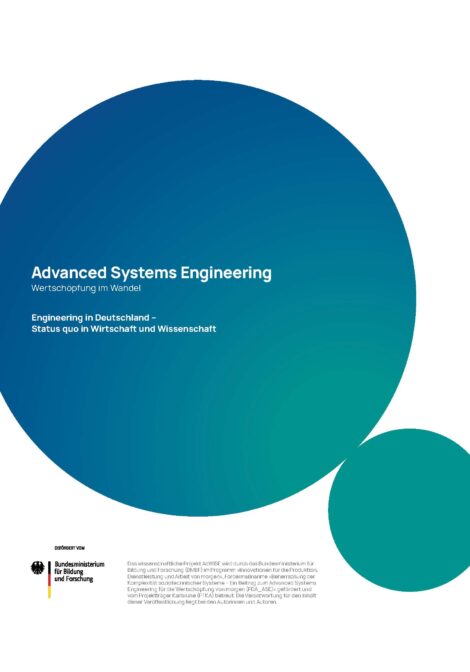
The initiative’s goal is to develop world-leading expertise in Advanced Systems Engineering. Germany can strengthen its global leadership in the field of engineering by combining its advanced engineering know-how with a science-based strategy. The Academy and its partners are currently working on this strategy, which is based on the AdWiSE project’s analysis of the status quo “Engineering in Deutschland – Status quo in Wirtschaft und Wissenschaft”*, published by the project partners in April 2021. The strategy is also informed by future scenarios that have helped to identify the opportunities and threats for engineering in Germany.
In 2022, the working group will present its strategy “Advanced Systems Engineering – Leitinitiative zur Zukunft des Engineerings- und Innovationsstandorts Deutschland” (Advanced Systems Engineering – a key initiative for the future of German engineering and industry).
The goal is to develop world-leading expertise in the engineering of smart, connected products, services and production systems. This strategy will ensure that German industry can professionally develop complex systems that achieve rapid and lasting market success. It will make a key contribution to value creation, prosperity and employment, and help to secure Germany’s place as a centre of innovation and manufacturing.
acatech Vice-President Jürgen Gausemeier
AI systems can also help to reduce administrative workloads
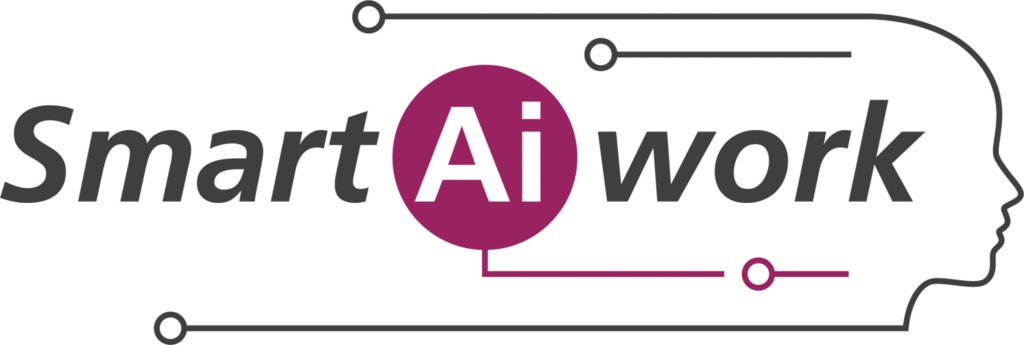
Valuable organisational knowledge can be found lurking in PDFs, Word documents, presentations and databases, while customers’ problems and needs can be extrapolated from their emails to the complaint management department. Yet much of the data that could potentially be processed by businesses and public authorities is unstructured. Filtering out this information is traditionally the job of administrative personnel.
In the joint study “Sachbearbeitung und Künstliche Intelligenz”*, published in early 2021, acatech and its partners show how AI systems can reduce administrative staff’s workload by assisting them with these tasks. The study presents a series of use cases that illustrate the potential applications of AI in offices and public authorities.
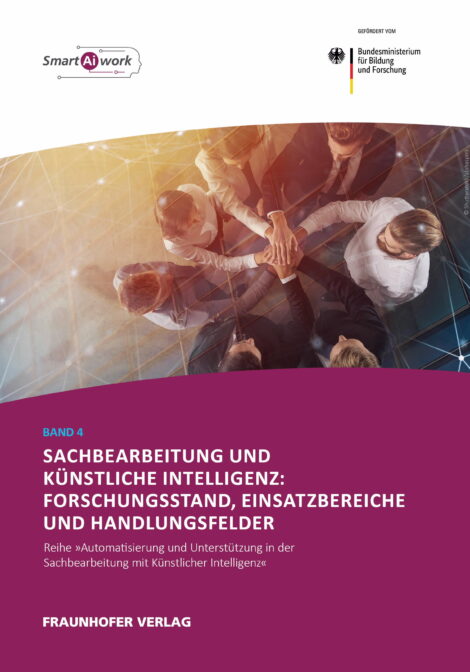
But despite their proven benefits, staff are often sceptical about AI-related changes. Too many employees fear that AI could change their job for the worse or even make it redundant. However, the study concludes that there is no evidence to support the claim that the implementation of AI systems leads to mass redundancies in administration. What is indisputable, on the other hand, is that it entails profound structural changes in the activities performed by human personnel, and that this in turn necessitates changes in their skills and training. In most cases, the use of AI for data analysis purposes will not replace administrative personnel but will instead provide them with additional insights. Moreover, AI can help administrative staff to process far higher numbers of recurring customer enquiries than they could without its support.
In conclusion, AI systems can reduce the workloads and improve the jobs of administrative as well as industrial personnel. The study “Sachbearbeitung und Künstliche Intelligenz” provides guidance on how to introduce these systems in businesses and on the role of employee communication.
At the end of the year, the Plattform Lernende Systeme (PLS) carried out an online survey of businesses to determine the status quo of AI skills development among administrative and production personnel*. Different AI skills are important in different industries and different parts of companies. According to the participants in the survey, this means that if AI systems are to be deployed, there will be a significant need for continuing professional development across all job profiles.
Projects
- The Research Council of the Plattform Industrie 4.0
- AdWiSE – Vernetzung der Akteure zur disziplinübergreifenden Entwicklung komplexer vernetzter sozio-technischer Systeme für die Wertschöpfung von morgen (Advanced Systems Engineering)*
- Lehren der Corona-Pandemie: Wie das Gesundheitswesen resilienter und leistungsfähiger werden kann*
Publications
- 5G in der Industrie. Wege in die Technologieführerschaft in Produktentwicklung und Produktion*
- Modellierungs- und Simulationsbedarfe der intelligenten Fabrik*
- KI-Kompetenzentwicklung bei Sach- und Produktionsarbeit*
- Pandemiefeste Beschäftigung in Produktionsunternehmen*
- Kritikalität von KI-Systemen in ihren jeweiligen Anwendungskontexten (white paper)*
- Industrie 4.0-Forschung für die Gestaltung der Zukunft (discussion paper)*
- Standards und Normen für die Mobilität der Zukunft – Ergebnisse der Arbeitsgruppe 6 der NPM 2018-2021*
- Competence development for AI – Changes, needs and options for action
- Künstliche Intelligenz zur Umsetzung von Industrie 4.0 im Mittelstand (expert report/guide)*
- AI systems and the individual electoral decision – opportunities and challenges for democracy
- KI und Nachhaltigkeit – Ein Diskussionsbeitrag für die Plattform Lernende Systeme*
- KI im Mittelstand – Potenziale erkennen, Voraussetzungen schaffen, Transformation meistern*
- Secure and safe travel with AI – data management and data security with AI-based travel assistants
- Kommuniqué zum Spitzendialog des Forschungsbeirats*
- Value Networks in Times of Infection Crises (expert report)
- Bringing AI into the application – a joint task for universities, research institutions, companies and government (white paper)
- Engineering in Deutschland – Status quo in Wirtschaft und Wissenschaft. Ein Beitrag zum Advanced Systems Engineering*
- Sachbearbeitung und Künstliche Intelligenz: Forschungsstand, Einsatzbereiche und Handlungsfelder*
- Potentials for cross-industry fleet learning – AI mobility data platform for minimizing the risks of automated driving
- Competent in use – variable autonomy of self-learning systems in hostile-to-life environments
News items
- „Die Systeme brauchen einen regelmäßigen TÜV“ – drei Fragen an Prof. Armin Grunwald zum Thema Vertrauenswürdige KI*
- KI in Medizin und Pflege: Chancen verantwortungsvoll nutzen*
- Webtalk: Mit digitalen Lösungen auf dem Weg zur nachhaltigen Produktion*
- acatech heißt 22 neue Mitglieder willkommen*
- Fit für KI? Unternehmen unterschätzen Bedarf an Weiterbildung*
- Webtalk: Wie Nachwuchskräfte von KI profitieren*
- Modellierungs- und Simulationsbedarfe der intelligenten Fabrik – Wie können digitale Methoden die Produktion der Zukunft resilienter machen?*
- Was ist Technik – und was ist der Mensch? Der Mensch im Spiegel der Technik*
- Pandemiefeste Beschäftigung in Produktionsunternehmen – Wie man sich auf Infektionskrisen vorbereiten kann*
- KI-Regulierung: Wie sich vertrauenswürdige Systeme gestalten lassen*
- Industrie 4.0-Forschung für die Gestaltung der Zukunft – Neuer Impulsbericht des Forschungsbeirats*
- Betriebliche Qualifizierung für KI: Plattform Lernende Systeme diskutiert Studienergebnisse*
- Fit für KI: Welche Kompetenzen in der Arbeitswelt wichtig werden*
- Gibt es ein Recht auf medizinische Behandlung mit KI?*
- acatech am Dienstag: IT-Expertin Claudia Eckert skizziert neue Sicherheitskultur*
- Künstliche Intelligenz einfach erklärt: Neues Wissensportal „KI Konkret“*
- Sprecher des Forschungsbeirats in Programmbeirat „Zukunft der Wertschöpfung“ des BMBF berufen*
- KI zur Umsetzung von Industrie 4.0 im Mittelstand – Wie der Einsatz anwenderfreundlich gelingen kann*
- Mehr Chancen als Bedrohungen: Künstliche Intelligenz bei Wahlen*
- Kommentar des Forschungsbeirats der Plattform Industrie 4.0 zum geplanten Artificial Intelligence Act (AIA) der EU*
- Ann-Kristin Achleitner ist neue Vizepräsidentin von acatech*
- Fabrik der Zukunft: So gelingt die Zusammenarbeit mit intelligenten Robotern*
- acatech Expertinnen und Experten diskutieren neue Wege für Qualifizierung*
- Technologies, research, study programs: Map on AI provides overview of Artificial Intelligence in Germany
- KI im Mittelstand: Roadmaps und Praxisbeispiele für den Einstieg*
- KI einsetzen: Webinar zur erfolgreichen Kooperation zwischen Unternehmen und Hochschulen*
- KI in der Arzneimittelforschung: Workshop diskutiert digitale Werkzeuge*
- Schule – Digitalisierung – Corona: Was tun?!*
- Intelligente Reiseplanung: Wie Daten im Mobilitätssystem der Zukunft sicher sind*
- Spitzendialog des Forschungsbeirats veröffentlicht Kommuniqué mit 12 Impulsen für die Zukunft von Industrie 4.0*
- Zwei Publikationen zum Leitbild für das Engineering von morgen veröffentlicht*
- TechnikRadar 2021 – Einblicke in die Zukunft der Gesundheit*
- TechnikRadar 2021: Digitalisierung ändert das Arzt-Patienten-Verhältnis*
- Publikation „Wertschöpfungsnetzwerke in Zeiten von Infektionskrisen“ – Wie sich Unternehmen für die Zukunft wappnen*
- KI in die Anwendung bringen: Wissenstransfer als Gemeinschaftsaufgabe*
- Praxis-Workshop für Mittelständler: Industrielle Daten erfolgreich nutzbar machen*
- Zukunft der Digitalisierung: Karl-Heinz Streibich und Plattform-Vorsitzende im Austausch mit Kanzlerin Angela Merkel*
- 5G – Entscheidungen zwischen Visionen und Vorbehalten*
- Lenkungskreis der Plattform Lernende Systeme: Das KI-Potenzial im gesamten Mittelstand entfalten*
- Was unterstützt KMU bei der Einführung von KI? Plattform Lernende Systeme im Austausch mit Mittelständlern*
- KI-Landkarte der Plattform Lernende Systeme: Intelligente Assistenzsysteme führend bei Anwendungen*
- Neue Engineering-Ansätze für den Innovationsstandort Deutschland*
- Industrie 4.0 feiert 10-jähriges Jubiläum – die erste Halbzeit ist geschafft*
- acatech zur Hannover Messe 2021: Digitale Souveränität und zehn Jahre Industrie 4.0*
- How AI can support care: Application scenario shows opportunities and limits
- KI ist jetzt: Karl-Heinz Streibich und Bundesministerin Anja Karliczek im Gespräch*
- Forschungsbeirat der Plattform Industrie 4.0 wählt neue wissenschaftliche Sprecher*
- KI im Büro: acatech zeigt Anwendungsbeispiele und legt „How-to“ vor*
- Advanced Systems Engineering – Ein neues Leitbild für das Engineering von morgen*
- Konferenz „KI ist jetzt“: Plattform Lernende Systeme diskutiert über Voraussetzungen für vertrauenswürdige KI-Systeme*
- „Sauba derbleckt!“ – noamoi digital für dahoam*
- Sicherheit beim automatisierten Fahren: Gemeinsam aus Daten zu seltenen Verkehrssituationen lernen*
- acatech am Dienstag: Was ist Wissenschaft?*
- Autonom und sicher: Wie Menschen und Roboter in gefährlichen Umgebungen zusammenarbeiten*
- Liebesbeziehung mit einem Roboter?*
- Jahrestreffen der AG-Leitungen: Interdisziplinärer Austausch zu Schwerpunktthemen 2021*
- So lernen Maschinen: Plattform präsentiert Video-Tutorials mit Studierenden*
* Content only available in German
The advice that acatech provides to policymakers and the public in the fields of work and education focuses on three main themes: personal autonomy and responsibility, lifelong learning and modern STEM education.
In the future, innovative ways of working will be characterised by a strong emphasis on individual employee choice and responsibility, agility and new forms of human-machine interaction.
Training is key to the digital transformation, and Germany still has much to do in this respect, especially in the field of lifelong learning.
Modern STEM (Science, Technology, Engineering and Mathematics) education is key to providing young people with the skills they need to help shape social and technological change in an informed, self-determined and responsible manner. Schools, universities and extracurricular settings must make the leap into the digital age as quickly as possible.
In the light of recent developments, another key theme in 2021 was the question of how the coronavirus crisis is changing the worlds of education and work, both in the short term at times of high infection rates, and in the medium and long term.
The future of work: HR Working Group proposals stimulate debate
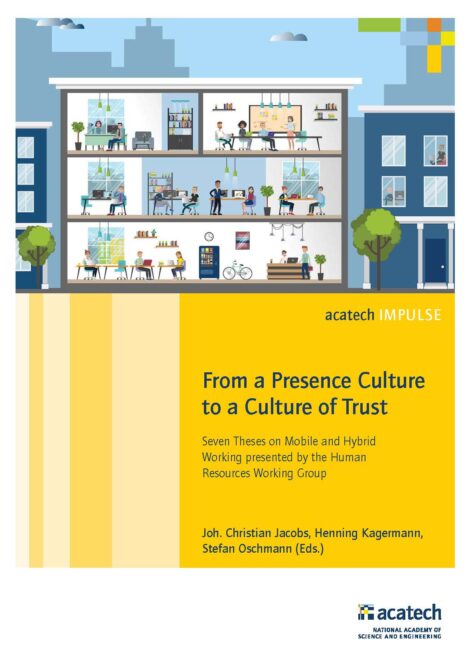
Many employees in Germany were using hybrid working models in 2021. The exceptional circumstances of the last couple of years have accelerated changes that will bring about a long-term transformation of the world of work. acatech’s Human Resources (HR) Working Group – which comprises HR directors from leading technology companies and service providers together with members of the academic community – has been analysing these changes in detail since the beginning of the coronavirus pandemic. In spring 2021, it formulated seven proposals for ensuring good working conditions and enabling creative and productive work in mobile working environments and hybrid models.
The HR Working Group experts have no doubt that these models will remain an integral part of the world of work even once the pandemic is over. Consequently, the discussion of what management should look like in the future must begin today.
Hybrid working models don’t require less management, but they do call for a re-evaluation of the role of managers and the value added by management. In the future, managers will still define rules and structures. At the same time, however, decision-making powers and responsibility must be credibly delegated and employees must be given enough freedom to perform their duties. The ultimate goal should be to strike a productive balance between transparency and control.
Ergonomist, former acatech President and HR Working Group member, Dieter Spath
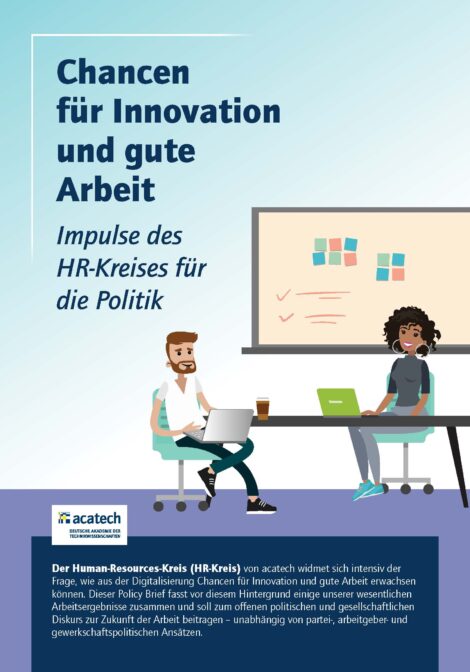
Published in November 2021, the policy brief “Chancen für Innovation und gute Arbeit”* (Opportunities for Innovation and Good Jobs) contains further recommendations on shaping the workplaces of the future. The priority areas identified by the HR Working Group’s members are promoting lifelong learning, strengthening company and employee flexibility and guaranteeing co-determination and worker participation. acatech Vice-President and host of the HR Working Group meetings, Stefan Oschmann, believes that there are particularly significant opportunities in the last of these areas:
The coronavirus pandemic has shown that Germany can do innovation. Companies that are able to adapt rapidly to new market conditions or crisis situations and employees who can take advantage of individual freedoms were and continue to be key. It is therefore vital to promote a culture of worker participation that creates these conditions by exploring alternative forms of co-determination in dialogue with the social partners and leveraging the opportunities of the digital transformation.
Stefan Oschmann, acatech Vice-President and host of the HR Working Group meetings
Stefan Oschmann and the policy brief’s co-authors hosted a discussion of their proposals in a virtual event at the end of December. The aim of this event and the other work carried out by the HR Working Group is to stimulate an open policy and public debate about the future of work.
STEM education: acatech’s Barometer of Young Talents in the STEM subjects highlights problematic areas
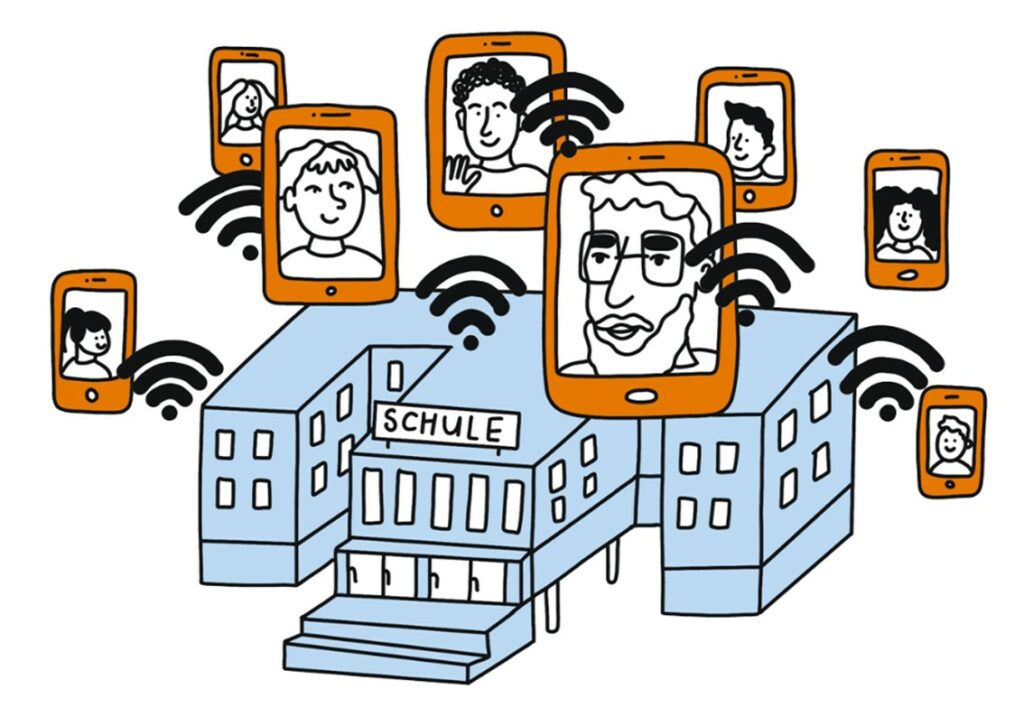
The events of 2021 underlined the importance of STEM education. Education in science and engineering is vital not only for combatting the coronavirus pandemic and adapting to changes in infection rates, but also for tackling climate change and ensuring freedom of choice in the digital transformation. The 2021 edition of the Barometer of Young Talents in the STEM subjects, which is published by acatech and the Körber Foundation, highlighted various problems with STEM education in Germany.
According to the Barometer of Young Talents, too many students in Germany are underperforming in the STEM subjects. The level attained by primary school children is below the EU and OECD average, and around a quarter of children fail to acquire the mathematics skills that they will require in secondary school. The percentage of children failing to attain the necessary standard in science – which is taught in general knowledge classes at primary level – has actually risen since 2015. According to project leader Olaf Köller, this situation can be turned around by making greater use of digital education methods.
Digital education methods must continue to be developed for the times when STEM subjects have to be taught during lockdown. In addition to teacher training, it will also be vital to invest in and develop intelligent tutoring systems (ITS) that can provide invaluable support for children with learning difficulties.
Olaf Köller, acatech Member and Managing Director of the Leibniz Institute for Science and Mathematics Education (IPN)
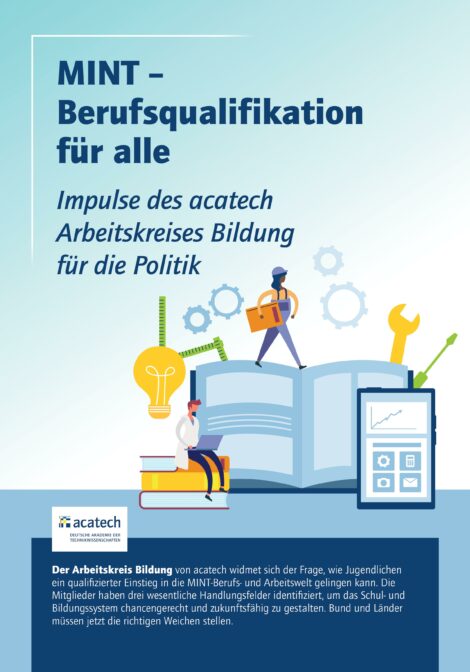
The low standard of STEM education also poses problems for the apprenticeship market in Germany – one in five STEM apprenticeships are terminated because the apprentice lacks the necessary basic knowledge or because their knowledge is not a good match for their job requirements. According to a working group led by acatech Member Kristina Reiss, this is unacceptable, not least in the context of demographic change and the decline in the working population. In the policy brief “MINT-Berufsqualifikation für alle. Impulse des acatech Arbeitskreises Bildung für die Politik”*, the authors present a series of education policy options aimed at helping young people acquire the skills they need to enter the STEM professions and job market.
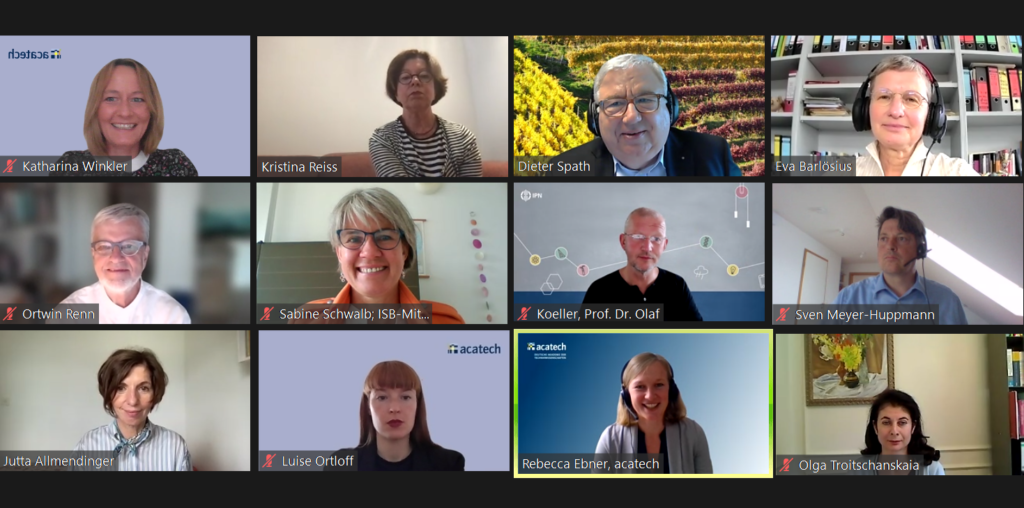
Projects
Publications
- Chancen für Innovation und gute Arbeit. Impulse des HR-Kreises für die Politik*
- From a Presence Culture to a Culture of Trust – Seven Theses on Mobile and Hybrid Working Presented by the Human Resources Working Group
- MINT Nachwuchsbarometer 2021*
- Dynamic Skills Management – Identifying Skills Requirements Early, Devising Tailored Solutions. Practical Guidance from acatech’s Human Resources Working Group
- Sachbearbeitung und Künstliche Intelligenz: Forschungsstand, Einsatzbereiche und Handlungsfelder*
News items
- Webtalk: Wie Nachwuchskräfte von KI profitieren*
- Digitalisierung der Arbeitswelt: HR-Kreis debattiert unterschiedliche Perspektiven*
- Dialogreihe #DIGITALESHESSEN: Frauen in der digitalen Gesellschaft – was ändert Corona?*
- HR-Kreis zeichnet Pfade in die Arbeitswelt der Zukunft vor*
- acatech Expertinnen und Experten diskutieren neue Wege für Qualifizierung*
- Schule – Digitalisierung – Corona: Was tun?!*
- HR Working Group publishes seven proposals on work after Covid
- MINT Nachwuchsbarometer 2021: Zu viele Ausbildungsabbrüche im MINT-Bereich*
- Technikwissenschaftlerinnen fördern: Theresa Madreiter gewinnt den Schnieder-Preis JUNGE MACHERIN*
- Identifying skills requirements early: HR Working Group presents new approach
- “Eine Entscheidung für mobiles Arbeiten muss im Dialog getroffen werden”*
- Mobiles und hybrides Arbeiten: HR-Kreis gibt Empfehlungen*
- KI im Büro: acatech zeigt Anwendungsbeispiele und legt „How-to“ vor*
- Vorher ist man immer schlauer: Wo und wem nützt Predictive Maintenance?*
* Content only available in German
acatech is the voice of technological sciences at home and abroad and maintains relations with academies of sciences and technology, foundations, think tanks and other institutions throughout Europe and the rest of the world. This dialogue allows acatech to promote the topics it is working on to an international audience and enrich its own work with input from other countries. In 2021, the Academy’s international cooperation activities focused on education and knowledge, energy and innovation, as well as Industrie 4.0.
Providing advice to policymakers and the public in Europe
Euro-CASE
acatech is a member of the European umbrella organisation Euro-CASE that brings together 22 academies of science and technology with more than 6,000 experts. acatech President Johann Dietrich Wörner is a member of the Euro-CASE Board. Through its European expert platforms, Euro-CASE works on topics such as innovation, climate and energy policy, the future of work and, more recently, the consequences of the coronavirus pandemic. It also represents the European technological sciences in the SAPEA (Science Advice for Policy by European Academies) project.
Euro-Case organises together with the US National Academy of Engineering (NAE) the annual EU-US Frontiers of Engineering symposium to promote transatlantic cooperation. The symposium provides young engineers from Europe and the US with an opportunity to discuss possibilities for a more efficient usage of innovative technologies for the benefit of society. In 2021, the NAE organised an online symposium for young engineering professionals on the resiliency of electric power grids and the potential applications of machine learning.
Hosted by the UK’s Royal Academy of Engineering, the 2021 Euro-CASE Annual Conference took place as an online event in November 2021. The theme of the conference was “Engineering to build back better”. Among the guest speakers was acatech Vice-President and economist Christoph M. Schmidt, who delivered a keynote on the subject of “Engineering for net zero”. In his speech, he highlighted technological solutions for enabling the transition from an industrialised society to a sustainable, climate-neutral society.
SAPEA – Science Advice for Policy by European Academies
The five European Academy Networks Academia Europaea, ALLEA, EASAC, Euro-CASE and FEAM bring together the expertise of more than a hundred academies in over forty countries across Europe. Through the SAPEA (Science Advice for Policy by European Academies) project, they are part of the European Commission’s Scientific Advice Mechanism (SAM). The SAPEA project is funded through Horizon 2020 and is coordinated by acatech. The aim is to incorporate scientific findings more efficiently and at an early stage into the political decision-making process at the European level.
The European Commissioners ask the Group of Chief Scientific Advisors questions on scientific issues that are relevant for policy making. The academies compile the available knowledge in reports and develop evidence-based recommendations for political action – interdisciplinary, independent, and according to the best available scientific data. The SAPEA Evidence Review Reports provide the scientific basis for the Opinions presented by the Group of Chief Scientific Advisors to the European Commission.
In 2021, SAPEA published the Evidence Review Report “A Systemic Approach to the Energy Transition in Europe”, which followed the systematic approach developed by the German Academies’ Project “Energy Systems of the Future”. The SAPEA Working Group was co-chaired by acatech Vice-President Christoph M. Schmidt and Peter Lund from Denmark. The Working Group’s findings and the recommendations of the Advisors inform the concrete implementation of the European Green Deal and the EU’s “Fit for 55” strategy.
The academies’ experts also worked on a SAPEA Evidence Review Report in connection with the review of the EU’s cancer screening guidelines, and on the topic of “Strategic crisis management in the EU, Improving EU crisis prevention, preparedness, response and resilience”.
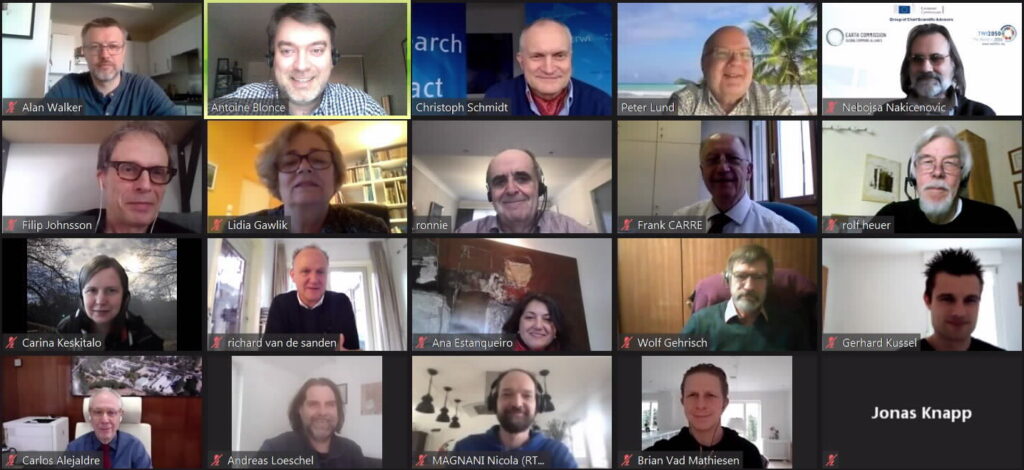
SAPEA also expanded its podcast series that provides information on topical scientific issues and policy advice formats such as the Innovation Dialogue with the German government, which is coordinated by acatech.
Collaboration with Re-Imagine Europa
The Academy also cooperated with the nonpartisan think tank Re-Imagine Europa (RIE) on the European Green Deal and implementation of the European Commission’s Farm to Fork Strategy. The Brussels-based think tank was established by former French president Valéry Giscard d’Estaing as an incubator for new political ideas. RIE aims to develop a shared vision for Europe that includes the views and ideas of the general public.
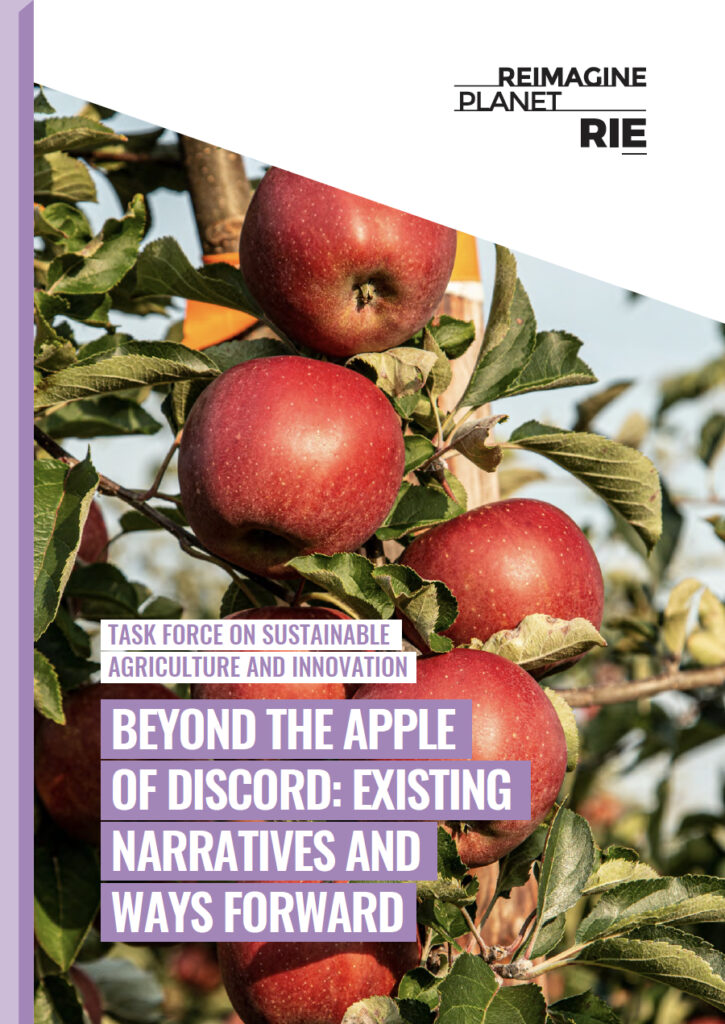
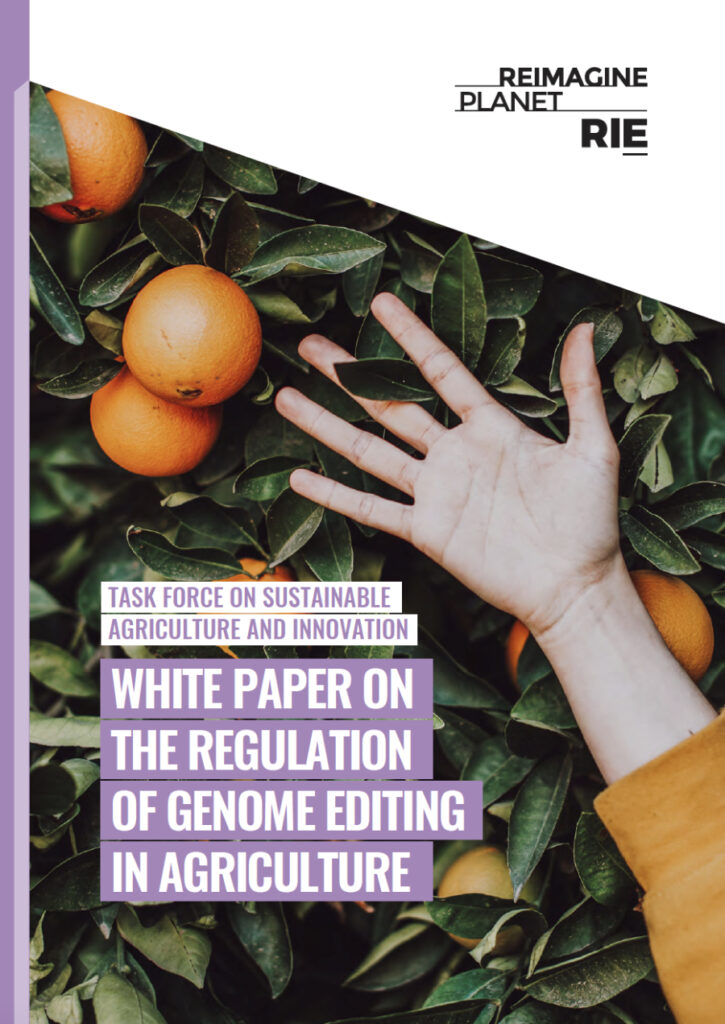
In 2021, Re-Imagine Europa’s new Task Force on “Sustainable Agriculture and Innovation” investigated the complex relationship between technology and natural ecosystems. The Task Force began by developing a shared definition of “sustainable agriculture”, before going on to examine the technological innovations that could help to make agriculture in Europe more sustainable. The outputs from the Task Force’s first year of work were published in the RIE report “Beyond the Apple of Discord: Existing Narratives and Ways Forward” and in the “White Paper on the Regulation of Genome Editing in Agriculture”.
Global cooperation
Ever since it was founded, acatech has been a member of the International Council of Academies of Engineering and Technological Sciences (CAETS). CAETS is an international association of 31 national academies of engineering and technological sciences. The 8,000 experts in this interdisciplinary network develop solutions to global challenges, formulate evidence-based principles to underpin policy decisions, promote public acceptance of technology and improve engineering education around the world.
Since being elected to the Board of Directors of CAETS in October 2020, acatech Member Ulrich Wagner has been participating in shaping the organisation’s strategic direction. At the 2021 CAETS Symposium on “The Future of Energy”, he presented greenhouse gas emission trends in Germany and described what the energy mix might look like in 2050. Initiated by the academies in order to foster scientific and technical communication , the first ever CAETS Communication Prizes were awarded at the 2021 CAETS Annual Convocation.
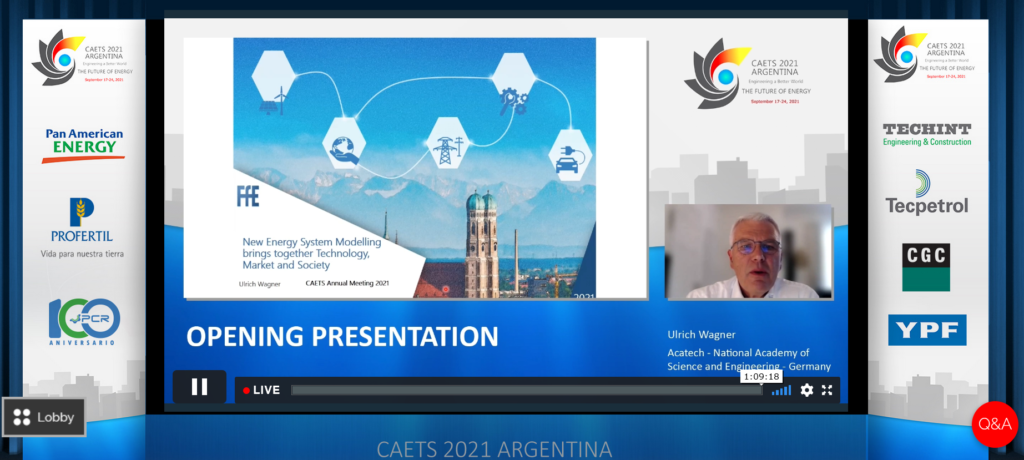
CAETS 2021 Annual Symposium: Opening ceremony of the two-day symposium on The Future of Energy (Image: acatech, Diana Xu)
During 2021, acatech Members also contributed to the working group drafting the CAETS Energy Report “Decarbonising End-Use Sectors”, due to be published in 2022, and to the working group on the Sustainable Development Goals (SDGs). Following in-depth discussion of sustainable development issues, this working group drafted an official statement for the 2021 UN Climate Change Conference in Glasgow (COP26).
Climate change was also on the agenda when a Chinese delegation visited Berlin. The former Chinese ambassador to Germany, Shi Mingde, and Vice-Chairman of the Chinese People’s Consultative Conference and Chinese Minister of Science and Technology from 2007 to 2018, Wan Gang, met with acatech President Johann-Dietrich Wörner, Chairman of the acatech Board of Trustees, Henning Kagermann, and acatech Members Frank Behrendt and Werner Hufenbach to explore opportunities for cooperation in the fields of energy and mobility innovation.
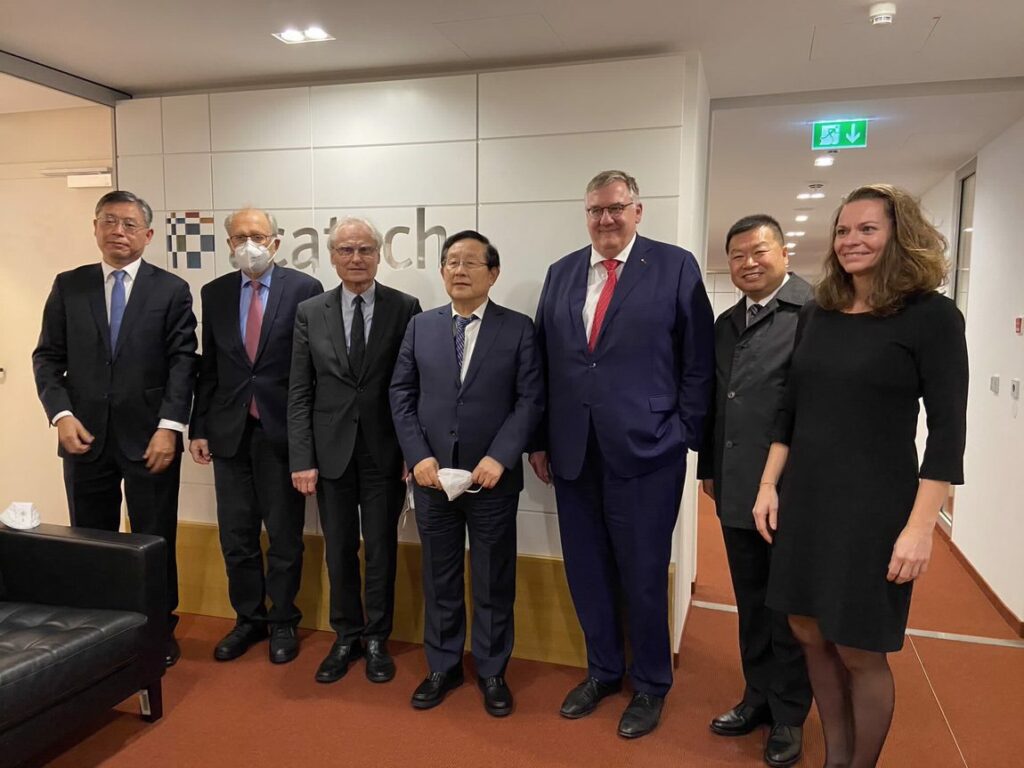
A Chinese delegation visited acatech’s Berlin office: (left to right) Shi Mingde, Werner Hufenbach, Henning Kagermann, Wan Gang, Frank Behrendt, Mo Fan, Karen Wagner (Image: acatech, Leon Philipp Niemeyer)
Publications
Employees
Employees
Members
Members
Senat members
Senat members
Executive Board & Management Board
Executive Board & Management Board
Board of Trustees
Board of Trustees
Members
acatech’s Members are scientists from the fields of engineering, the applied sciences, the humanities, economics and the social sciences. They are invited to join the Academy on the basis of their outstanding scientific achievements. acatech had a total of 616 Members as of December 2021. The General Assembly elected 22 new scientists to the Academy on 19 October 2021.
At their annual meeting*, acatech’s members set the course for acatech’s future development and the themes of the Academy’s work. Their discussions focused on interdisciplinary collaboration and innovation policy ideas for the next few years, while the newly elected members had the opportunity to introduce themselves and their research.
Members adopt more flexible cooperation arrangements
The Members also adopted a number of changes to acatech’s statutes. It was decided that, even once the coronavirus pandemic is over, the option of holding the General Assembly as a hybrid event should be retained and that, in this event, Members should be able to cast their votes electronically. Members can now also submit their votes in writing in advance of the General Assembly. Another change adopted at the meeting is that acatech’s Management Board will in future consist of the two Presidents and the Academy’s Managing Director. These changes to the statutes came into effect when they were recorded in the Register of Associations at the start of 2022.
New ordinary acatech Members in 2021
- Prof Dr.-Ing. Alin Albu-Schäffer
- Prof. Dr.-Ing. habil. Thomas Becker
- Prof. Dr. Alena Buyx
- Prof. Dr. Michael Decker
- Prof. Dr. Prof. h.c. Andreas Dengel
- Prof. Dr. habil. Andreas Dreizler
- Prof. Dr. Xinliang Feng
- Prof. Dr. Markus Gross
- Prof. Dr. Ralph Hertwig
- Prof. Dr.-Ing. Viktor Mechtcherine
- Prof. Dr. Klaus-Robert Müller
- Prof. Dr. Barbara Prainsack
- Prof. Dr.-Ing. habil. Ralf Takors
- Prof. Dr. Jianwei Zhang
- Prof. Dr. Oliver Zielinski
- Prof. Dr.-Ing. Martina Zimmermann
New associate acatech Members in 2021
acatech Members who passed away
- Prof. Dr.-Ing. Harald Bolt
- Prof. Dr. Dr. Henning M. Beier
- Prof. em. Dr.-Ing. habil. Wolfgang Fratzscher
- Prof. Dr.-Ing. Horst Gerhardt
- Prof. Dr. ir. Fred van Houten
- Prof. Dr.-Ing. Dr.-Ing. E. h. Franz Mayinger
- Prof. Dr.-Ing. Günter Pritschow
- Prof. Dr. Jörn Thiede
- Prof. Dr. Reinhold Nickolaus
Senate
acatech’s Senate forms the second pillar of the Academy, alongside the Members. The Senate includes leading figures from technology companies, associations, societies and government, as well as the presidents of the major science organisations. The members of the Senate advise the Academy on strategic issues and complement its scientific expertise with a practical, business-focused perspective. They are supported by the “Paten- und Kommunikationskreis”, a network of staff appointed by the Senate.
The new “SENAT digital” event series launched in autumn 2021 offers Senate members the opportunity to discuss topical issues in science, industry, civil society and government. Held in September, the first event was a discussion of digital sovereignty* led by acatech President Karl-Heinz Streibich. This was followed by an event at the end of the year in which the Senate members discussed the outlook for quantum computing. Further events are planned for 2022.
The acatech Senate comprised 104 members as of 31 December 2021.
New Senate members in 2021
Executive Board and Management Board
acatech’s Executive Board is responsible for the Academy’s strategic management and for representing it externally. Its members are elected from the members of the General Assembly and the Senate, ensuring that the Executive Board represents both pillars of the Academy. The Executive Board includes acatech’s Presidents and Vice-Presidents, as well as its Managing Director and the scientific President’s representative, both of whom serve as non-voting members. In March 2022, Karl-Heinz Streibich handed over the Presidency of the Academy’s business side to Reinhard Ploss after serving in this role since 2018, while Jan Wörner took over from Diether Spath as the scientific President in March 2021. As of 31.12.2021, acatech’s Executive Board comprised a total of 21 members (18 of whom are voting members). An operational management committee is elected from among the Executive Board’s members to prepare the meetings and decisions of acatech’s Executive Board. The Academy’s Management Board consists of the two Presidents and the Managing Director. Ann-Kristin Achleitner and Reinhard Ploss were elected to the operational management committee in 2021.
New Executive Board members in 2021
- Prof. Dr. Dr. Ann-Kristin Achleitner
- Dr. Reinhard Ploss
Board of Trustees
The acatech Board of Trustees comprises prominent figures from academia, industry, government and civil society. Chaired by Henning Kagermann, it helps the Management Board to determine the Academy’s strategic direction. The acatech Board of Trustees meets at least once a year. In 2021 it had 17 members.
New members of the Board of Trustees in 2021
- Maximilian Schöberl
- Prof. Dr.-Ing. Dieter Spath
Secretariat
The acatech Secretariat in Munich is the Academy’s headquarters. It is home to the Academy’s senior management and the majority of its staff in the support, organisation and administration functions, as well as those responsible for specific priority themes. acatech has two offices in Berlin: its main Berlin office and an ESYS project office. The acatech office in Brussels coordinates the Academy’s networking activities at EU level. In 2021, a total of 150 members of staff were employed at acatech’s offices, approximately 65 percent of whom were women. During this period the Academy was also supported by 45 student assistants.
Finances
acatech is a non-profit organisation. Its institutional funding is shared equally between the Federal Government, the 16 German Länder and the State of Bavaria. This is supplemented by public and private project funding.


